


Running Toward the Roar
Recovering from a tragic moment for a Fort Worth roofer and her company
Off the Clock
Lance
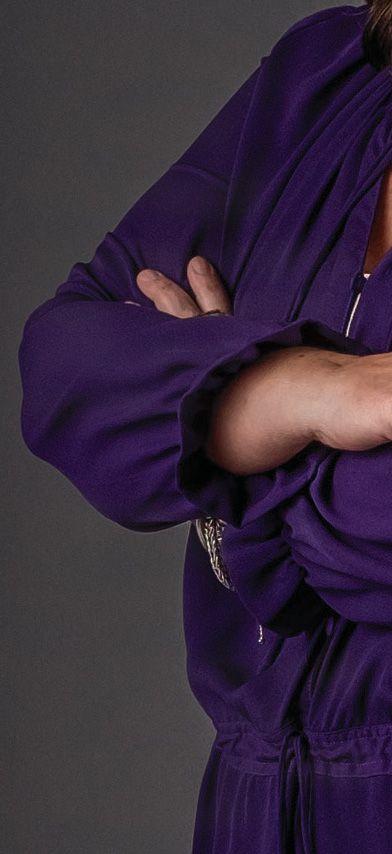




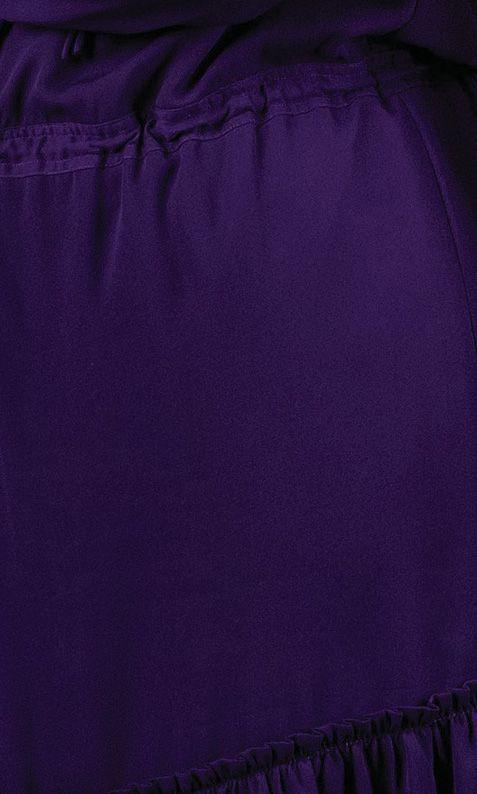

Sorting out what's still useful among your life's lessons






Recovering from a tragic moment for a Fort Worth roofer and her company
Off the Clock
Lance







Sorting out what's still useful among your life's lessons






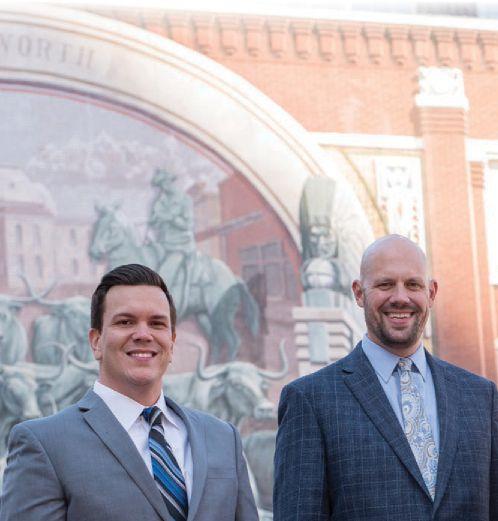
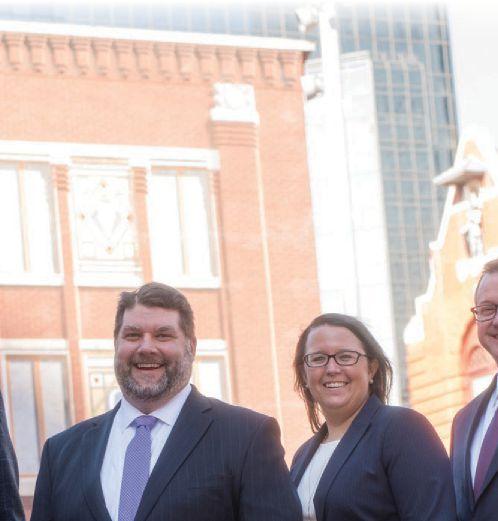
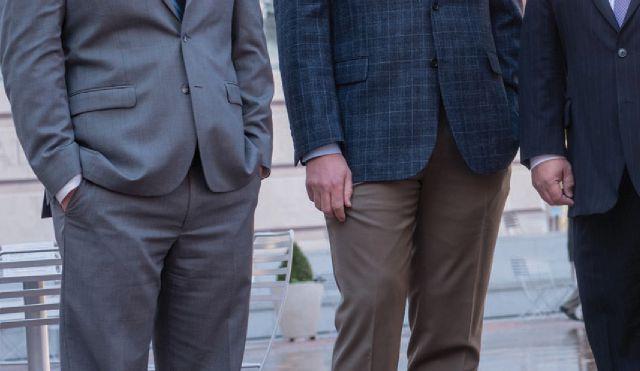
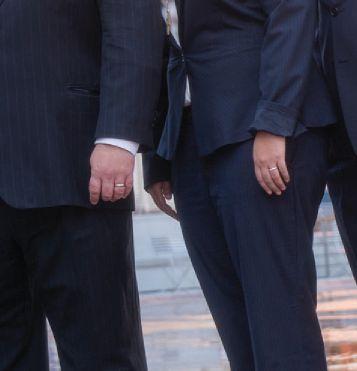
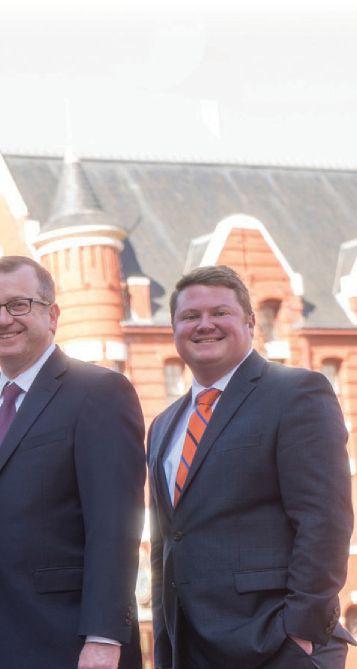
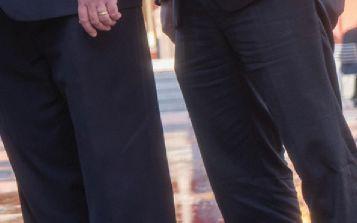
Breadth of knowledge and depth of experience are essential in an ever-changing real estate market. For more than 30 years, our professionals have provided audit, tax, fund administration, and consulting services to real estate developers, lenders, contractors and investors around the country.
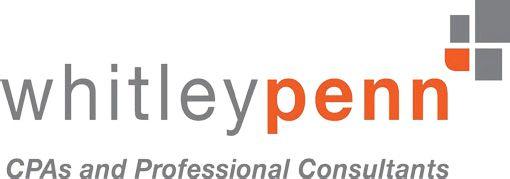
JULY/AUGUST 2018 )
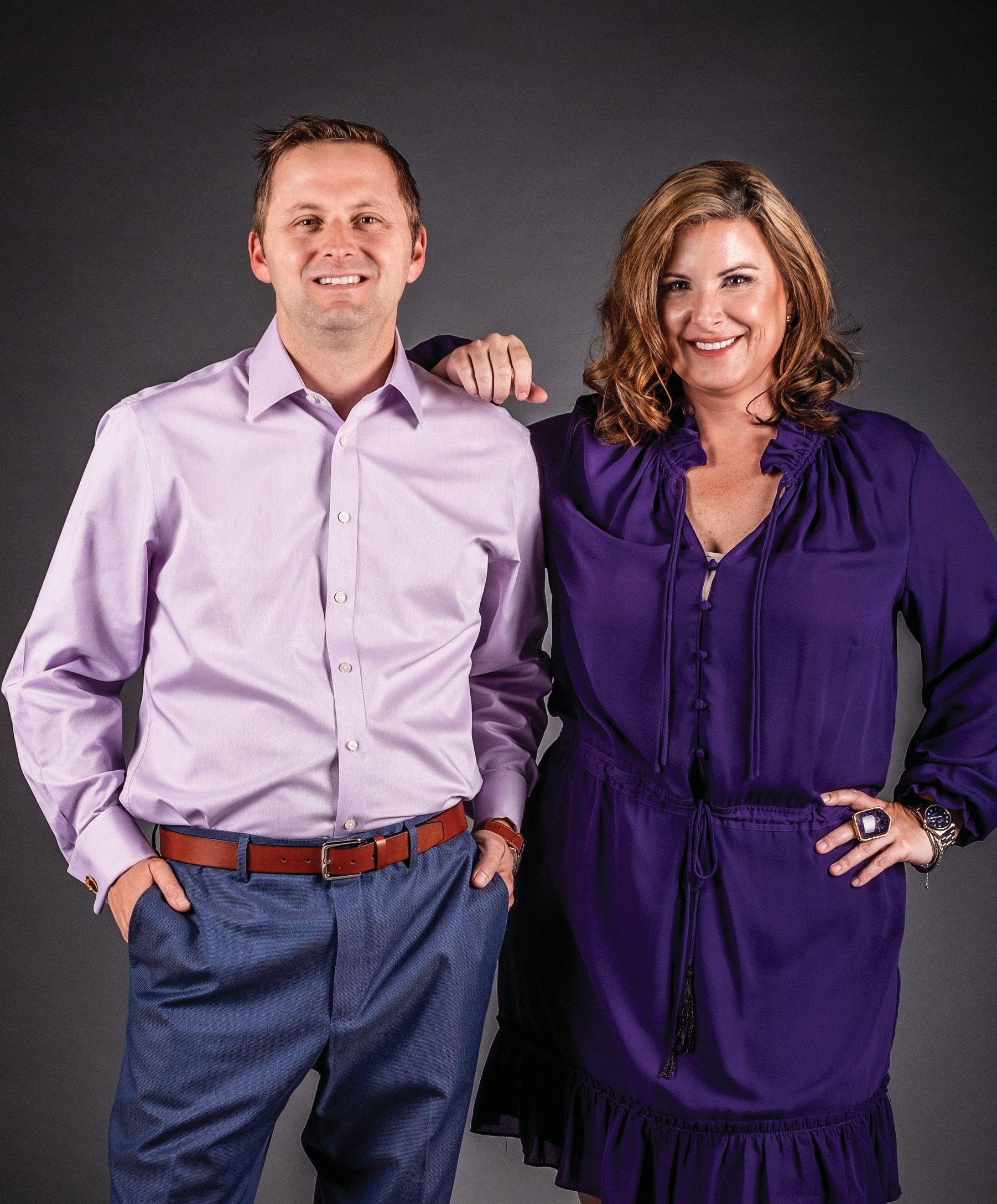

34 Twin Powers: With a dozen retail buildings and a popular wine bar in their portfolio, the great-grandchildren of legendary car dealer Frank Kent — Will Churchill and Corrie Watson — are major players in the Near Southside, so much so that some have dubbed their work as “Kentrification.” But the twins are looking to give back to the community, too, and they have more projects up their sleeve — and, oh yeah, a car business to run.





















9 Bizz Buzz: BREWED takes to the skies, a film-centric project gets set for South Main, and a PR specialist turns a side hobby into a new business venture.
12 Stay Informed: A quick guide to women’s networking groups in the area.
14 Face Time: Life comes full circle for banker Sue Turnage, losing her job, then starting afresh in a familiar place.
16 Around Cowtown: Photos from the 2018 Top Realtors reception and a special tribute to an Entrepreneur of Excellence winner.
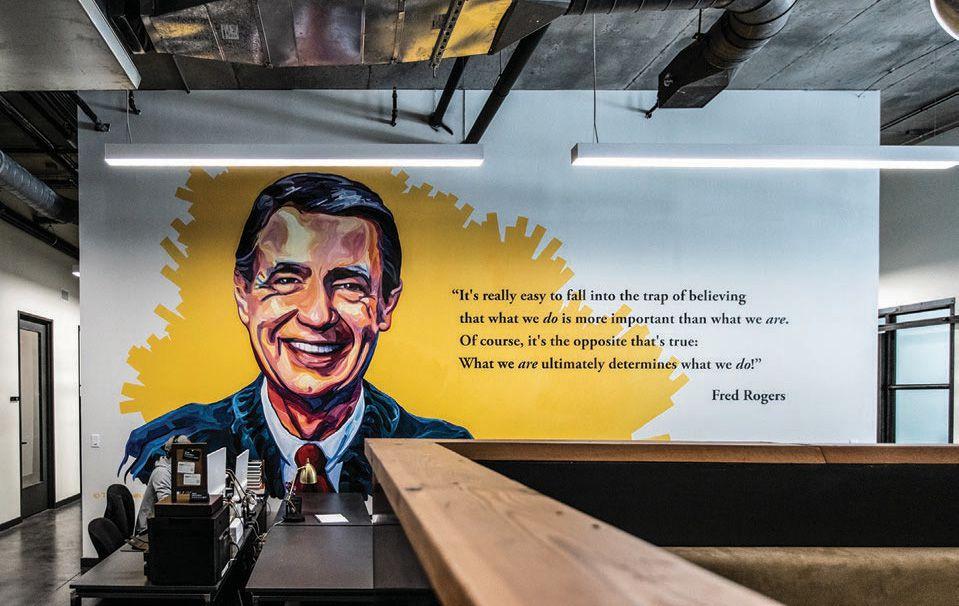

( EXECUTIVE LIFE &
)
19 Distinctive Style: Get the look of Local Barber of Fort Worth owner Johnathon Razo.
48 Business Strategy/Running Toward the Roar: When death and divorce hit one local roofing company, it runs toward the roar — and comes out stronger.


22 Off the Clock: How one local developer turned a dilapidated property into a luxurious ranch resort, ready for corporate retreats — and baseball games.
24 Office Space: It’s a beautiful day in the neighborhood for one Dallasbased coworking company that sets up shop at Crockett Row.
28 Wine & Dine: When it comes to company growth, three Fort Worth eateries seem to have the secret sauce.
30 Gadgets: Three cool gadgets from the TECH Fort Worth Impact Showcase.
32 Health & Fitness: Find your bounce.
( COLUMNS / DEPARTMENTS )
46 EO Spotlight: As Ellerbe Fine Foods approaches its 10th birthday, its co-owner talks new business moves, including the hiring of a familiar sommelier.
50 Analyze This/Energy: And the most prosperous U.S. cities are...
52 Analyze This/Insurance: Small businesses can plan for retirement, even without a 401(k).
54 Analyze This/FW Chamber Report: Four new execs are joining the Fort Worth Chamber. Let’s get to know them.
56 Analyze This/Legal and Tax: The U.S.’s role in oil and gas production is changing.
58 Analyze This/Wealth: How the Tax Cuts and Jobs Act affects you.
60 Business Leadership/ Management Tips and Best Practices: Live an unhindered life.
62 Business Leadership/ Successful Entrepreneurship: What the “Backpack Principle” is, and how it affects our outlook on life.
64 Day in the Life: Why the general manager of Dickies Arena wakes up at 6:07 a.m.

While it all culminates with the day of judging, the lessons learned along the way will last a lifetime. There’s been too little sleep and too much grooming, pre-dawn alarms and late night feedings. But when it’s all said and done, you wouldn’t trade it for anything in the world. At Heritage Land Bank, we congratulate the young men and women of 4-H and FFA. You are the future of our industry and we are committed to your success. #HeritageProud





































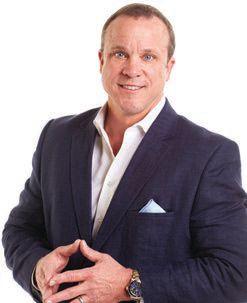
In 2011 and 2012
Chris Powers partnered with Fort WorthMagazine on two of our Dream Homes in River Crest and in River Hills. Six years later Panther City Media Group is extending its affiliation with Powers and his company Fort Capital in the inaugural Fort Worth INC. Dream Office building project. The 22,000-square-foot, three-story building is in the heart of the River District, located at White Settlement Road and Nursery Lane, and is the second of a multibuilding office piece of Powers’ River District plan.
Powers, as CEO of Fort Capital, is one of the key leaders in the revitalization of a big forgotten part of West Fort Worth into the mixed-use River District – residential, retail, restaurant and offices in the White Settlement Road corridor off of the Trinity River. Powers figures West Siders need a place of their own to work and play, and he’s betting he can help make the River District that place.
The Dream Office building, to be completed in early summer 2019, will have the latest in technology and furnishings in the common areas. However, its biggest amenity, Powers says, will be the complementary tenant mix of businesses. The first building, which houses Fort Capital’s offices, has tenants ranging from oil and gas to finance, law, and construction. Tenants work together on deals, and that camaraderie has boosted motivation, connections, and deal flow, Powers says. “The big amenity is the tenant base,” he told us. “We can put together a roster of tenants that are better for being close to each other than they would being scattered across the city.”
The Dream Office building’s first floor will be retail, potentially with a cof-
fee shop and spa. The second floor, will feature suites ranging in size between 250 and 750 square feet, with common conference room, coffee bar and restrooms. The third floor will be traditional office with suites. In total, Powers said the building will likely have 14 executive suites. The fourth-floor rooftop will have a furnished outdoor, shaded and covered deck with views of the nearby Trinity River and downtown.
The River District continues to grow up around the site. The 323-unit Elan apartment building was recently completed across the street, 120 single-family homes have been built and 80 townhomes are under development in the district.
Need some exercise after work? Longtime master personal trainer Abundio Munoz opened his 4,000 square-foot community inspired boutique fitness studio, Abundio’s Fit Society, in the River District last year.
Restaurant and other service options are also cropping up. Salsa Limón opened in the district a year ago, as did Lettuce Cook Gourmet-on-the-Go, a combo deli and catering outfit, created by Fort Worth native chef Todd Brown. And, our cover story duo Will Churchill and Corrie Watson, along with partners Emma and Travis Heim, are scheduled to open their second Heim Barbecue location in the district this fall.
Bottom line: There’ll be plenty of options for people who want to live, work and play in the River District. We’re pleased to welcome Chris Powers back into our magazine group fold.

Hal A. Brown owner/publisher



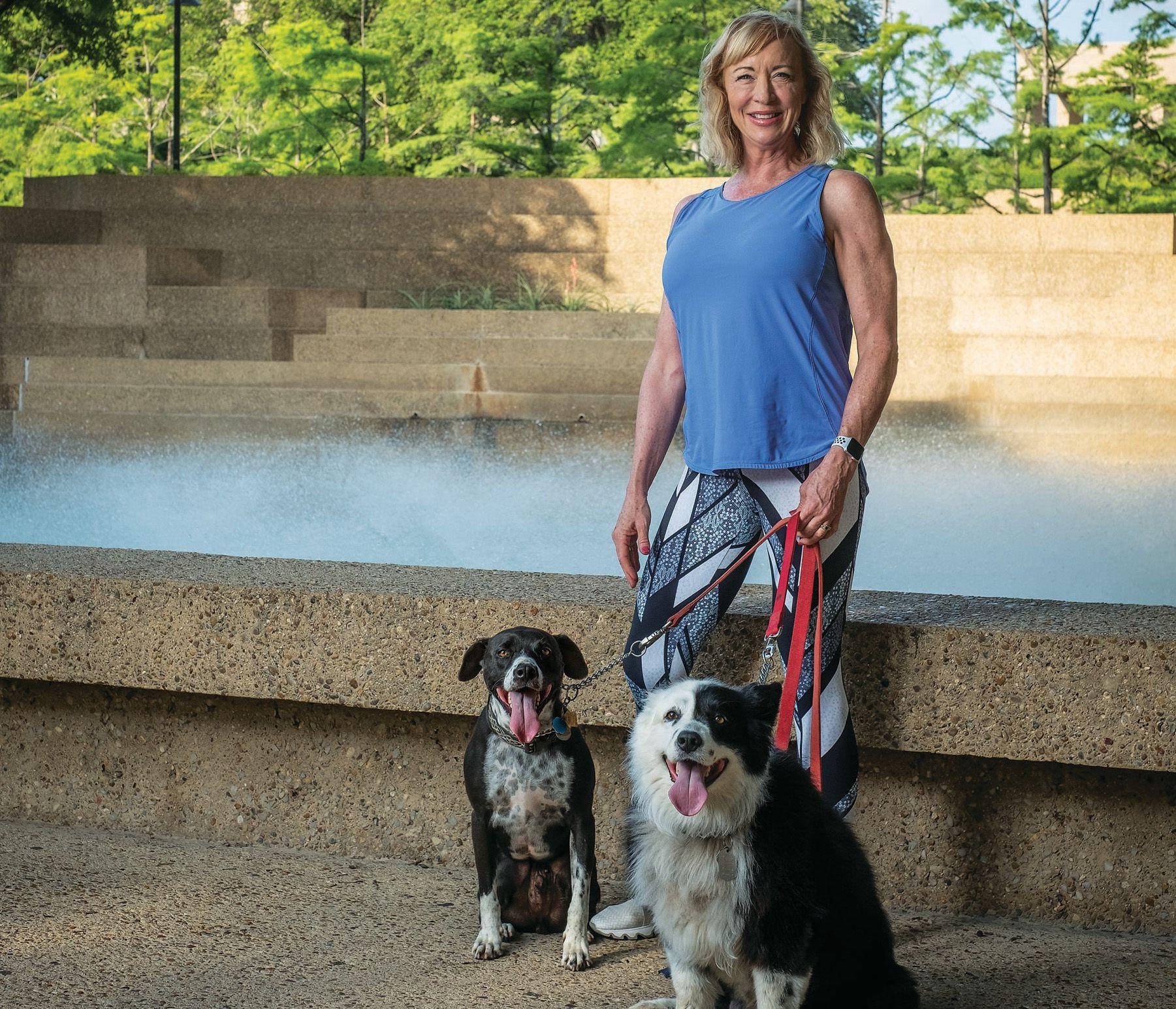













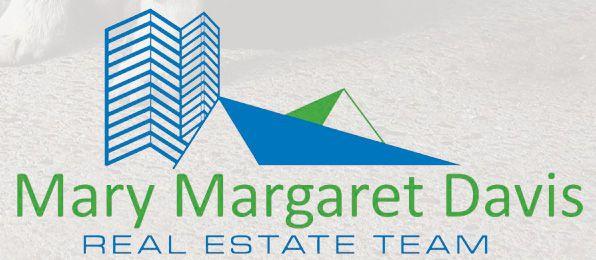


BY ERIN PINKHAM AND BRANDI ADDISON
One of Fort Worth’s favorite places for all things brewed — that’s coffee and beer — will open a DFW Airport location later this year.
BREWED will have a 2,300-square-foot, full-service restaurant near Gate 25 in Terminal D, serving coffee, beer and comfort food. The BREWED in DFW Airport will also have a grab-and-go kiosk and a coffee to-go bar, and the location will carry some local products, such as Holy Kombucha. Hojeij Branded Foods will serve as airport operations partner for BREWED’s airport location.
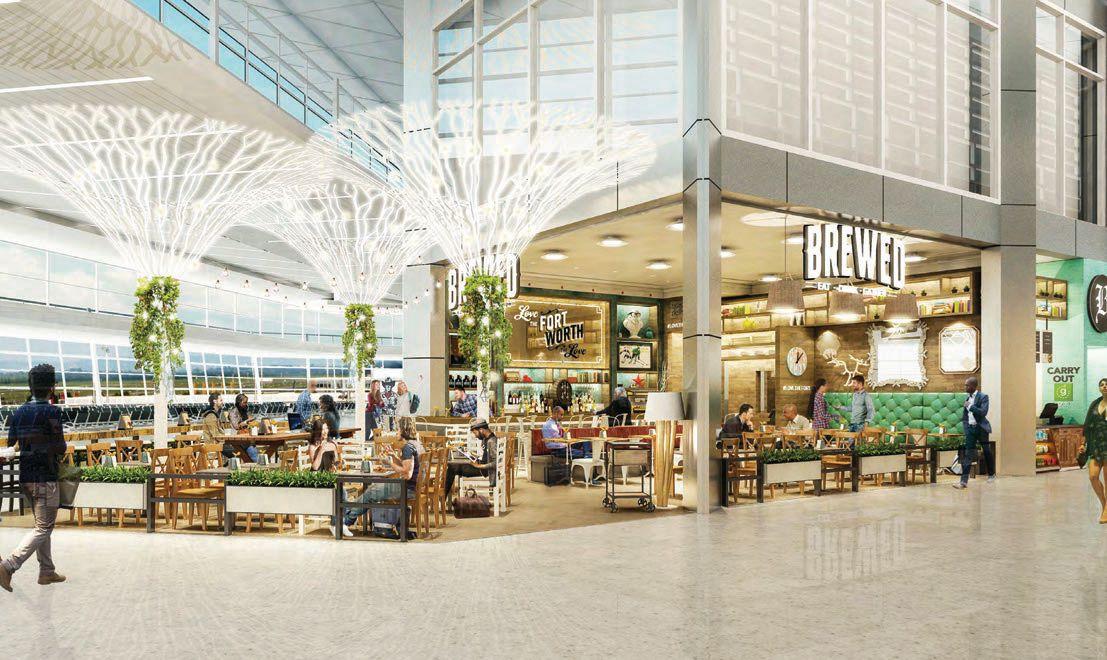
After two and a half years of discussion, a couple bids to the airport concessioner and a fierce competition, co-owner Joey Turner said he’s thrilled to have won the spot in the airport, and even more so, in Terminal D — one of the most coveted spots there.
“The key part is, it really fits in our vision about serving people, blessing the city, and the last part of impacting the world,” Turner said. “It’s the international section of the airport, so we get to touch people from all over the globe, and that’s appealing to us.”
One piece of the Fort Worth location that will carry over to the airport is the “Love the Fort, Worth the Love” mural — a popular photo spot at BREWED’s original Magnolia Avenue location.
“[The mural] was really created to be something for all of Fort Worth,” Turner said. “So, people from all over the world, coming off the plane and instantly seeing our mural that presents Fort Worth in kind of a quirky, cowboy flair is perfect for what we wanted in the airport.”
Beyond showing off the city of Fort Worth, Turner said BREWED’s biggest mission of all is being able to create a comfort-
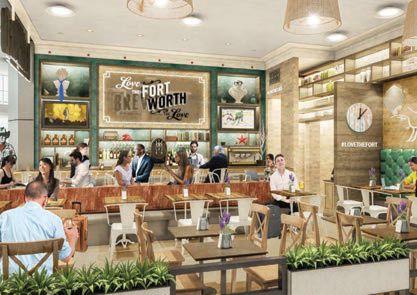
able place for travelers that represents its tagline: “The locals’ living room.”
“At the airport, it’s so busy and crazy, and sometimes your flight is cancelled — or pushed back — and you just need to find a place to hang out,” Turner said. “And if there’s a place that feels like an extension of your home, what a great opportunity it is for us to add value to people in the airport.”
Turner said the design phase for the airport location will begin mid-July, and it will take roughly 120 days for construction to be completed. BREWED is hoping for a December opening date and will stay in the airport for the next 10 years, per the leasing agreement.
BREWED, whose ownership includes Turner and Jamey Ice of Fort Worth band Green River Ordinance, originally opened on West Magnolia Avenue in 2012. A version of this story originally appeared on FWTX.com.
BY SHEILA ELLIS

L EADING PUBLIC RELATIONS SPECIALIST JULIE HATCH FAIRLEY IS VENTURING INTO RETAIL WITH JUJU KNITS, A COMMUNITY KNITTING STORE SET TO OPEN THIS FALL AT 2638 LIPSCOMB ST.
The approximately 2,000-square-foot store, located in an old home in the Near Southside, will feature knitting and crochet supplies, classes and events, and a community table where people can come to work on projects. Fairley also hopes to host roving classes where people can learn how to spin their own yarn.
Many events and individuals in Fairley’s life inspired JuJu Knits, beginning with her grandmother who introduced her to knitting when she was 8 years old. She also credits longtime friend Javan McIlroy for introducing her to the Southside and Old Home Supply owner Ralph Watterson — who also owns the house where JuJu Knits will be located — for helping her secure the location.
For Fairley, yarn work can be a personal, therapeutic experience. Fairley attests to the meaning it can embody, sharing the story of her favorite project: a simple blanket she made during the later stages of McIlroy’s battle with AIDS.
“I have a blanket that I started knitting when I found out that he was really sick and wasn’t going to make it,” Fairley said. “I stitched that in the car on the way to go meet him for my last visit with him, and then stitched it through his illness.”
Fairley established a name for herself after the tornado of 2000 when she handled public relations for the reopening of Reata. Her clients over the years have included YMCA of Metropolitan Fort Worth, Cancer Care Services, and Communities In Schools of Greater Tarrant County.
She still plans to continue working in PR while managing her store. JuJu Knits has been Fairley’s dream for years. Now that she gets to realize it, she says she hopes to share the joy and benefits of fiber arts with the Metroplex.
“Knitting and crocheting and weaving — all of those are things that you could do while talking to other people and visiting with other people,” Fairley said. “It truly does build a little community of people who want to help each other create.”
Tenants are lining up for the newest development on South Main Street.
BY SAMANTHA CALIMBAHIN
CRAIG KELLY WOULD HAVE BEEN THE DEVELOPER BEHIND THE 411 SOUTH MAIN BUILDING (NOW EVENT VENUE THE 4 ELEVEN), but the president of Fort Worthbased commercial real estate company Kelly Capital Partners — calling himself “old school” — wanted more parking.
So, he sold 411 South Main and instead set his sights next door at the corner of South Main Street and Broadway Avenue. The project’s name — MAIN+BROAD.
MAIN+BROAD, four buildings spanning 44,000 square feet, will feature restaurant, retail and office space. It already has an anchor tenant, film company Red Productions, which will be moving from its previous location at the Foch Street Warehouses.
With Red Productions as the anchor, the building will also have a 4,500-squarefoot studio, Backlot Studios, complete with a green screen that will be available to local filmmakers. Outside the studio, the plan is to build a public plaza with a movie screen for showing films — a natural fit for Kelly, whose son, Ryan, happens to be a film student at the University of Texas.
“The combination of my love for films and my son, Ryan, attending University of Texas Film School, is what attracted me to the film industry,” Kelly wrote in an email to Fort Worth INC. “I believed the
studio would be a great fit for MAIN+BROAD, and once Red Productions came on board as a tenant, the studio became a reality.”
Other tenants who have signed on include Gypsy Scoops, the popular Race Street ice cream shop that will open its second location, and Coco Shrimp, a Hawaiian food truck that will be opening its first brick-and-mortar at MAIN+BROAD. Kelly says another major restaurant has also signed on but is not yet ready to announce.
The buildings of MAIN+BROAD were originally built in the 1900s and sustained damage from the Great South Side Fire of 1909 (the space today still has petrified wood from the fire). Rather than tearing the building down, Kelly decided to save it, hiring 97w as architect and RJ Miller as contractor. Stablemade is serving as the development’s leasing agent, while Southwest Bank financed the project.
Kelly says he expects renovations to be complete by the end of the year and tenants to begin occupying the building by the end of the year as well.
And, to Kelly’s delight, it comes with parking — 57 spaces to be exact.
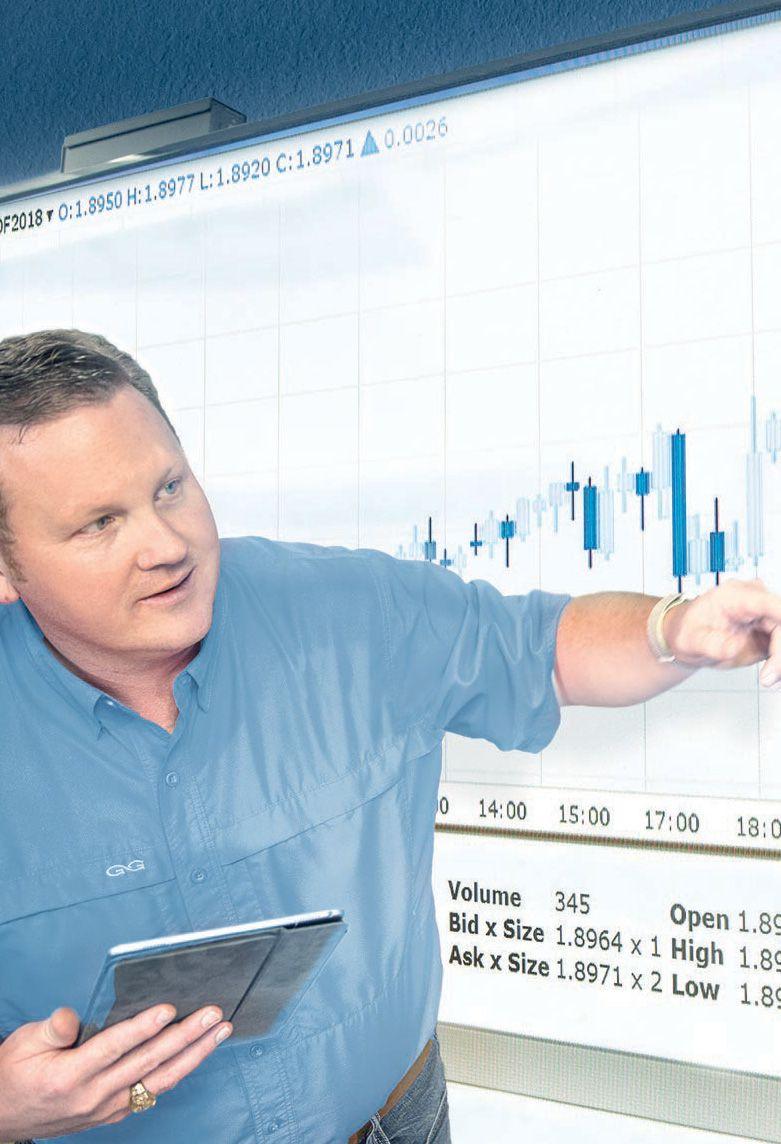
Landers Vice President
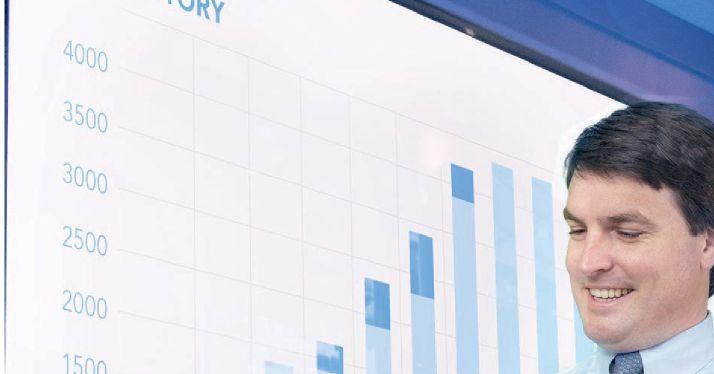















Fuel Masters owner Jamie knows a true competitive advantage when he sees it. His company is an industry leader whose proprietary software gives his customers access to the most affordable fuel pricing with quick
Start relationship banking at Origin.bank/relationships
For professional women in the area looking to expand their network, here are a few places to start.
BY BRANDI ADDISON AND SAMANTHA CALIMBAHIN
Fort Worth has numerous networking groups for professional women. Here’s a quick guide to a few of them.
One of Fort Worth’s newest networking groups, SheBelongs Fort Worth began as a “thought” that quickly turned into 800 Instagram followers within a month and, eventually, a women’s group that meets regularly over brunch or a designated activity, says Joanna Truong, an Arizona transplant who started the group simply to connect with other women in the area.
SheBelongs launched its first event at Ephemera Terrariums in May with 30 women — an event that sold out within two weeks. On July 14, the group plans a community ride at ZYN22 on West Seventh Street. instagram.com/shebelongsfortworth, facebook.com/groups/ shebelongsfortworth
Ladies on the Lamb was founded in 2001 by a group of businesswomen who wanted to aid youth who show lambs at the Fort Worth Stock Show. Since the organization
was founded, it has raised over $1 million for young people who dedicate time, energy and money into livestock shows. facebook.com/ladiesonthelamb
Founded in 1926, the Junior Woman’s Club of Fort Worth encourages women between the ages of 21-39 to become involved in various art and cultural disciplines. No clue what your passion is? This group will help you discover it. As a branch of the Woman’s Club of Fort Worth, one of the city’s oldest clubs, members explore areas such as culinary and liberal arts, cinema and drama, and fitness and wellness — while creating friendships with women who have similar interests. jwcfw.com
Celebrating its 40th anniversary this year, the Network for Enterprising Women focuses on executive, professional and entrepreneurial issues. The group meets for breakfast every Friday at 7:30 a.m. at Bread Winners Cafe and Bakery
in University Park Village. networkforenterprisingwomen.com
What Women Want was founded in 2011 and has flourished across the nation ever since. Formerly known as “Over 40 Females,” What Women Want focuses on women over 40 and hosts events in which members can learn leadership skills and business strategies, as well as network. whatwomenwantnetworking.com
Through podcasts, blogs and TV, in addition to hosting networking lunches or conferences monthly, Plaid for Women discusses topics from career and money to home and family. The group’s motto — #NoMeanGirls. plaidforwomen.com
As the second largest sponsor of the Fort Worth Stock Show and Rodeo and the Junior Sale of Champions, Women Steering Business supports young women who show steers at the Stock Show’s livestock sale. The group hosts three to four networking events throughout the year. womensteeringbusiness.org
The Junior League is all about volunteerism, hosting several fundraisers and community projects throughout the year and supporting organizations like Camp Fire First Texas, Presbyterian Night Shelter and Rivertree Academy. The group’s key focuses include education, the arts, social services, health and job training. juniorleaguefw.org





























At Gus Bates Insurance, our clients rely on us to help guide them through the complex world of insurance and investments. But t before





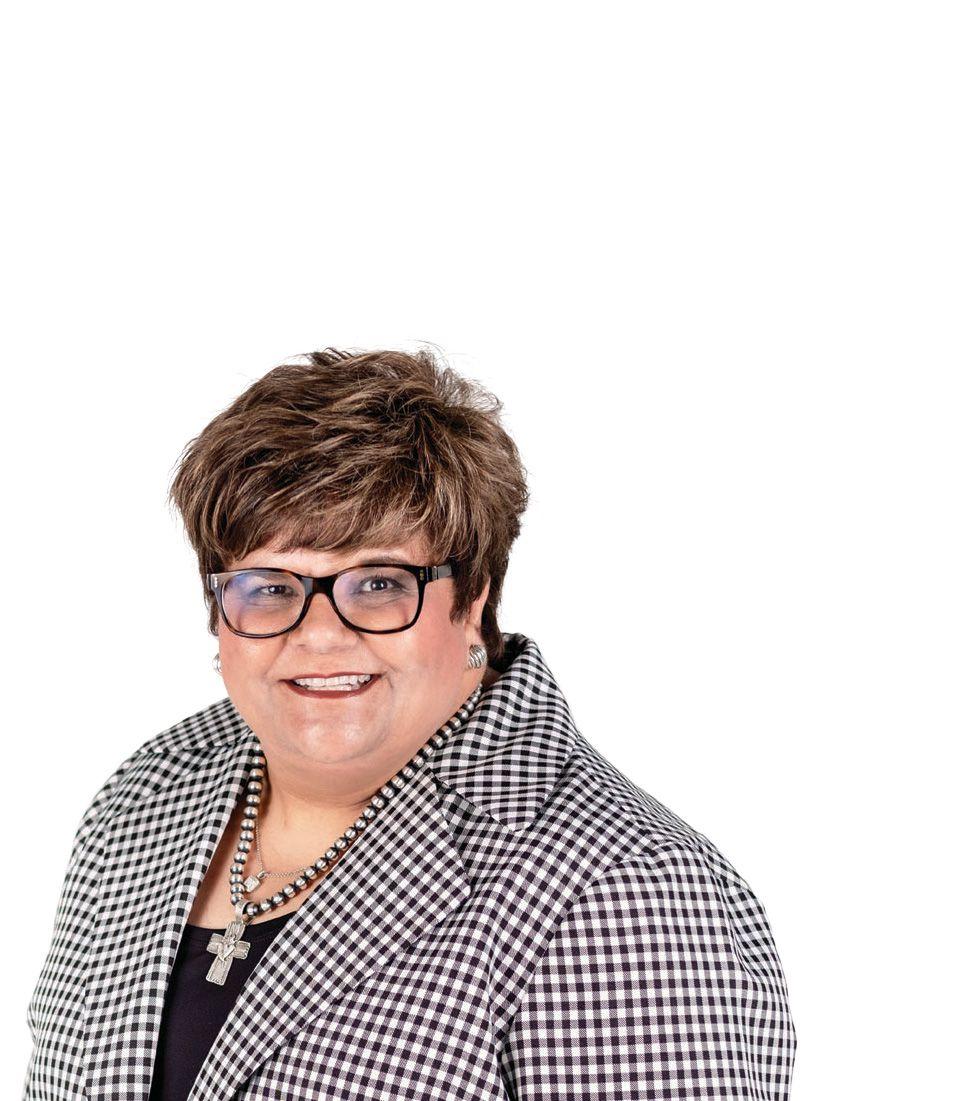
Banker Sue Turnage, unexpectedly cast into the job market months ago, lands quickly, running the new Fort Worth office of Argent Trust. And she regains her old office.
BY SCOTT NISHIMURA
Sue Turnage has come back to where she began – literally. Turnage grew the Frost Bank and Frost Wealth Advisers Fort Worth office to $7 billion in total assets over 20 years before losing her job several months ago when the bank cut its executive vice presidents.
Turnage landed quickly at the Argent Trust wealth group in March, assigned to open the firm’s Fort Worth office, in the same South Hulen Street building as Turnage’s old Frost offices.
With Frost having moved out of the building, Argent has taken over the old space, and Turnage in July is moving back into her old ground-floor office, where customers can easily find her, which is how she likes things. “My customers come in to say hello, have a cup of coffee,” she says. “That is old school.”
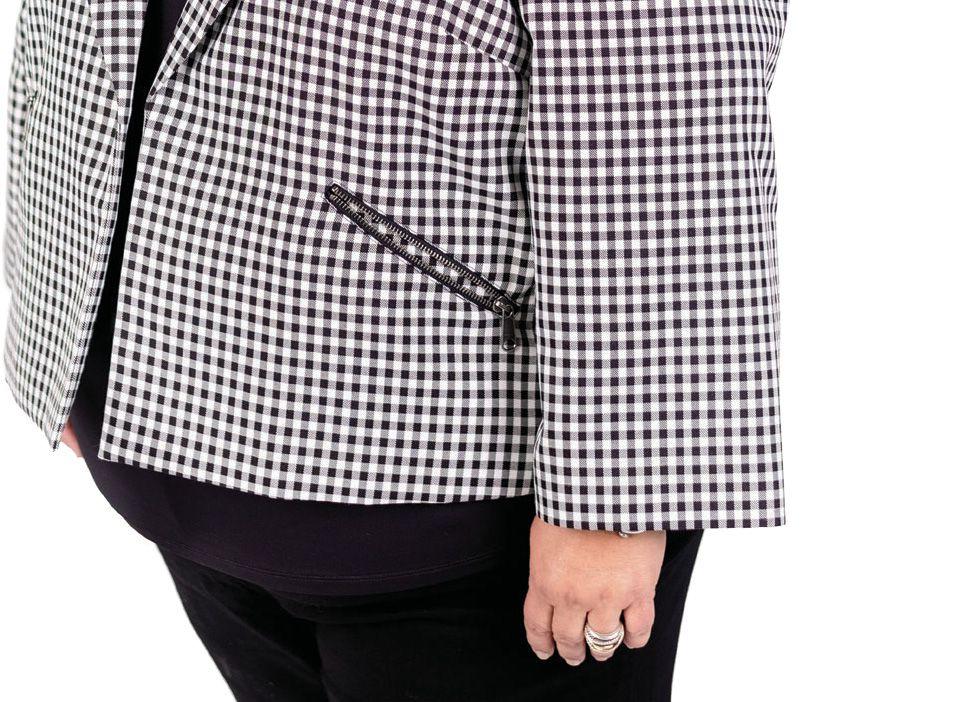
She says she’s not pursuing her old clients. “I have not approached my old customers,” she says. “I do not have a noncompete. I have not made a list of my old customers. But some of them have found me.”
Argent figures to funnel prospects to Turnage through its informal relationship with Origin Bank. The CEOs of both companies – Argent’s Kyle McDonald and Origin’s Drake Mills – are old college friends
from Louisiana Tech.
“They’re both big Bulldogs,” Turnage, who graduated from the University of North Texas, says. “I’ve had to learn all this vernacular.” Origin doesn’t have its own trust or wealth management group, but instead works through alliances with other firms. It’s not had such a relationship in Fort Worth until Turnage opened the Argent office.
Turnage, 58, who has more than 35 years in banking, was unexpectedly cast into the job market by Frost’s decision. “It was a total surprise,” she says. “It was the best year we ever had.”
Turnage says she spent a short time having a “pity party, which lasted two weeks. Then I started getting calls.” She was at Frost for so long, she says, “nobody calls you anymore. You’re so loyal, you won’t move.”
Connected to McDonald, she drove to East Texas to meet him. “After five minutes, I thought I knew him my whole life,” she says.
Argent provides full services for individuals, businesses and institutions. It’s 50 percent owned by employees. Early this summer, it won a 2018 Stevie Bronze in the American Business Awards Company of the Year financial services category. New job in hand, Turnage says she took some time off. “I had to go to Rangers training camp before I would start,” says Turnage.
Argent took her direction on where to set up camp in Fort Worth. Turnage says she’ll run Argent’s service with the same “high-touch” feel she did at Frost. “Whatever one of my clients needs in their financial management, Argent has it,” she says. “Or if they don’t have it, they get it done.”
Net worth of her individual clients typically ranges between $500,000 and $1 million. “But I have worked for people who had much less. They just had a need.” Working with multi-generational families, like other advisors, she takes on younger family members with lower net worths. “If we’re working with an extended family, we want to take care of them.”
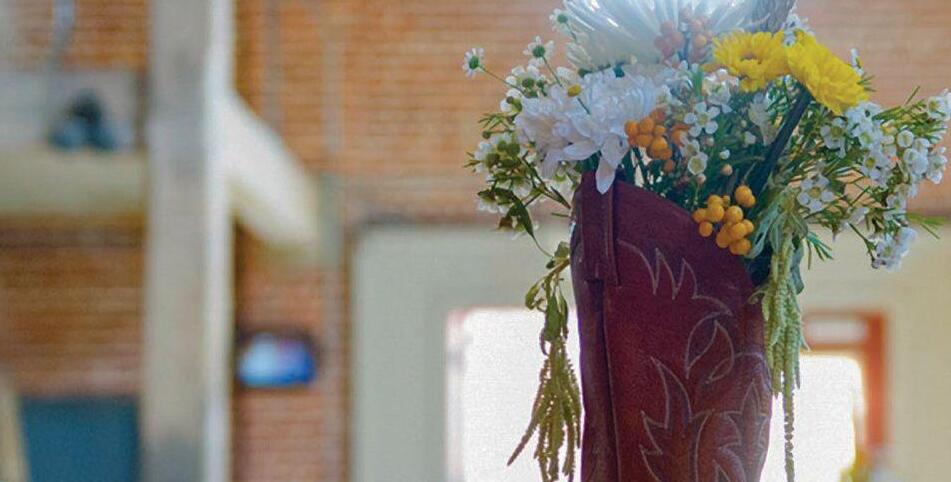





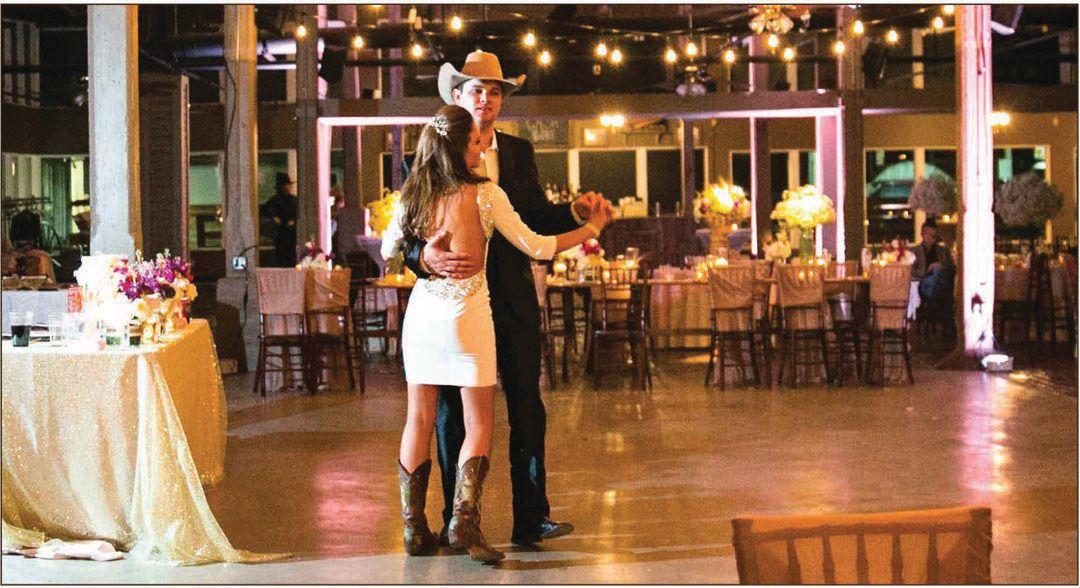

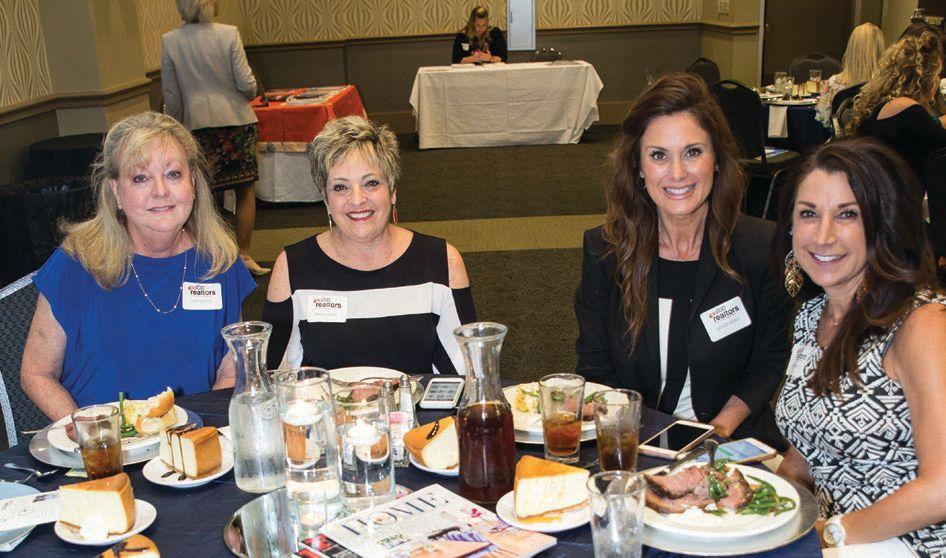
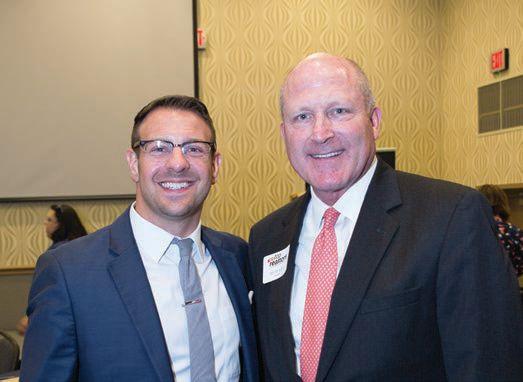
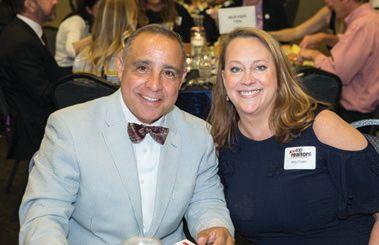
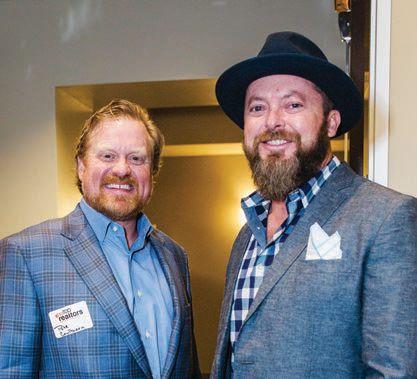
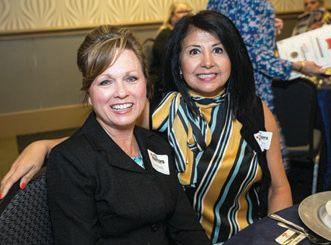
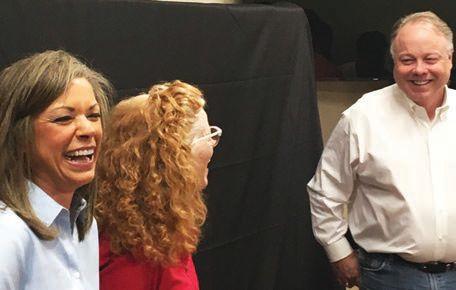
Fort Worth Magazine's Top Realtors
Fort Worth Magazine celebrated its 2018 Top Realtors at a lunch reception May 10 at Norris Conference Centers.
1. Lela Nichols, Barbara Walls, Jennifer Brown, Nancy Givins
2. Nick Bendain, Martin Noto
3. Pete Coulborn, Sean Russell
4. Andy Bearden, Rueben Rojas
5. Duke & Amy Chairez
6. Dana Cassidy, Anna Escamilla
7. April & Rick Wegman
8. Kristi Roy, Kim Gonzales
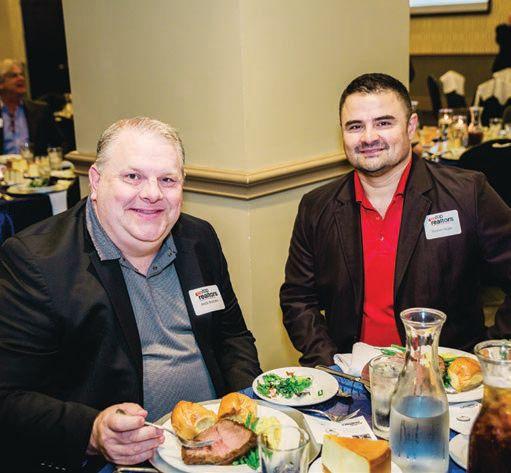
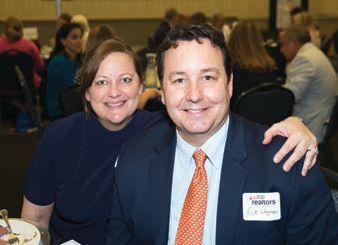
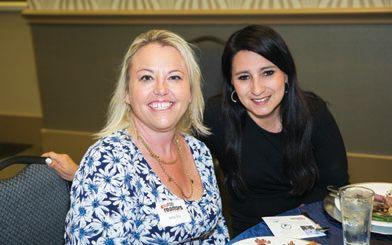


Transaction Parameters
• Financing of equipment cost and related tenant improvements
• Loans, leases and lines of credit
• Step-up monthly payment structures
• Financing for Electronic Medical Record
• Transaction amounts up to $20MM
• Real estate loan terms up to 20 years
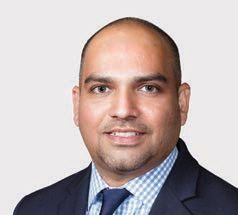
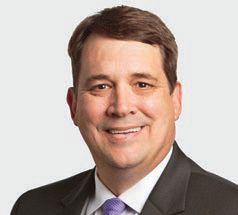
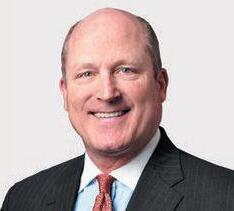

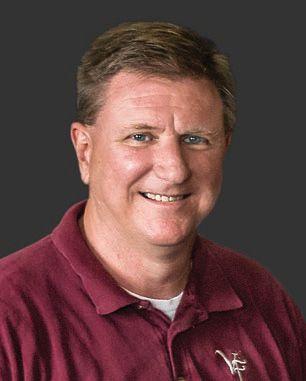
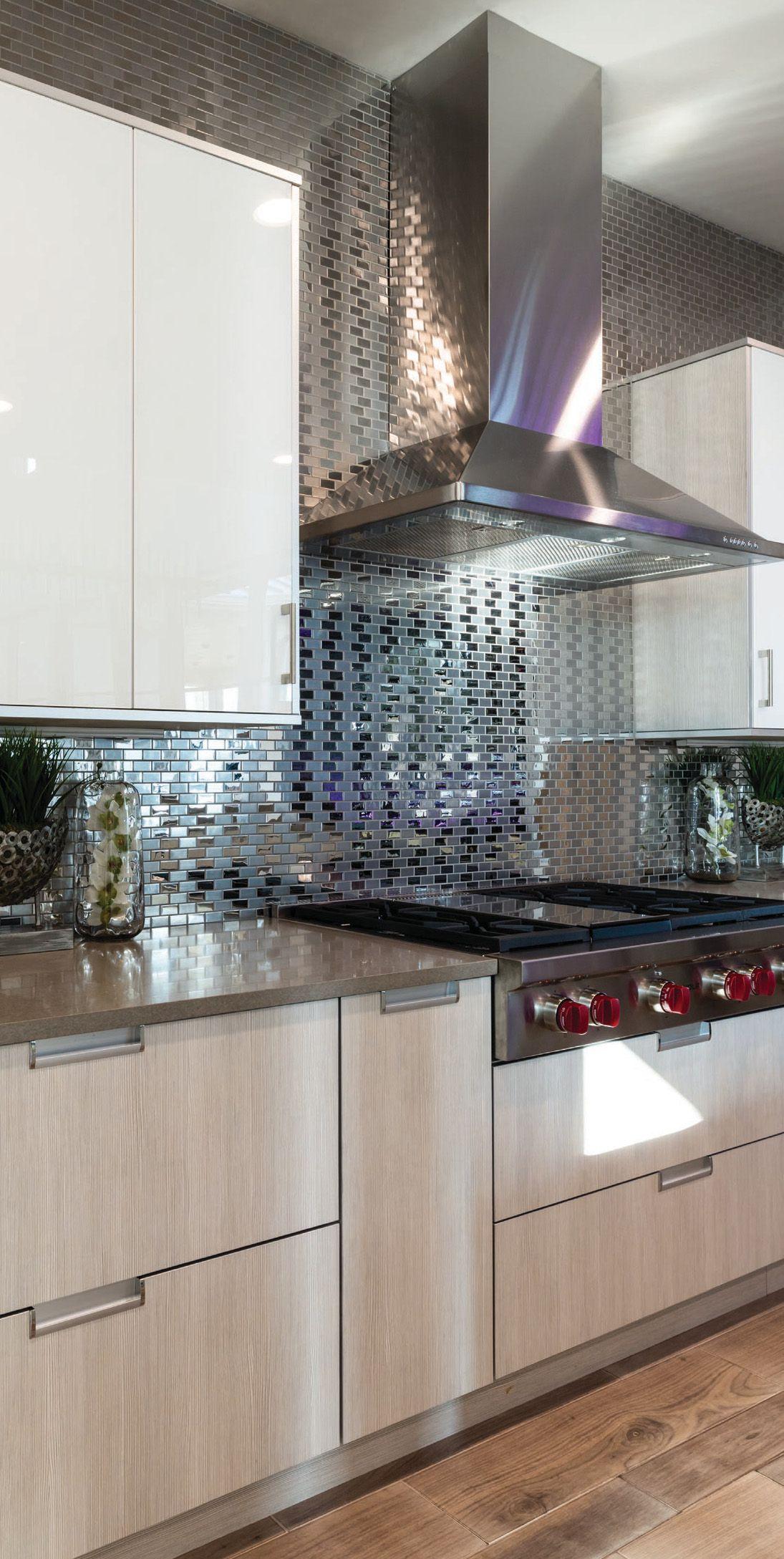


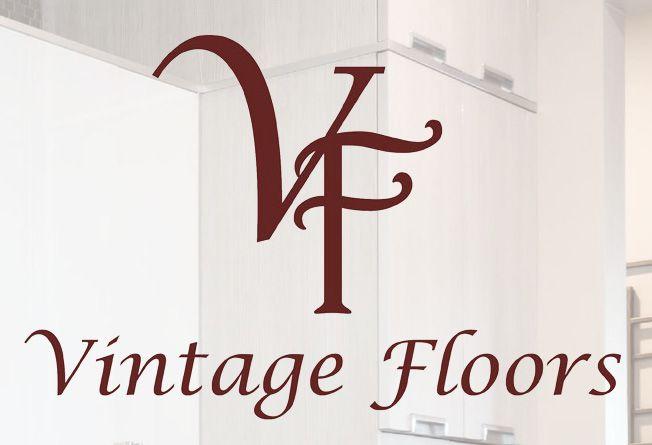














Hair and beard tips from Local Barber of Fort Worth owner Johnathon Razo.

BY SAMANTHA CALIMBAHIN
It was like it was “destined to happen,” Johnathon Razo says of his barbershop, Local Barber of Fort Worth.
His grandfather once had a barbershop downtown in the Sundance Courtyard. He opened that shop in 1987 — the year Razo was born. Years later, Razo would have his own dream to open a barbershop by the time he turned 30. He turned 30 last October, and two months later, the Local Barber pop-up opened in Sundance Square before moving to its permanent spot in Sundance Courtyard in January — right next door to where his grandfather’s original shop used to be.
The shop caught on pretty quickly. In the June issue of Fort Worth Magazine, readers named Local Barber the Best Men’s Barbershop in the city. And Razo’s just enjoying the ride.
“We have a great spot here. It’s a great job too,” he says. “I wouldn’t pick any other job in the world but this.”
Prospectors Coal Mine Pomade. For hair, Razo uses a matte clay pomade from California-based company Prospectors, which he says “smells like a fresh-peeled orange.” When it comes to summer hair, he recommends going for a “dry” look: “You shouldn’t use a wetlooking product because in the summertime, it looks too shiny, and you already get sweaty, so you want to make sure your hair is looking natural. That’s what’s in right now — a drier, matte look.”
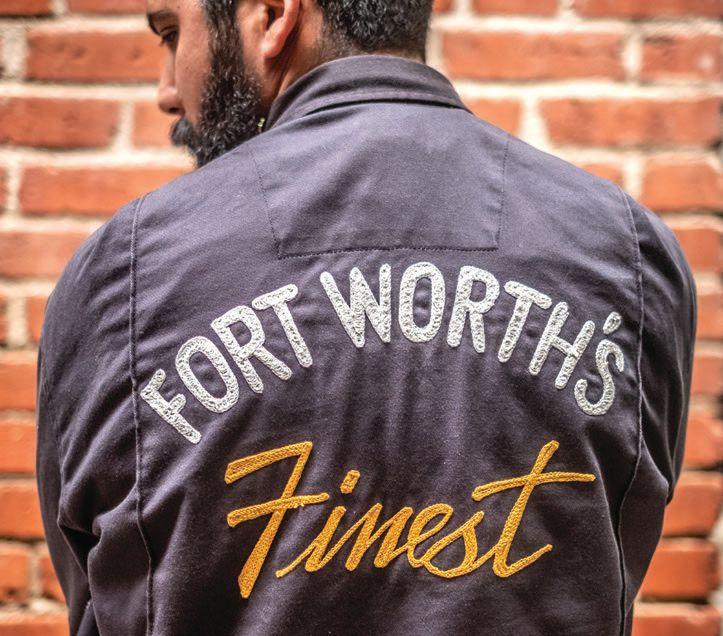

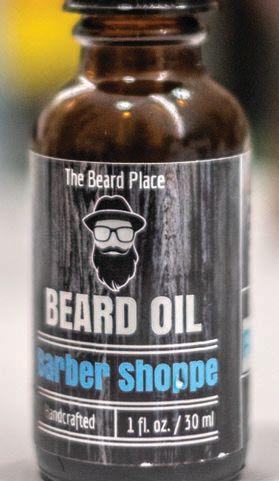

The Beard Place Beard Oil: Barber Shoppe. For the beard, Razo uses beard oil from The Beard Place out of Grand Prairie. “It’s different because it’s not the traditional beard oil — everybody’s doing these woodsy smells — [The Beard Place] is more of a cologne base. I’m not really a cologne guy, so whenever I get a product that smells good, you kill two birds with one stone.”
18.21 Man Made Wash. A shampoo, conditioner and body wash all in one.
Don’t spend more than 10 minutes on your hair.
“People are busy these days, and they shouldn’t have to spend more than that,” Razo says.
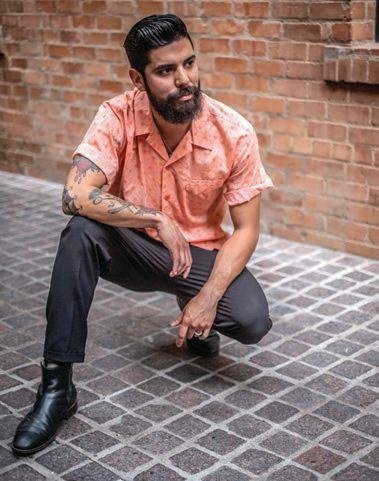
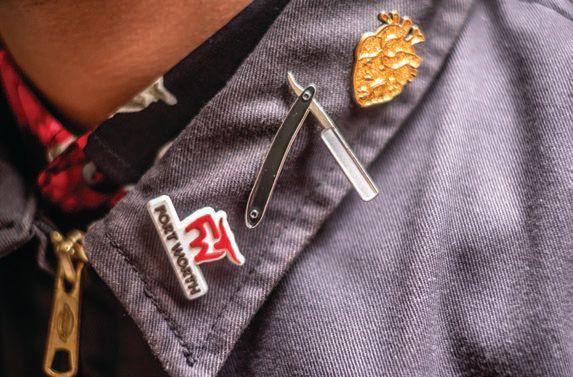
Have your barber show you how to achieve the same look at home. Razo says his barbers work clients through blow-drying, combing and styling techniques before they leave the shop.
Ditch the comb. “If you want to have a wave or texture to your hair, I wouldn’t use a comb at all; just use your hands. Bunch your hair up and blow dry it.”
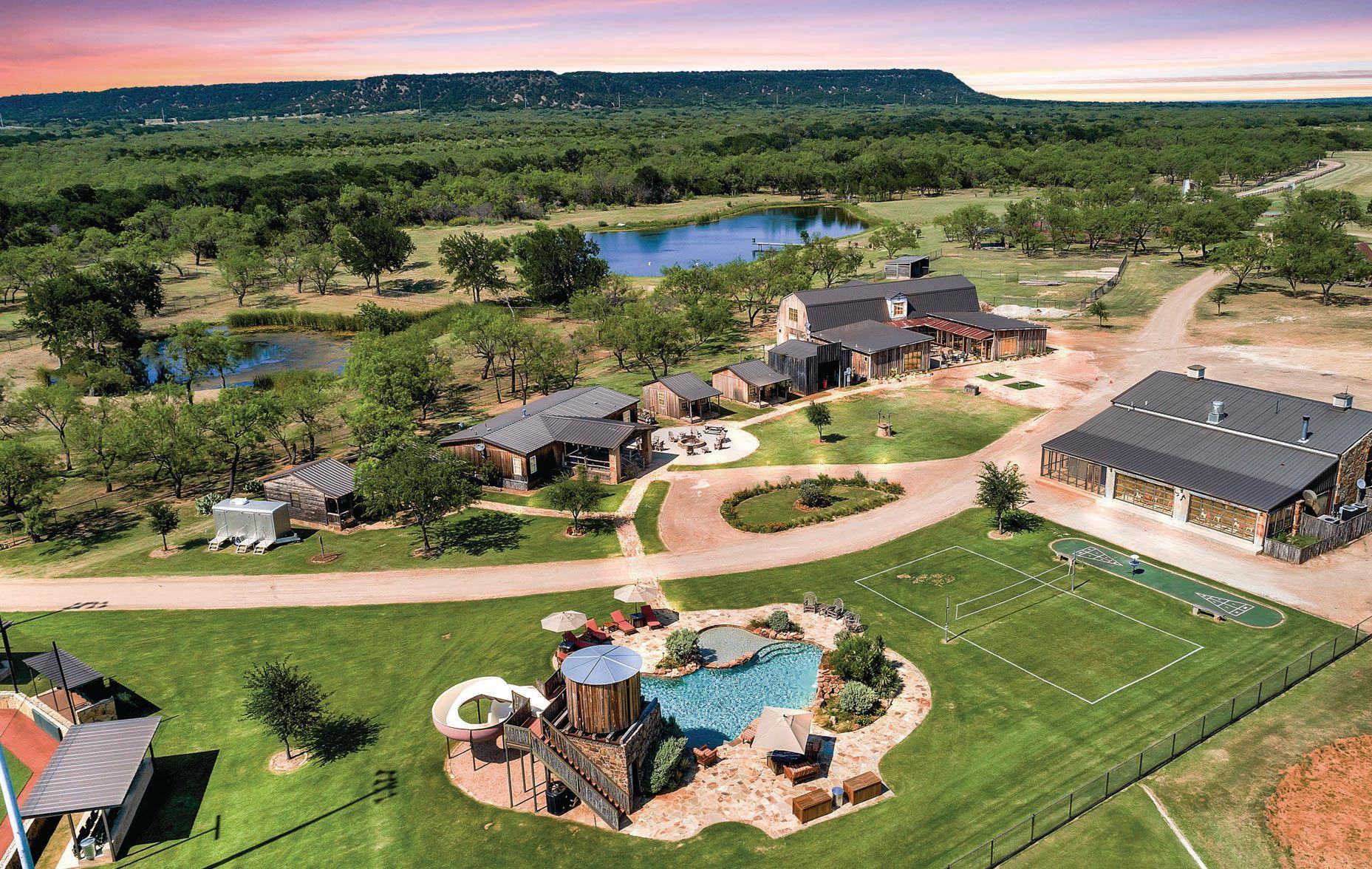
With luxurious lodges and picturesque country views, this Texas ranch is not just a destination for corporate retreats — it’s an entrepreneurial venture, spearheaded by a developer from Fort Worth.
BY SAMANTHA CALIMBAHIN
Rocker B Ranch started as a “family escape” for president and CEO
Lance Byrd, his wife and their son and daughter.
Byrd, who’s known in Fort Worth for playing a key role in the development of Mopac Event Center, purchased the property in 2005 as a place to dove hunt and ride four-wheelers while enjoying the sweeping views of Palo Pinto County. The ranch has since evolved to become
a 320-acre luxury resort, featuring rusticchic accommodations, meeting space equipped with audio/visual capabilities, and an array of sports facilities including two Little League regulation-size baseball fields. It’s located in Graford, Texas, about an hour drive from Fort Worth.
The ranch has come a long way from the dilapidated two-room house and barn it once was. When Byrd purchased the property, he tore down the house and kept the barn as he ventured into the cutting
horse business. At one point, Byrd says he had 40 horses on the ranch, including a pony named Cowboy that his daughter received for Christmas when she was 6. But, as his grandfather warned him, “the horse business is a tough business ... it’s a lot of work,” so Byrd did away with the horses, keeping Cowboy and one other.
Byrd then shifted the ranch’s focus from cutting horses to sports and hospitality, hand-sketching the architecture and construction plans for Rocker B Ranch.
“Usually, my wife tried to talk me out of it, but I’m hardheaded and pressed on!” he says.
Today, Rocker B Ranch offers a variety of accommodations, from bunk rooms to free-standing cabins. Interiors — designed by family friend Ro Rynd, whose company Ro Rynd Interiors currently
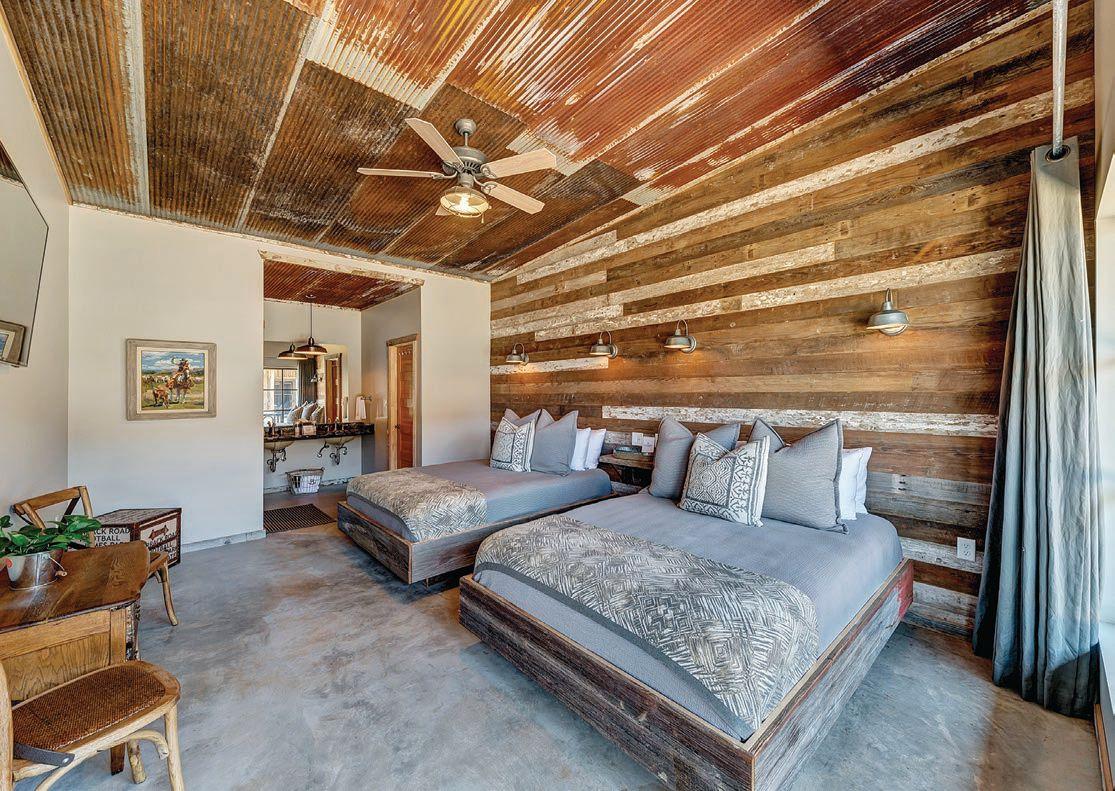
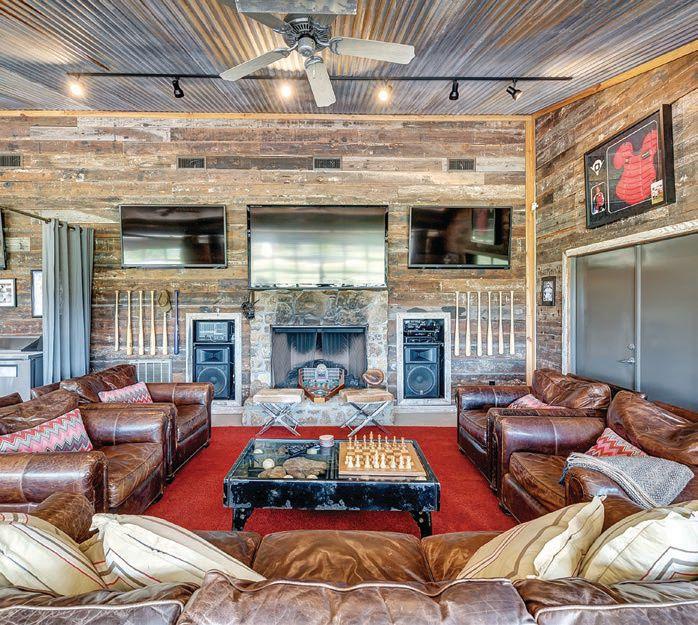
offices at the LOCAL Design Studios + Gallery at West Vickery Boulevard — are rustic yet modern: Think cowhide rugs and wood furniture. Guests also have access to a fitness center with an indoor hot tub, massage room and changing area.
Visitors book the ranch exclusively; rates range from $5,000 per night on weekdays to $12,500 on weekends for a two-night stay, and while this does not include taxes and food, it does include use of all facilities and activities.
For work, the 3,000-square-foot, multi-use facility is ideal for corporate meetings. The room is dubbed Dalton City Diner, named after an oil boom town that existed on the property from 1914 to around 1922. Inside are four 82-inch, 4K TVs equipped with Apple TV and video matrix switchers for showing presentations. While Rocker B offers in-house catering, guests are also welcome to bring outside caterers as well.
For play, guests have free rein to roam the resort and enjoy a pool with a waterslide, a golf driving range and a fishing lake among other activities, with no additional charge.
What sets Rocker B Ranch apart, however, is its dedication to sports. The property also features a tennis court, basketball court, and volleyball court
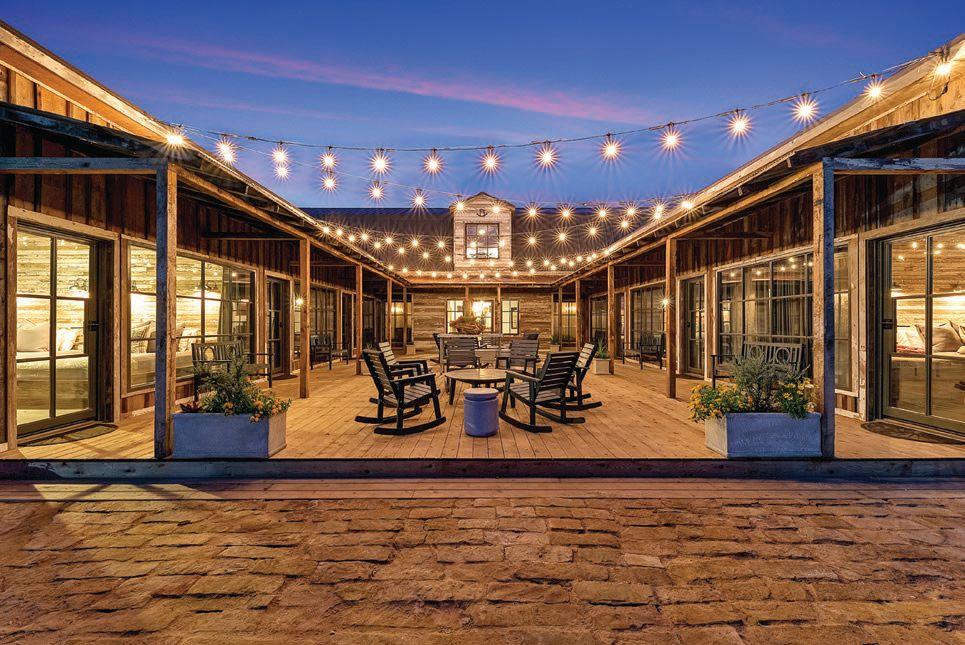
— plus Little League fields where youth tournaments are held regularly. It’s especially personal for Byrd, whose daughter Blakely, 14, played softball and baseball in Westside Little League, and son Ryland, 12, currently plays at Westside. One baseball field can be converted to an amphitheater for music festivals, the most recent being the Texas Country Music Festival where names like Pat Green, Wade Bowen and the Randy Rogers Band made an appearance on Fourth of July weekend.
Byrd says Rocker B Ranch is cur-
rently in the process of building a 70-yard multipurpose lawn that can be used for football. Seeing what once started as hand-drawn sketches becoming reality, he says the ranch has become more than a business venture; it’s a passion.
“The ‘passion’ has changed in a good way,” Byrd says. “Now our family is passionate about seeing all the people, including thousands of youth, who visit the ranch every year and enjoy the natural beauty and outdoor activities with their families and friends.”
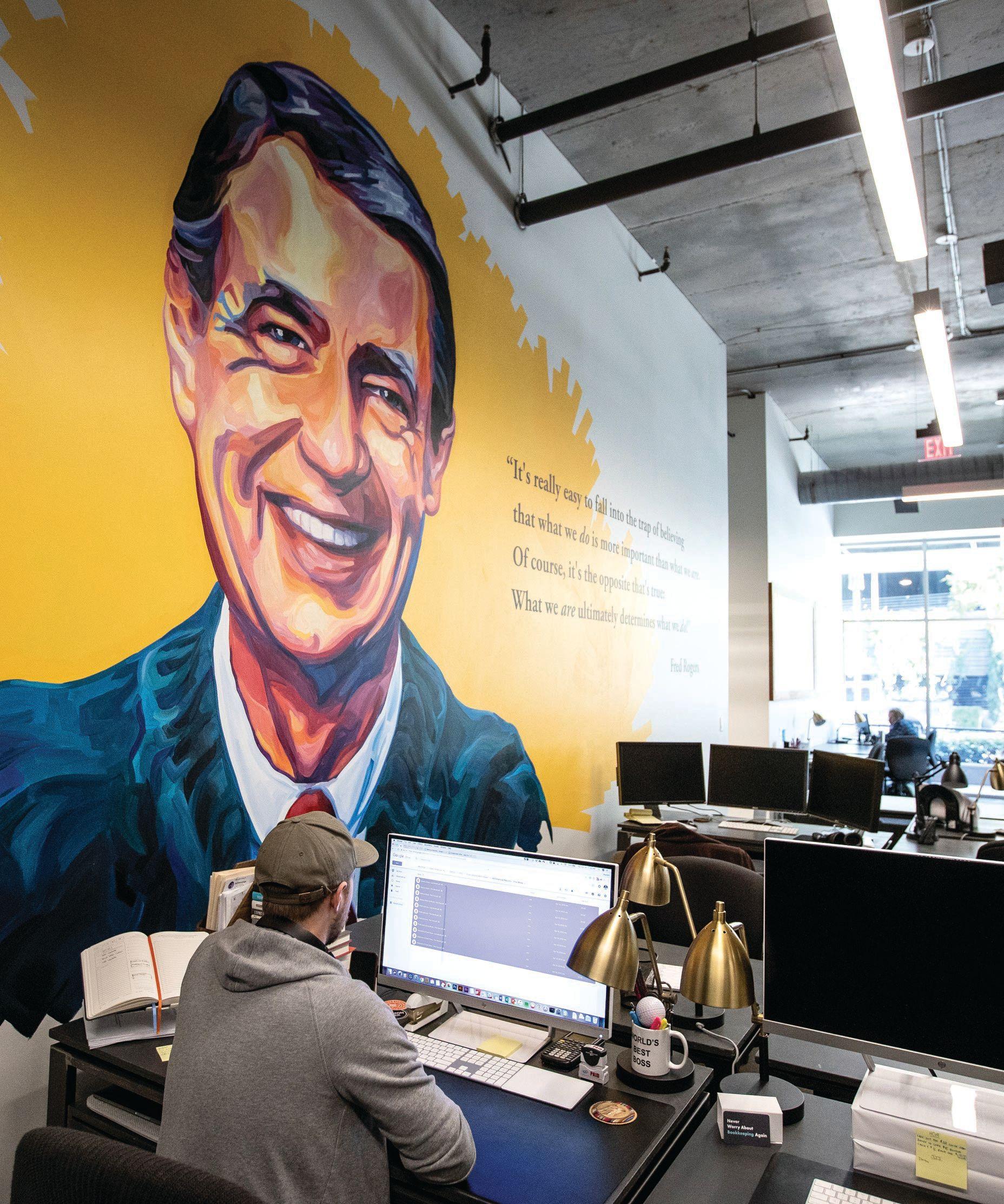

Sure, it’s from Dallas, but Common Desk’s recently opened Fort Worth location is right at home in its West Seventh-area digs.
BY SAMANTHA CALIMBAHIN
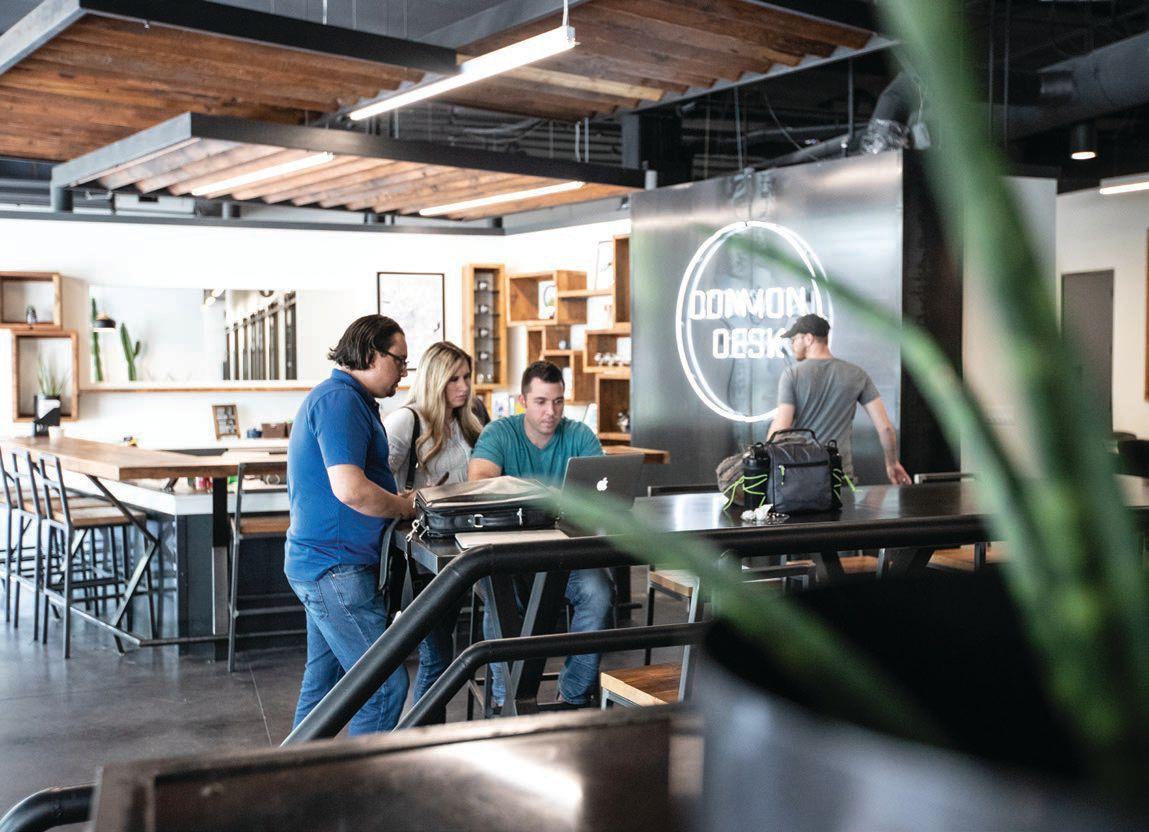
May I see your menu?” is not an uncommon question asked by curious passersby who walk into Common Desk. That’s what happens when a coworking space sets up shop in Crockett Row at West 7th, the bustling development on West Seventh Street known for its restaurants like MASH’D, The Social House and Fireside Pies.
The space did used to be a restaurant. Booth seating to the right of Common Desk’s entryway is a nod to its past life as the Brewsters’ burger joint, which closed last year.
But, to the dismay of hungry patrons hoping to grab a bite, Common Desk is a coworking space — approximately 13,000 square feet of desks, conference areas and even nap rooms for freelance workers and entrepreneurs.
“We really enjoy it in a prideful way when someone comes in and asks us if we’re a bar,” Common Desk CEO Nick Clark says. “No, it’s an office space.”
Common Desk began in Dallas when its first location opened in Deep Ellum in 2012. The company now has four locations in the Metroplex; the first in Fort Worth opened last fall. Dallas companies ENTOS Design and 44Build designed the space to follow a modern industrial aesthetic. And while there’s plenty of Dallas influence on the design, the space’s copious selection of art and themed rooms offer plenty of homages to Fort Worth.
Those who first enter Common Desk are greeted by what’s called a Hospitality Bar, a small kitchen with bar seating stocked with cof-
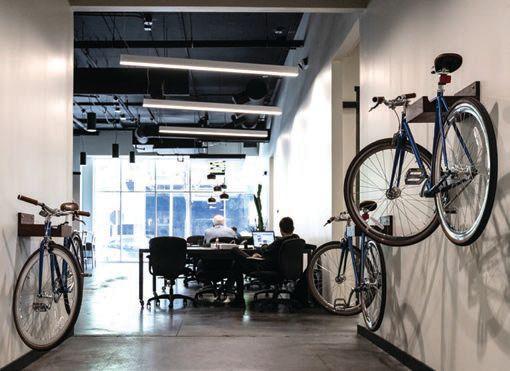
fee, KIND Bars and beer. Wooden shadow box shelves hold glasses and mugs, as well as décor like books and succulents — a setup that could be easily mistaken for a coffee shop. Nearby is Common Desk’s bright neon sign, hoisted upon a steel wall.
Surrounding the Hospitality Bar is space shared by all members, offering a plethora of seating arrangements, from couches in a living room-esque setting to restaurant booths under spherical pendant lights. Most furniture is midcentury modern.
Around the back are private “Chat Rooms” where members make phone calls, and each room is outfitted with its own collage-style wall art by Dallas artist Lesli Marshall.
Conference rooms are named after places in Fort Worth, and each room has its own personality. The Stockyards room, for example, features a black-and-white mural by Will Heron (known professionally as “Wheron”), depicting cacti connected by ladders — some cacti have cowlike skin, and others are shaped like light bulbs, with roots that appear like lightning bolts underground.
Another conference room, Panther Island, features a graffiti wall by Leighton Autrey. The Colonial room has a putting green floor — complete with hole, so members can play golf.
There’s plenty more art throughout the space, done mostly by local people. Fort Worth menswear artist Matthew Miller (the Instagram star known as “Sunflowerman”) contributed paintings of men’s clothing on textiles that hang in various spots within the
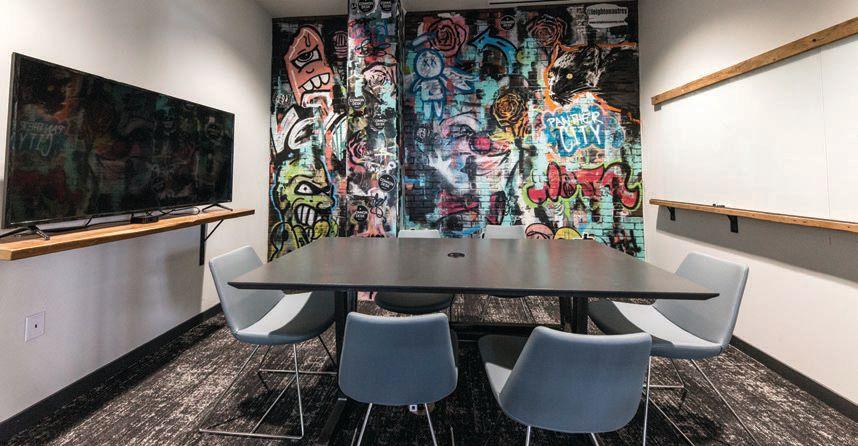
office. A large-scale installation of metal strings that sweep across a wall (by Gray Garmon, Ryan Roettker and Andrew Barnes) hovers behind conference tables in the shared space. The black-and-white sketch of a skeleton hand holding a coffee cup that reads “Death Before Decaf,” a piece by artist Mariel Pohlman, or Marpohl, playfully appears by the coffee station.
But arguably Common Desks’ pièce de résistance appears on the east side of the workspace — a massive, 21-foot mural by artist Treslyn Shipley depicting a smiling Fred Rogers. Beside his portrait, a quote from Rogers to remind workers about what’s important: “It’s really easy to fall into the trap of believing that what we do is more important than what we are. Of course, it’s the opposite that’s true: What we are ultimately determines what we do.”
Common Desk isn’t short on amenities. Bikes decoratively hanging on the wall are also available for rent. The space even has rooms with beds so members can take naps at will.
It’s an effort to make Common Desk a hospitable place. “Fun, fast and flexible,” as Clark says, are the key attributes Common Desk aims for in all of its spaces, whether it be in Dallas or Fort Worth.
But especially in Fort Worth.
“We’re obsessed with it feeling very authentic,” Clark said. “We strived hard for [the Fort Worth location] not to feel like something that we fabricated, but something that authentically reflected the Fort Worth community.”

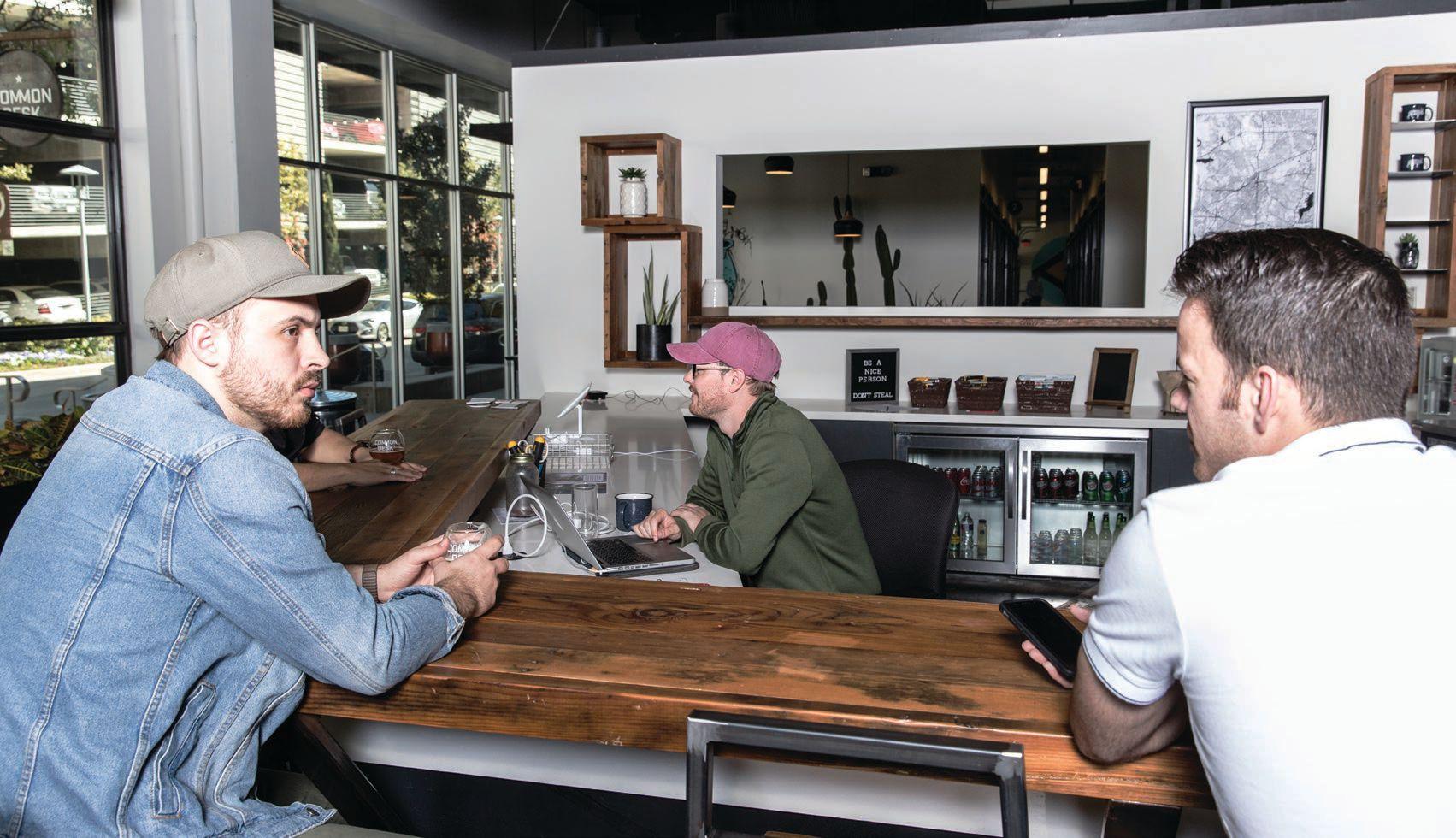
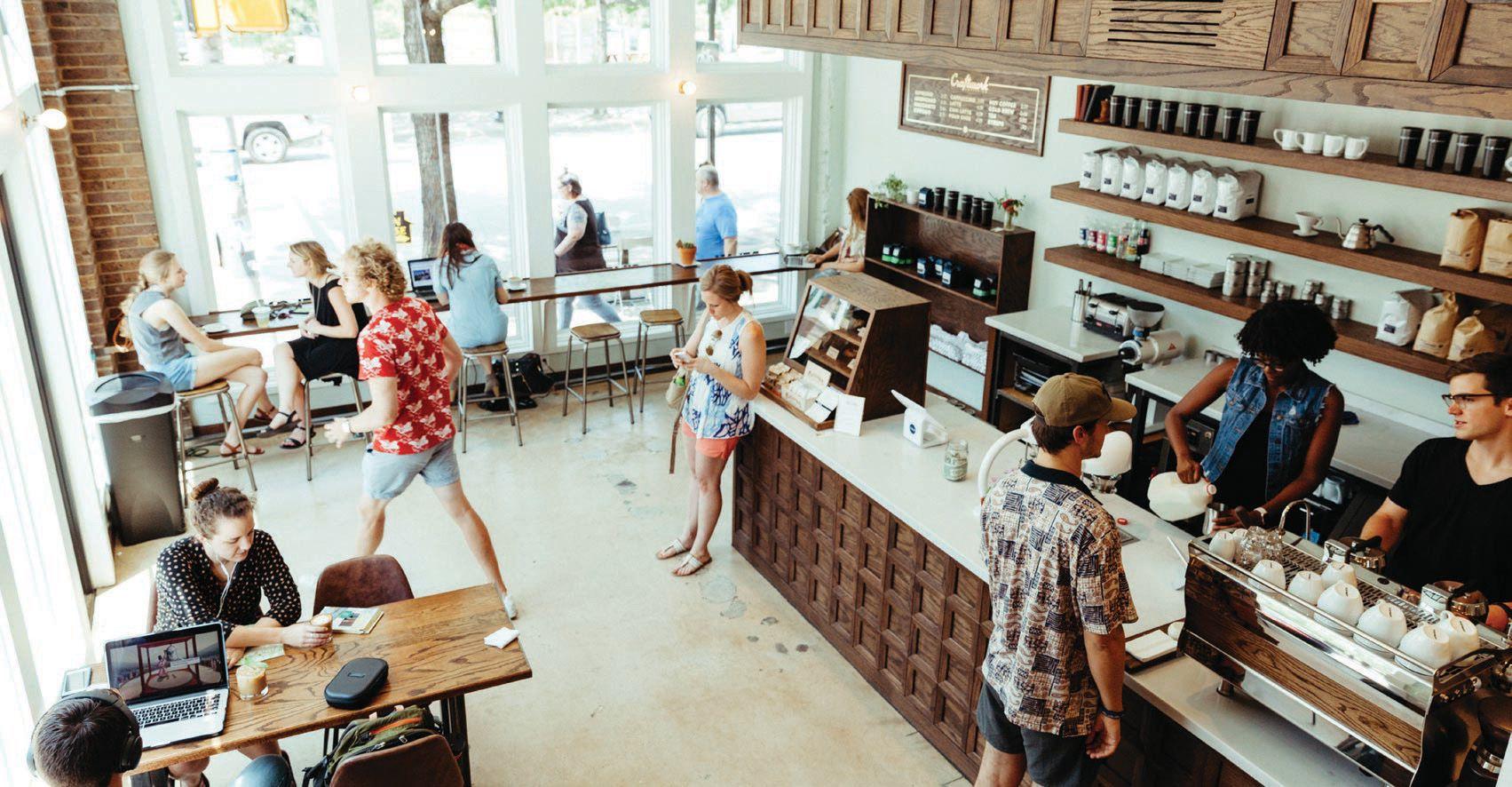
Three Fort Worth food concepts — Craftwork Coffee Co., Salsa Limón and Taco Heads — are all in the middle of an insane growth spurt. So, what’s their secret?
BY SAMANTHA CALIMBAHIN
Keeping a restaurant alive is hard enough as is. But three Fort Worth-based food concepts — coworking space/ coffee shop Craftwork Coffee Co. and taco joints Salsa Limón and Taco Heads — have not just stayed open; they’ve grown. And they’re still growing like crazy. Here, the entrepreneurs behind all three concepts share their tips on when to know it’s time to grow and how to manage growth responsibly.
CRAFTWORK COFFEE CO.
It all started with… One coffee shop
and coworking space on Camp Bowie Boulevard in 2016.
Now it’s… Two Fort Worth locations currently open; a forthcoming location in The Foundry District opening in August; and the acquisition of WorkFlourish, a Houston-based company that builds coworking spaces in residential buildings. With the acquisition, Craftwork plans to build 15 new locations in Fort Worth, Dallas, Houston and Austin by 2021. The first of these will be built in Austin, in the Streetlights Residential development on Domain Drive. It’s
expected to open spring 2019.
How to know when “it’s time”: “Early financial success is going to prove to be one indicator but not the only indicator,” says Craftwork CEO Riley Kiltz. “It’s really important to see the vision — in five years, what’s going to keep fueling our company? That’s ultimately at the heartbeat: Why are we doing this whole thing?”
How to handle growth responsibly: “Take your success with a grain of salt,” Kiltz says. “There’s a lot of peaks and valleys. Stay focused on the mission that you set out to achieve, and that will bring you a lot more stability, and ultimately, your customers a lot more enjoyable experience.”
SALSA LIMÓN
It all started with… A location inside La Gran Plaza Mall off Interstate 35.
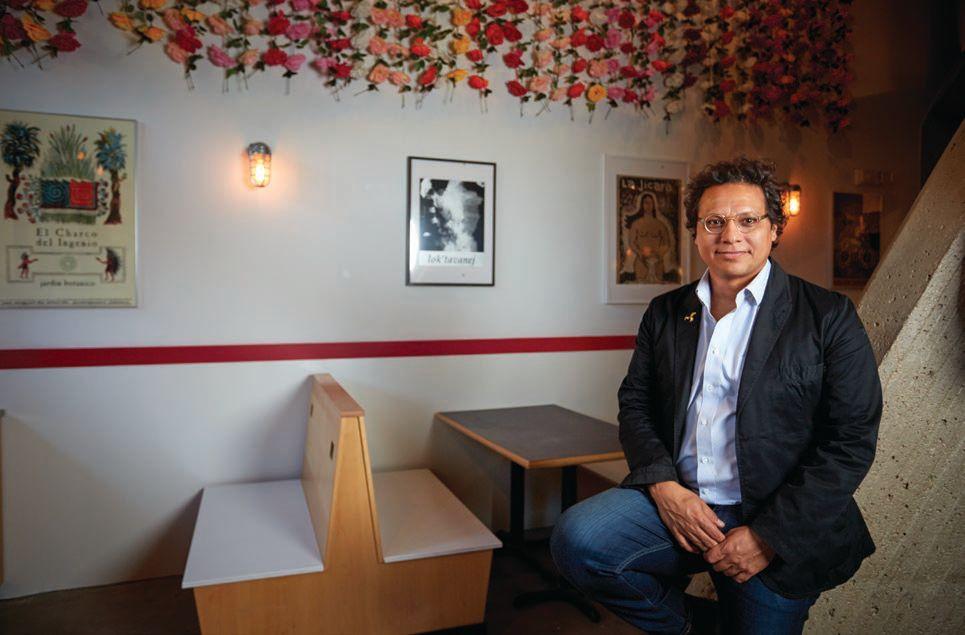
Now it’s… Three food trucks; five bricks-and-mortar currently open, including one in downtown Dallas; a Magnolia Avenue location expected to open in the fall; a location on the first floor of the Elan development across from the Modern Art Museum of Fort Worth, expected to open in 2019; and two more locations in Dallas in the near future.
How to know when “it’s time”: “We were struggling to make our cash flow in the location in the mall [during the 2008 recession], so we had to move out,” says Salsa Limón president Ramiro “Milo” Ramirez. “Our solution was to do a food truck … That was the beginning of the change for us, getting our product outside.
“We’ve taken on a lot of opportunities that just come to us — someone wants to develop a new neighborhood, and they need you to come over — if the deal is a good deal, we’ll take it … Honestly, you’re never fully ready. You need to just keep on going. As you go forward, try to get your operations in gear; just start hiring people. That’s how we did it. We just found the opportunity, and then we made it work.”
How to handle growth responsibly: “In my opinion, a human resource system has to be the precursor to any sustained growth,” Ramirez says. “This is the most difficult thing — to hire the right people that follow your philosophy, that understand what makes people want
to come back to your restaurant or your business.”
It all started with… A food truck.
Now it’s… A brick-and-mortar that opened on Montgomery Street in 2016, two food trucks, and a forthcoming Dallas location opening on Henderson Avenue in August. Plus, Taco Heads is currently being served at coffee shops like Craftwork Coffee Co., Sons of Liberty Coffee, Avoca,
Roots Coffeehouse, The Perk at Christ Chapel Bible Church, and the Coffee Folk trailer, which Taco Heads partner Sarah Castillo says serves the most tacos. A Taco Heads in San Antonio is also being planned. Castillo says she’s working to consolidate Taco Heads and the Tinie’s Mexican restaurant (opening on South Main Street in 2019) under one umbrella company called Neon Light District Hospitality Group.
How to know when “it’s time”: Castillo says growth is essential to keep team members and employees passionate about the business. “To keep those great team members, you need to provide more. You don’t want to work for a restaurant that just has one restaurant. You need more to keep everyone hungry and growing.”
How to handle growth responsibly: “When you have a good team and work together, stay focused and [take] one thing at a time.”
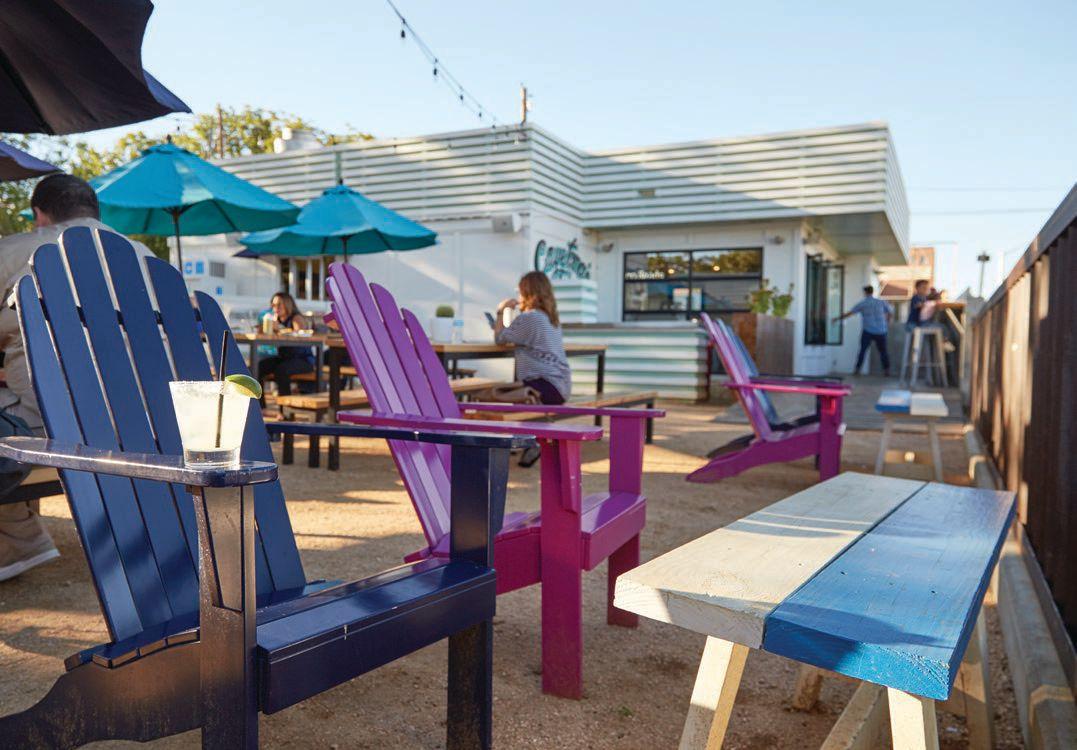
From a chair that improves brain function to a nifty all-in-one diaper bag, here are a few of the up-and-coming innovations that appeared at TECH Fort Worth’s annual event.
BY ERIN PINKHAM
More than 25 companies shared their innovations at TECH Fort Worth’s fifth Annual Impact Showcase on June 5. Startups and innovators came together for one night to show their vision for improving technology and bettering the world. Here are three notable gadgets that made their appearance.
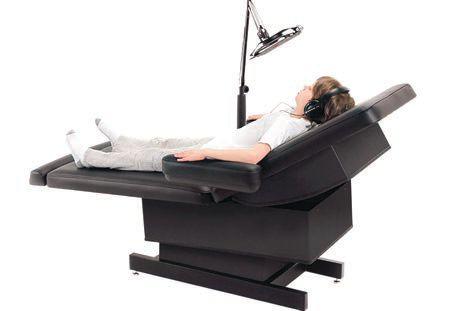
The Clarity Chair is meant to improve brain function, help with trauma and improve social skills after using it for two hours each day for five days. How it works — sit in the chair, watch brightly colored lights on a screen and listen to special filtered music, all while the chair makes subtle movements and slowly spins in a circular motion. The senses are being stimulated at the same time which, according to the chair’s makers, helps the brain improve. Created by Dr. Mary Ann Block and Joan Anderson, the Clarity Chair is an FDA-cleared, fully automated device that targets all five senses and trains them to work together more effectively.
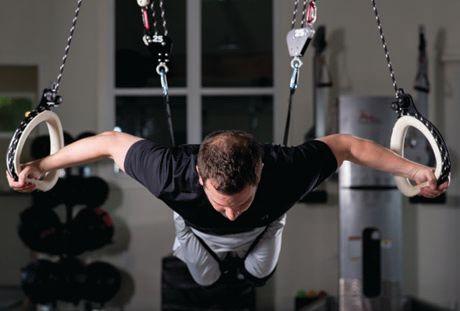
Through a harness system and pulleys, Stripe Fitness’ Air Suspension Trainer lets users perform exercises like pullups or pushups while also allowing the user to choose the percentage of body weight they want to exercise (between 25 and 50 percent). Its design that mimics gymnastics rings is no coincidence — co-founder Matt Dwork was a former gymnast at Ohio State University. The Air Suspension Trainer is currently being marketed to health club owners, personal trainers, athletes and physical therapists.

Made for parents, by parents, the Aspen Tyke Traveler is an all-in-one diaper bag, changing station, organizer, and backpack. Co-founders — and couple — Saryina and Glen Oliver, who both have backgrounds in engineering, created the Aspen Tyke Traveler as a way to save time and spend more of it with their son, Alex. The bag features pockets on all sides, customizable labels, and a removable, easy-to-clean changing pad built in. It also has a patented “checklist” system — empty pockets are marked with Xs, and when the pocket is filled, the X becomes a checkmark. The bag can be worn as a satchel or backpack and can also be attached to a stroller.

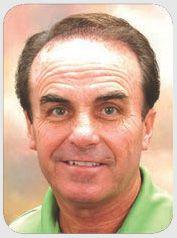
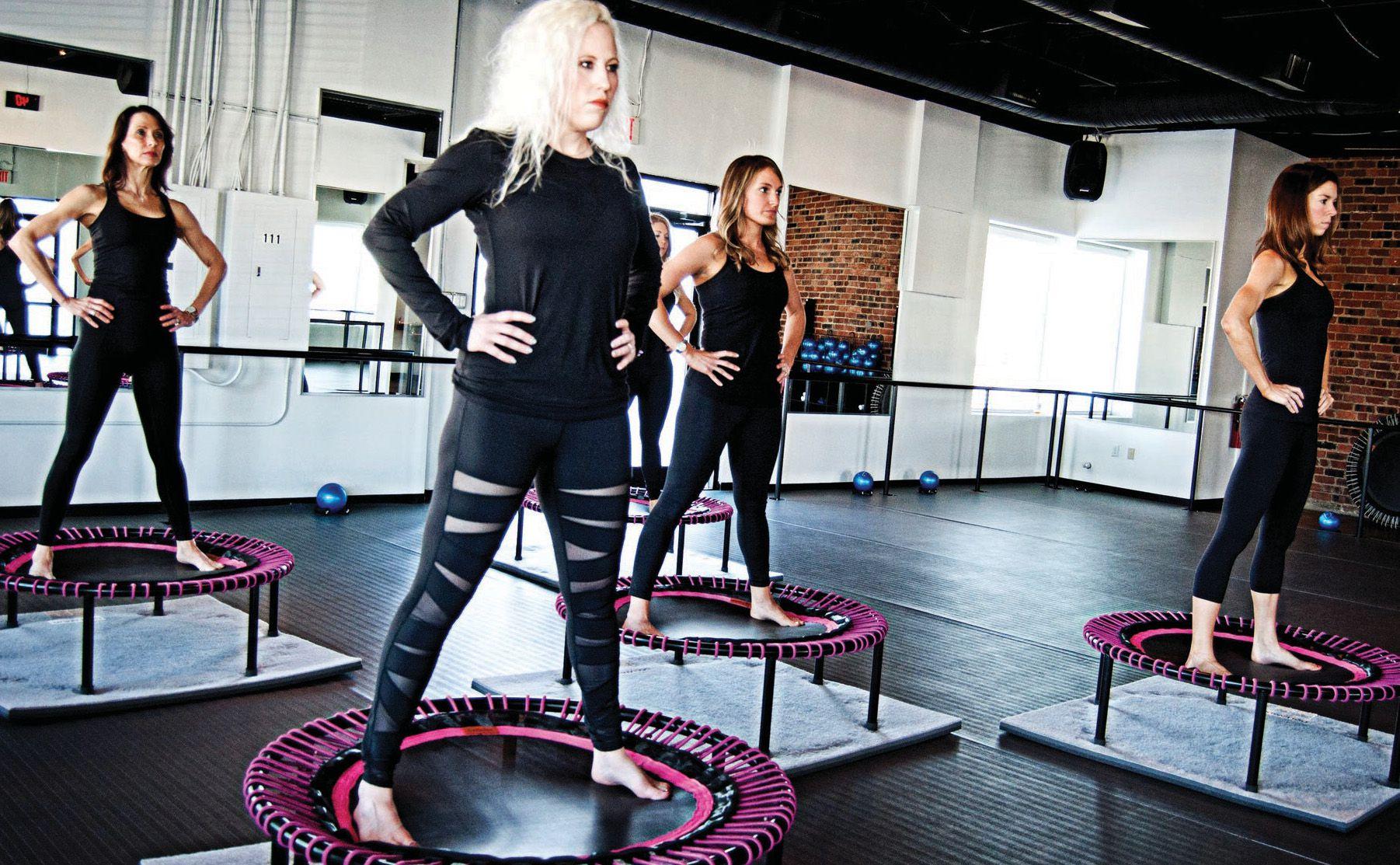
With a trampoline — and tenacity — a local fitness instructor finds success in the Near Southside.
BY SHEILA ELLIS

Stephanie Perry marked her 20,000th client in June at D Method, her Near Southside workout studio located at Hemphill Street. Though it maintains an inconspicuous presence outside, D Method opens to reveal an inviting space with natural light and big, airy rooms where participants engage in classes like barre and Pilates, as well as D Bounce — hourlong workouts on trampolines.
Perry, a former soccer player and competitive gymnast, had always dreamed of opening her own studio, having never been satisfied with the restraints holding her back at her previous jobs.
“When I finally realized that, it was too funny,” she said. “My husband actually said to me, ‘Honey, you’re gonna hit the roof. You’re gonna hit the ceiling everywhere you are until it’s your own ceiling.’”
So, she made her own ceiling, launching D Method (the “D” stands for her
middle name, Daulton) in 2014 with the help of six clients who offered her $150,000 in buildout loans — all of which she paid back with minimal interest in just three years.
In June, the studio reached another landmark by offering its 1,000th bounce class. While designing the bounce class, Perry went through five trampolines before choosing the Bellicon rebounders, due to their durability and reputation for detoxing the lymphatic system. She is now one of only four Bellicon Master Trainers in the world.
Perry is planning to introduce another class with the Bellicons, Bounce Hit, that will incorporate more traditional methods of weightlifting and interval training. It’s an effective way to burn calories without harsh joint impact.
“You don’t even realize that you’re working as hard as you are,” Perry said. “You’re up there smiling because you feel like a kid, you know? It’s so much fun.”
GET
Bring a water bottle. Don’t start drinking when you get to class! Make sure you hydrate before, during and after a workout.
Eat a healthy snack before class. Stephanie recommends light snacks with a healthy balance of protein, fat and carbs, such as an apple with almond butter.
Typically, people wear capris and either a fitted top or a loose tank, Perry said. Dressing in cool, breathable fabrics helps keep
you focused on classes rather than uncomfortable outfits.
When using a trampoline, incorporate knee lifts, kicks, and even balletinspired moves like pliés to keep your workout fun and varied.
You don’t always have to bounce on your trampoline! To tone your lower body, try placing one foot on the floor, the other on your trampoline and then squatting.
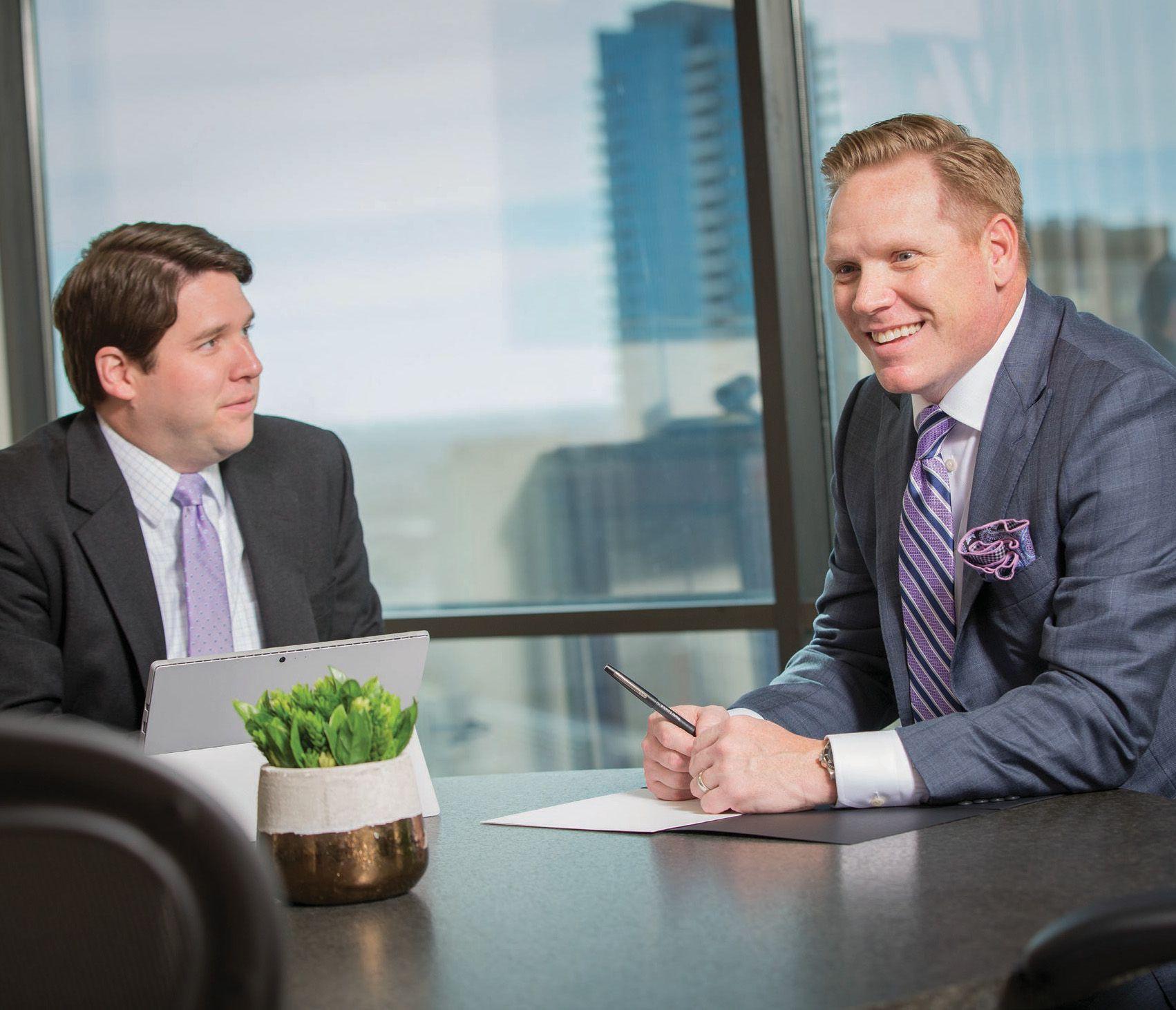
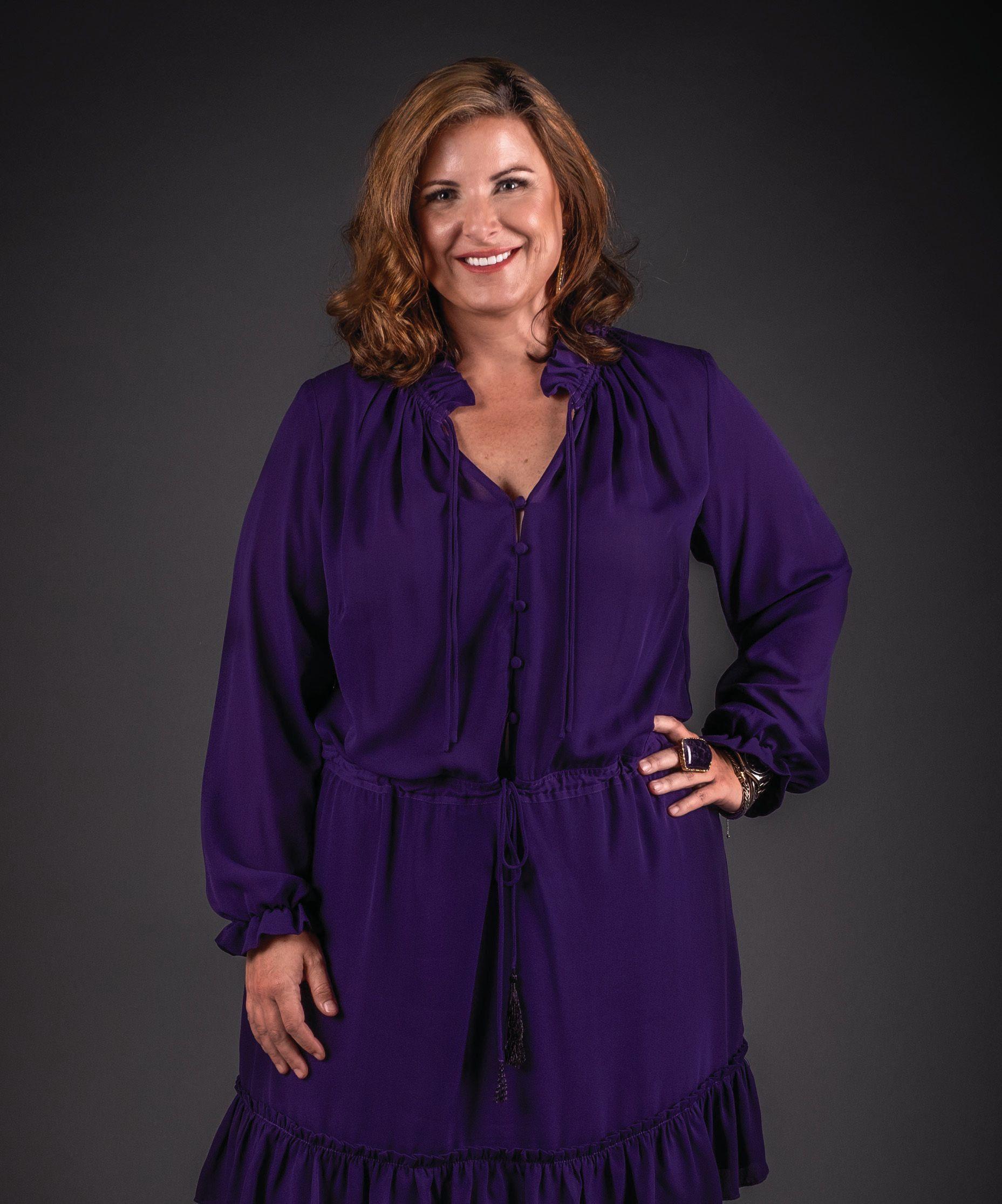
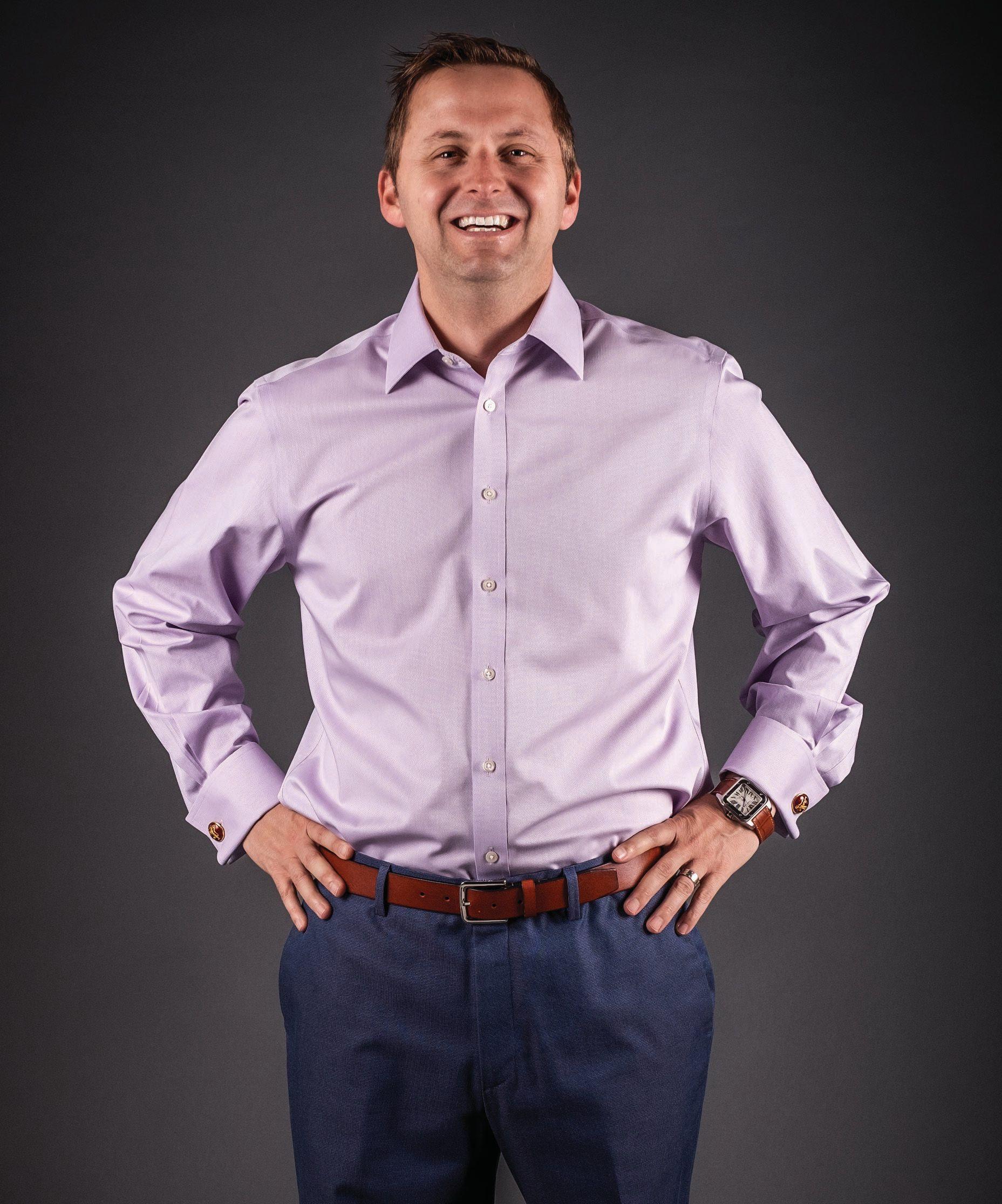
Will Churchill and Corrie Watson, the twin great-grandchildren of the iconic Fort Worth auto dealer Frank Kent, build a burgeoning business in autos, wine, and real estate – and look to give back.
BY TERESA MCUSIC
What do Cadillac, a wine bar, a dozen retail buildings, brewery, meat rub, and a $3 million overhaul of Fort Worth’s Trinity Park playground have in common?
The answer: Will Churchill and Corrie Watson, twin great-grandchildren of the iconic Fort Worth car dealer Frank Kent. The 42-year-olds are still thick in the auto business after inheriting Frank Kent Motor Co. and its 500 employees before they were 30. But in the years since, they have sold and bought other auto dealerships and expanded from the car business to run a wine wholesaler and wine bar; buy, upgrade and lease retail buildings in the Near Southside and west Fort Worth; take over a brewery; and create Grease Monkey Rubs for chicken, steak, seafood and vegetables now selling in all Texas Central Markets.
This summer, they'll help break ground on Fort Worth’s first playground for disabled and able children to play together. The Dream Park will replace the old playground at Trinity Park with a wide variety of play equipment and green space designed by LSI, an inclusive play provider in Minnesota. Frank Kent is the title sponsor, contributing $700,000.
Like most of their nonauto hospitality businesses, the playground idea was something Churchill stumbled across while on vacation in Wisconsin with his wife, Rachael, and son, Cash. Churchill said the company wasn’t looking for a big altruistic undertaking.
“The project just found us,” he said. “It was not our plan to be the title sponsor. We wanted to be behind the scenes and create this type of playground for Fort Worth. But fundraising was difficult, and when we became the title sponsor, it opened up a lot. That explains so much of how we are and who we are.”
Watson run about as deep as they can go, back to even before Frank Kent stepped into the city in 1927 and started selling cars. The twins’ great-great-grandfather was Carroll Peak, the first doctor in Fort Worth, who settled in the town in 1853. Peak and his wife, Marion, had some of the first children born in the fledgling community.
Fast-forward a generation and one of the Peaks’ granddaughters, Florence Peak, would become the wife of Frank Kent, a haberdasher from Clinton, Missouri, who moved to Fort Worth in 1927 to sell used cars for Sanford Webb and Earle North’s dealership. Churchill says the family story goes that the car dealers told Kent if he sold two cars in three days, he would hire him. “Frank sold five,” Churchill said. “And then he had to teach people how to drive them. They were still using horse and buggies.”
Kent started Frank Kent Motor Co. in 1935 with a Ford and Lincoln-Mercury dealership on Henderson Street near downtown. By 1953, his attention turned to what would become the company’s prized product when Kent purchased a Cadillac dealership. Kent’s granddaughter, Wendy Churchill, once estimated the dealership sold 31,000 Cadillacs during Kent’s 34 years as a dealer, including to famous customers like Liberace, Texas Governor John Connolly, and Fort Worth oilman Sid Richardson. Kent owned a number of other dealerships in the area over his lifetime and was posthumously inducted in the Automotive Hall of Fame in Detroit in 1989.
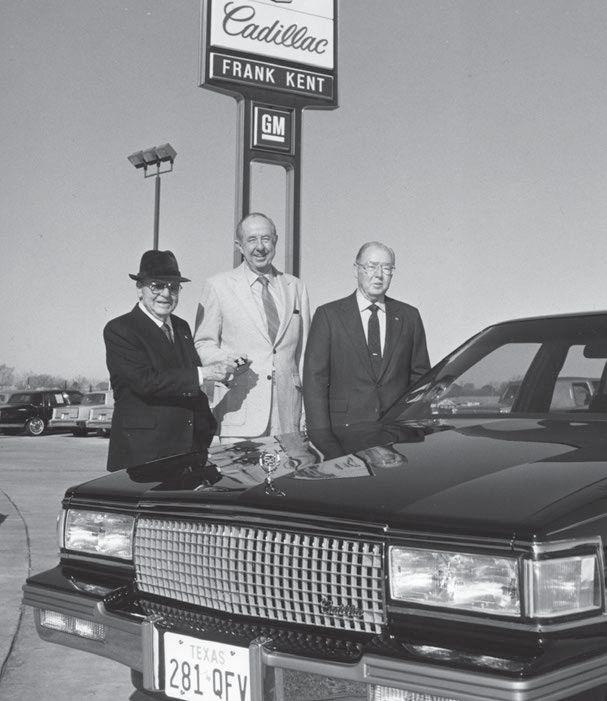
The Fort Worth roots of Churchill and
Churchill and Watson inherited the business after their mother, Wendy Churchill, passed away in 2005. Will Churchill, a TCU graduate, was a sales manager for Kent’s Hummer division at the time. Watson, a UNT graduate, worked in marketing and advertising for Kent.
Kent Motor has no board of directors and no shareholder interests, Churchill said. “We usually make decisions together over a bottle of wine and a nice dinner,” he said. “The only expectations we have are for ourselves.”
That gives them the freedom to put “morals and ethics above profits,” Churchill said.
“Corrie and I have had a lot of help,” he said. “Our mother left us a legacy. If we can create other legacies, we want to support that.”
One place they said they’re doing that is by buying and refurbishing older properties in the Near Southside and far west parts of the city. The brother and sister own more than a dozen buildings combined in those areas and have upgraded them with new air-conditioning units, LEED-certified windows, new wiring and plumbing, and other enhancements.
The big Near Southside push followed the twins’ venture into wine. That started when they began serving wine and holding tastings and dinners at the Cadillac dealership, and it grew into the Cadillac Wines wholesaler.
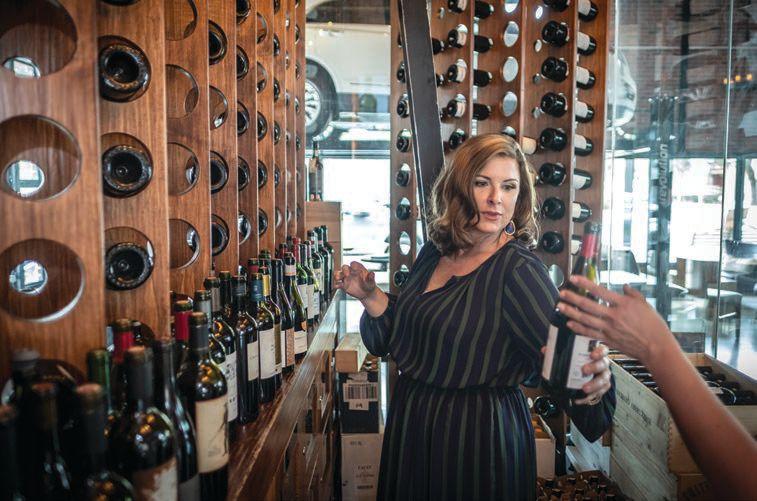
The twins said the real estate acquisitions grew organically when they were looking for a place to open a wine bar after selling their Honda dealership and a piece of land in downtown Fort Worth in 2015. The sales left them with a nondisclosed amount of 1031 exchange money, which refers to a federal Internal Revenue Code that allows investors to reinvest after a sale of other property without having to claim capital gains.
They looked at West Seventh Street and found the rents too high, while downtown Fort Worth property owners thought the wine bar would compete too much with existing places, Churchill said. That led them to West Magnolia Avenue in the Near Southside, where they found a location and opportunity to buy the building. Kent & Co. Wines, which has more than 300 wines in stock to purchase by the glass or bottle, was born.
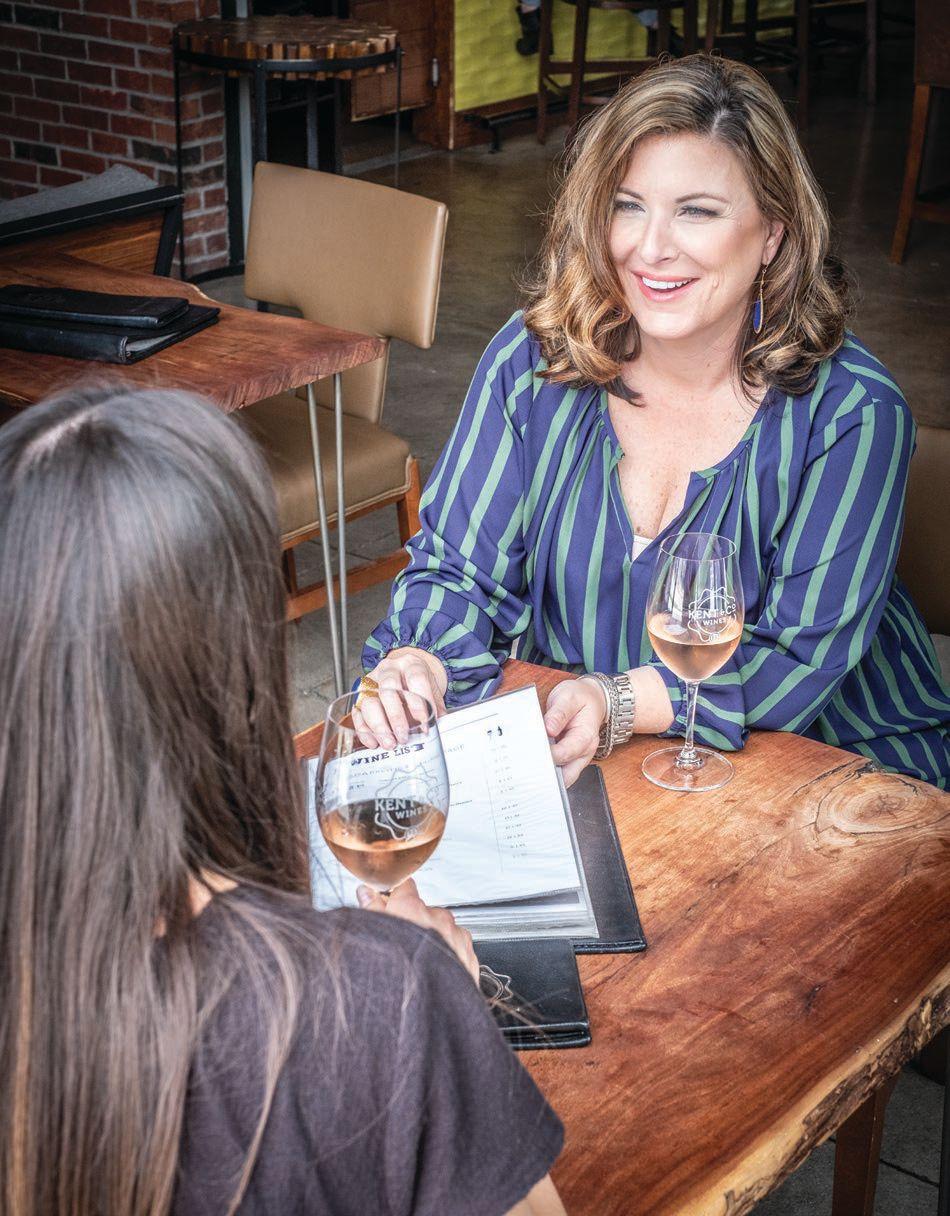
From there, their holdings in the area grew fast. Churchill and Watson were looking for more parking and found other building owners wanting to sell to them instead of just leasing out their parking space. The twins focused their Near Southside purchases on and around West Magnolia and South Main Street, refurbishing the properties for retail and residential lofts.
“It was not a grand scheme we had,” Churchill said. “The plan was just for Kent & Co. Wines. But when we asked for parking, the owners said, ‘Why don’t you just buy us?’ Then we fell in love with the area.”
Buying buildings for cash, Churchill and Watson then swung deals for tenants they wanted, breaking a logjam on West Magnolia where prospects were unable to find reasonable rents and had to look elsewhere.
The twins’ tenant list includes Heim Barbecue, Melt Ice Creams, Gus’s World Famous Fried Chicken, Cartan’s Shoes (an existing tenant), Chimera Brewing Co., The Space events center, and Kent & Co. Wines, among others. Churchill and Watson founded The Space and Kent & Co., and they took an equity interest in Heim when they brought the restaurant onto West Magnolia out of the food trailer that Emma and Travis Heim founded the business in. Earlier this year, they purchased Chimera from founder Carlo Galotto, drawn by the lure of owning West Magnolia’s only brewery and Galotto’s pizza lineup, regarded as among the city’s best.
Mike Brennan, president of Near Southside Inc., a nonprofit charged with revitalizing the 1,400-acre community of neighborhoods and historical buildings, finds what Churchill
and Watson are doing in the area a good fit with other local investors in redeveloping the landmark buildings, largely constructed in the 1910s through 1920s.
“Anytime we have investors that come in and purchase old buildings and restore them and find locations for local businesses, that’s a huge win for the district,” Brennan said. “They are owners who believe in the importance of maintaining the buildings’ architectural integrity and bringing these buildings back to life.”
Some of the buildings in the area are protected by historical designation, but many are not, Brennan said. “We have a long list of like-minded investors and property owners in the area,” he said. “It’s important for the district to attract those developers willing to take on that challenge with a clear commitment to the community beyond just a bottom-line investment.”
While Churchill and Watson said their real estate investments are making
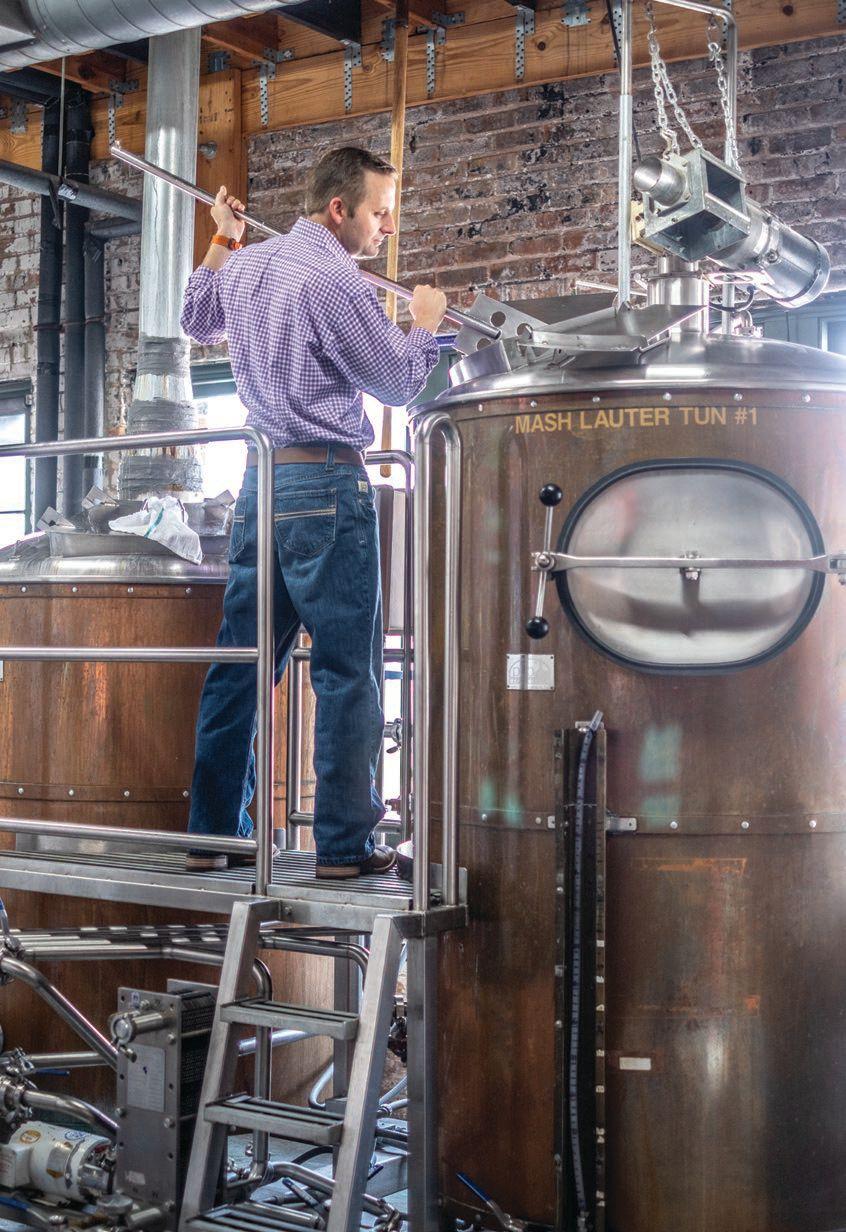
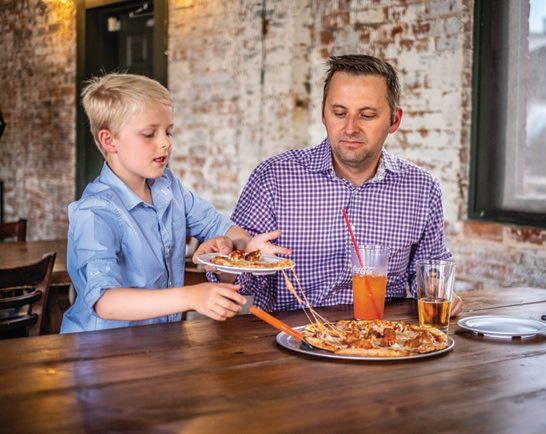
money, they have leased properties below market value for some tenants, Churchill said. “We’re not a charity, but if there’s an opportunity to give back, we step up and give businesses opportunities,” he said.
Melt founder Kari Crowe, for example, tried to find a reasonable rent on West Magnolia before she founded her business on the cheaper West Rosedale Street. Churchill and Watson gave the popular shop an “under-market lease” to bring it off of West Rosedale into the heart of West Magnolia, Churchill said. “We could have doubled the lease rate, but the move was good for the street,” he said.
Members of the Fairmount Neighborhood Association have mixed feelings about the redevelopment, some complaining on social media of the “Kentrification” of the area — a term coined by Churchill but blasted on Facebook by Fairmount homeowners dealing with increased noise, street parking and properties values as a result of West Magnolia development.
“We are happy that investors are able to see what we could see in terms of a beautiful, walkable, tight-knit community,” said Sara Karashin, president of the Fairmount Neighborhood Association. “But development is a doubleedged sword. Once investors see the value in an area, there is a fine line from investing because they love the area and wanting to grow in the area.”
Karashin said Fairmount is petitioning the city to start a permit-only parking program on neighborhood streets, which would cut down on many of the issues for neighborhood houses directly next to Magnolia businesses.
The business holdings of twin Fort Worth entrepreneurs Will Churchill and Corrie Watson:
Automobiles:
Frank Kent Cadillac; Chevrolet, Buick and GMC; ChryslerDodge-Jeep-RAM Real estate: Dozen commercial and mixed-use properties on the Near Southside and West Side. Tenants include:
Heim Barbecue, Melt Ice Creams, Gus’s World Famous Fried Chicken, Cartan’s Shoes, Chimera
Brewing Co., The Space.
Wine: Cadillac Wines wholesaler, Kent & Co. Wines retail shop
Food: Grease Monkey barbecue rub, sold in all Texas Central Markets
Auto parts: Southwest ADI, GM parts wholesaler
But overall, Karashin said Fairmount recognizes Churchill and Watson as two of the first big investors in Magnolia business properties, as well as their passion for the community. “Kent and Co. is part of the family,” she said. “And we are working together to find solutions as the area continues to grow.”
Churchill said he was initially upset about the Facebook postings to Kentrification; he defends his companies’ business practices. “We are taking buildings that are in distress, and we are fixing them up and bringing them back to code and ordinances — that’s half of gentrification,” he said. “But we also haven’t displaced one tenant and have brought in largely mom and pop businesses.”
Brennan also supports what Churchill and Watson and other investors are doing in the area, citing that West Magnolia was recently awarded a Great Street of Texas designation by the Texas Chapter of the American Planning Association, joining such illustrious streets as the Strand in Galveston and Main Street in Fredericksburg.
“In the age of social media, things can get rough,” Brennan, who lives in the Fairmount neighbor Mistletoe Heights, said of the Facebook postings. “Everybody’s very passionate about the neighborhood. This is our place. We are definitely seeing increases in property value and some rents are going up, which is always a concern, but we haven’t yet seen key businesses get pushed out or closed.”
Heim, for one, is “as grassroots as you can get,” Brennan said. “Their tenant list demonstrates their commitment to the area,” he said.
Churchill said moving some of its business out of the auto dealership world and into
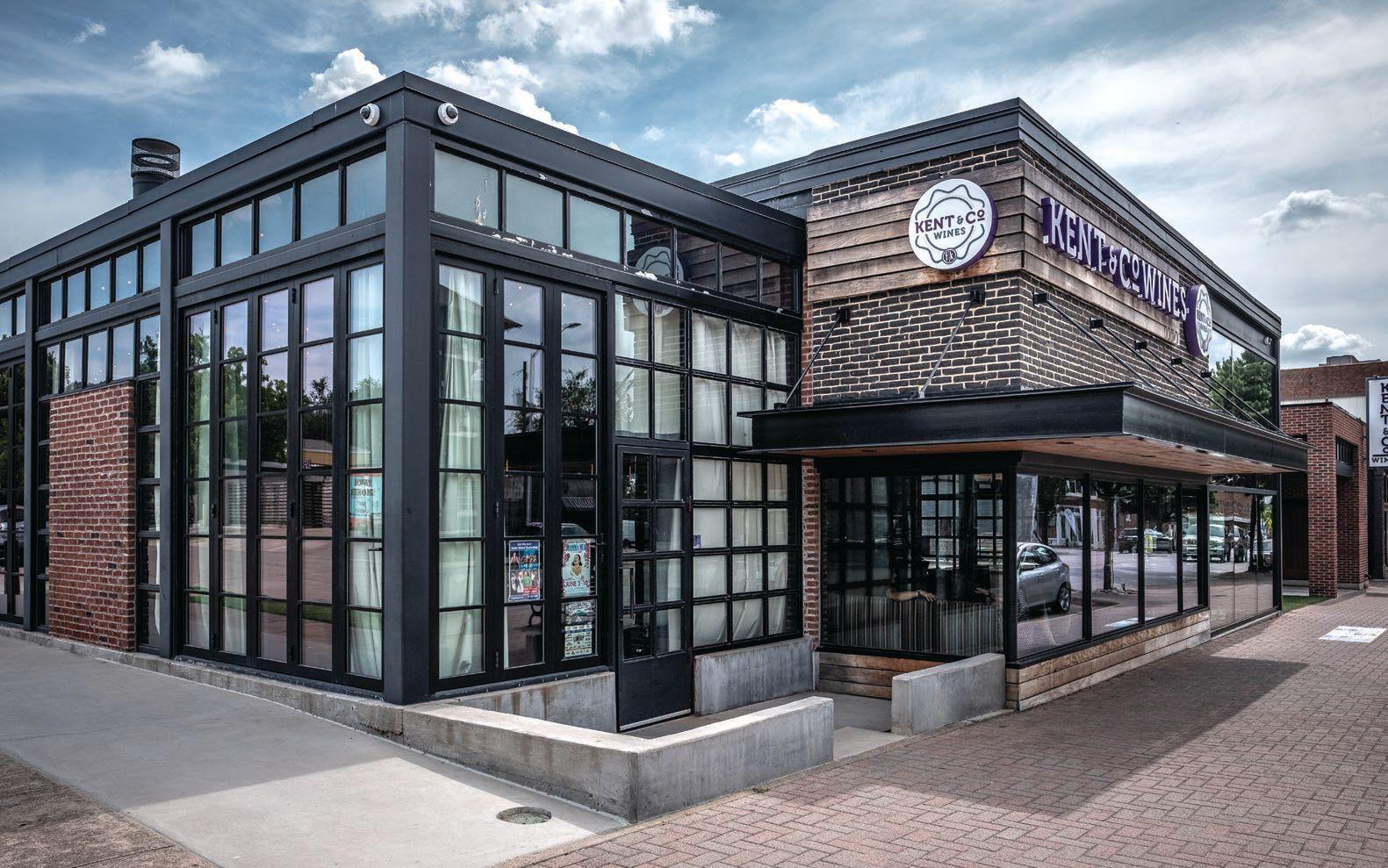
hospitality and real estate holdings is important going forward. “Back in time, you could specialize and be fine,” Churchill said. “In today’s time, it’s a lot smarter for us to have a diversified portfolio. It gives us greater options.”
The twins connected with Heim after Churchill’s wife, a vegeterian who was throwing a shower for a friend, was directed to Heim as a potential caterer. Churchill and Watson expanded their Grease Monkey rub to all Texas Central Markets from the Fort Worth store in spring 2017. The twins launched the seasoning because Churchill is sensitive to salt, he said. Like many such products, friends and family asked for the recipe, so they decided to manufacture it for retailers. Churchill and Watson use a packer in Arlington to blend and package the rubs, created the recipes, designed the labels and packaging, and handle distribution in-house.

Watson said she thinks her great-grandfather, Frank Kent, would approve of their entrepreneurial endeavors. “He was an innovator himself,” she said, noting at one point he branched out into the travel industry. “Today, it would have been easier for him to be multifaceted like we are.”
As neophytes in the hospitality world, Watson said their biggest strength has been not to be afraid to ask for help. “We have leaned on people in the industry, and they have been very responsive,” she said. “It’s not a sign of weakness to ask.”
As fraternal twins, Watson and Churchill don’t finish each other’s sentences, but they do make a complete team, the Arlington Heights graduates said. “I sling it and she cleans it up,” Churchill said. “Neither can do the other’s job. We happen to be a perfect twin balance.” Watson said her brother is “brilliant, well-spoken and a natural leader.” Churchill calls his
sister “the calm in the storm with a heart the size of Texas times two.” The key to their partnership is “ultimate trust,” he said. This turn into other types of business has not deterred the twins from the auto industry, however. In April, Frank Kent Motor Co. sold its Hyundai dealership to the Hiley Automotive Group, but the month before, Kent Motor acquired AutoNation Chevrolet and AutoNation Chrysler, Dodge, Jeep and Ram in Ennis, south of Dallas.
In addition, the twins own Southwest ADI, a GM wholesale business, where they are a reseller/distributor for GM parts and add-ons throughout the Texas marketplace, except for West Texas and the Panhandle. Churchill said Southwest ADI is their most profitable business.
But the heart of their business is selling cars, with Cadillac their name brand, Churchill said. “Automotive is always our core, our common thread,” he said. “Cadillac has always been and will always be the center of it.”
Teresa McUsic is a Tarrant County freelancer.
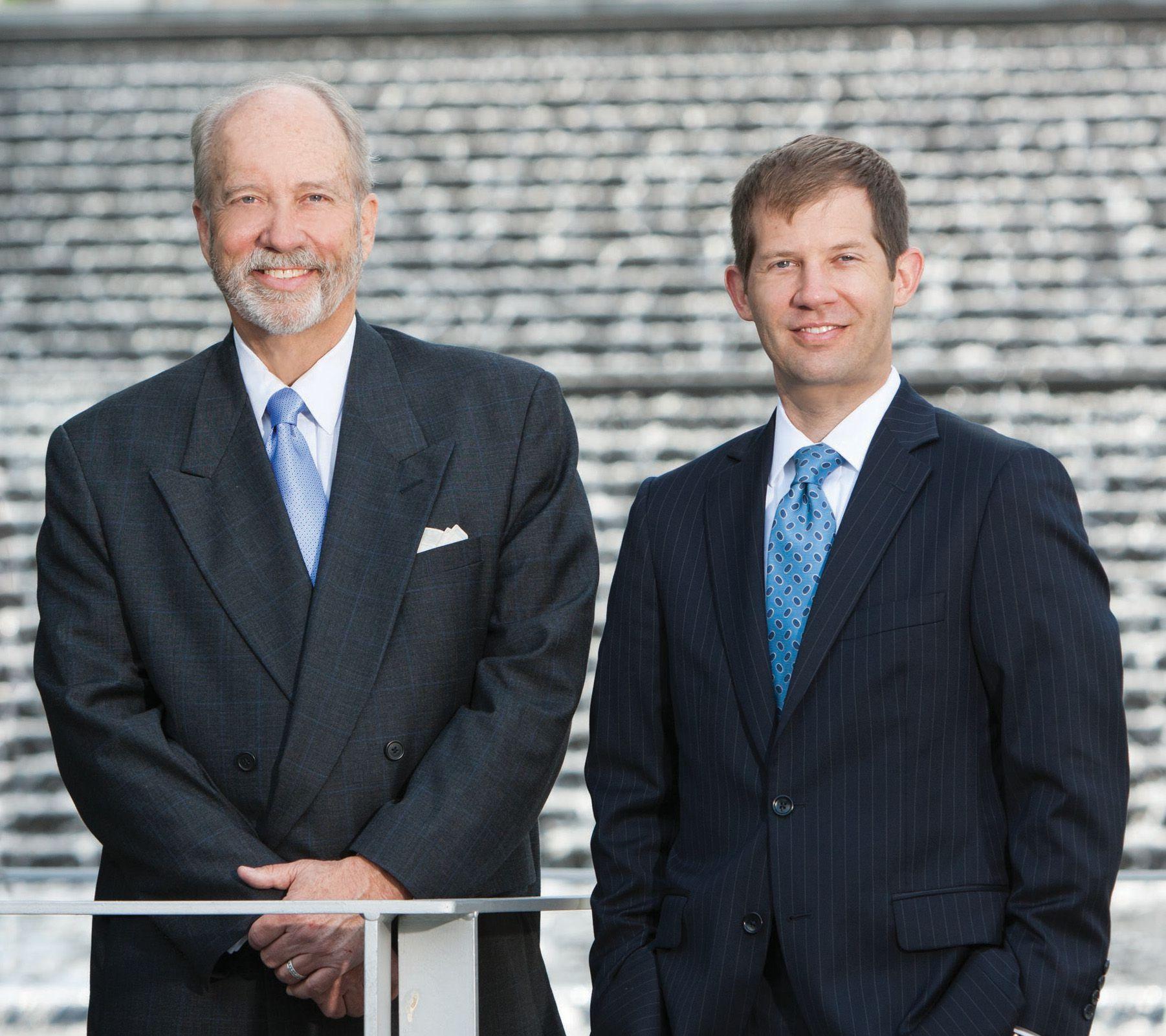
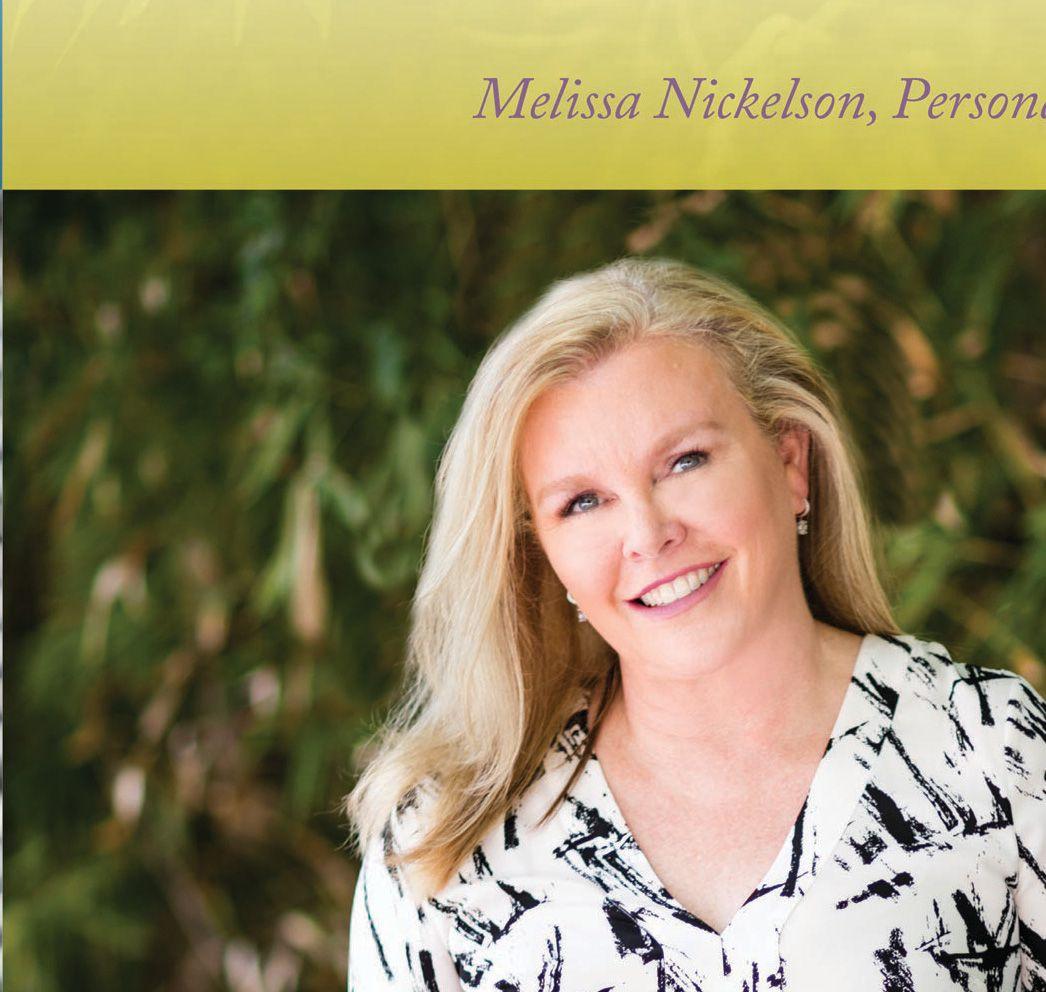




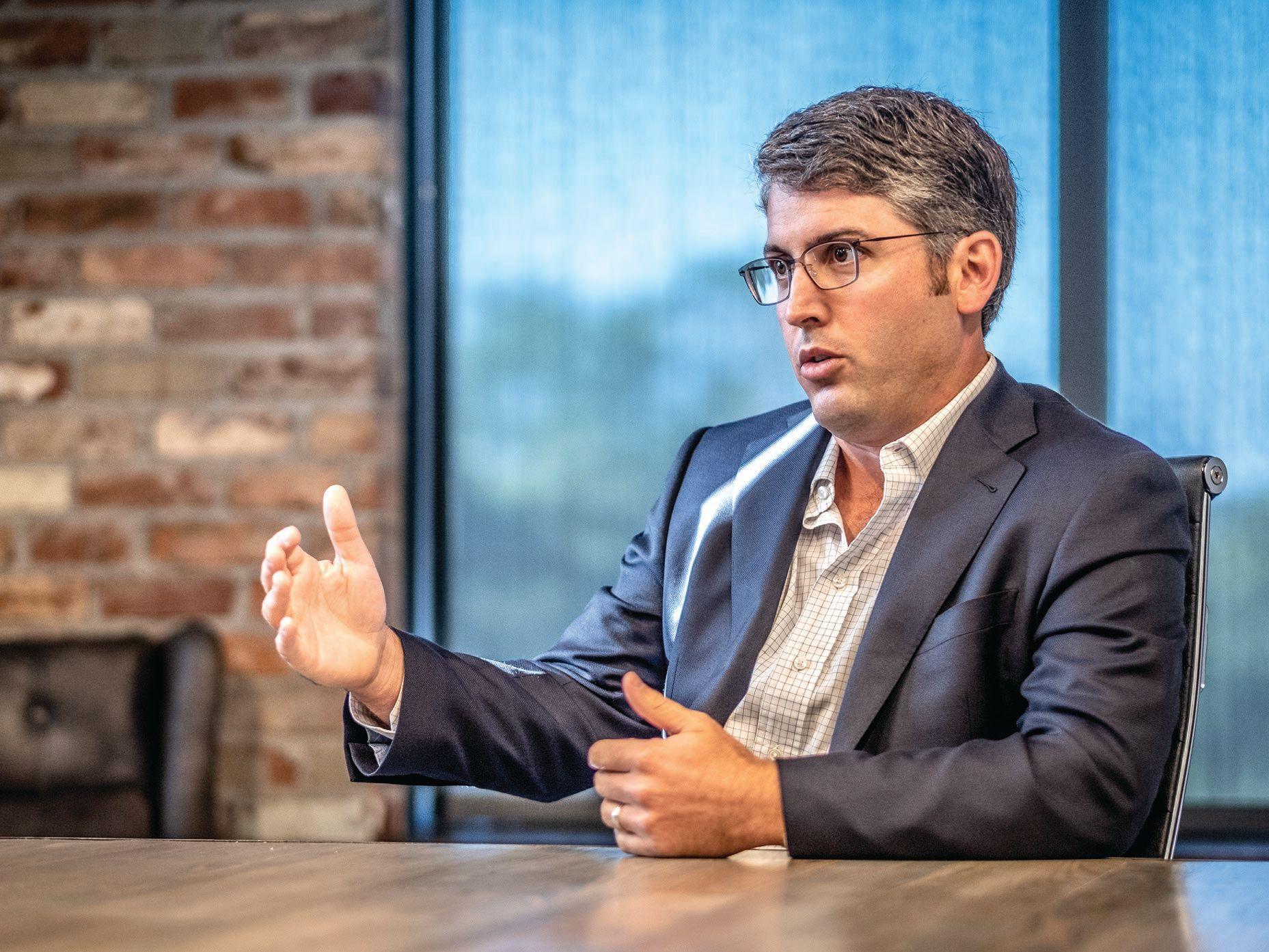
Fort Worth INC. borrows from its sister magazine and launches a Dream Office project with one of the city’s most happening developers and a pack of the finest vendors.
BY SCOTT NISHIMURA
Fort Worth INC.’s inaugural Dream Office – under construction in the city’s West Side River District for the developer Fort Capital – draws its inspiration from the firm’s recently built headquarters building next door.
Fort Capital, developer of the River District, finished its two-story, 16,800-square-foot building in 2017 at Nursery Lane, south of White Settlement Road. The building, occupied by a complementary collection of businesses ranging from oil and gas to finance, law and construction, got to 100 percent full quickly, Chris Powers, Fort Capital’s CEO, said. “We’ve always been 100 percent,” Powers said. “I’ve never gotten more compliments.”
The second, larger building will follow the old industrial style of the first, and Fort Capital is on the hunt for tenants who will complement the ones in the first building. Fort Capital has put together regular programs, such as hosting building-wide meetings with people who can help tenants raise money. That’s
ultimately boosted motivation, connections, and deal flow, Powers said.
“The big amenity is the tenant base,” Powers said. “We can put together a roster of tenants that are better for being close to each other than they would being scattered across the city.”
“The big amenity is the tenant base. We can put together a roster of tenants that are better for being close to each other than they would being scattered across the city.”
The second building – three stories, 22,000 square feet – will feature the same 1800s-era interior brick salvaged from an old factory in South Carolina that the first building has. The exterior brick, like the first building, will be of a vintage style, Powers said.
- Chris Powers
Fort Capital is choosing a general contractor, likely in July. As in the long-running series of Dream Homes and Homes of Dreams put on by Fort Worth INC.’s sister publication, Fort Worth Magazine, Fort Capital’s general contractor will team with some of the area’s finest vendors to build a project with the latest design trends and amenities. The $3.6 million building, designed by The Beck Group, is scheduled to be complete by March 2019.
The first floor will be retail, potentially with a coffee shop and spa, two tenants Fort Capital is talking to, Powers said. The second floor, borrowing from the four successful executive suites Fort Capital put in its headquarters building, will feature suites ranging in size between 250 and 750 square feet, with common conference room, coffee bar and restrooms.
The third floor will be traditional office with suites. In total, Powers said the building will likely have 14 executive suites.
The fourth-floor rooftop will have a furnished outdoor, shaded and covered deck with views of the nearby Trinity River and downtown.
The building will feature the latest office amenities. Fort Capital is talking to a potential office product and technology vendor about whiteboards and lighting and furniture, Powers said. The common conference rooms will feature flat panels and presentation materials. The building will have advanced wireless technology and secure access to each floor, Powers said. Today’s office environment is critical in recruiting and retaining people, Powers said. As in retail and hospitality design, “the experience matters.”
Fort Capital also plans to provide mobile ameni-
ties, such as the car wash operator that serves the first building’s tenants each week. Other possibilities include dry cleaning and barber, Powers said.
The River District continues to grow up around the site, which Fort Capital intends to grow to include more office after the second building.
The 323-unit Elan apartment building was recently completed at White Settlement and Nursery Lane, and some of the 50 to 60 people who work in the office building live at Elan, Powers said. About 120 single-family homes have been built. Eighty townhomes are under development in the district. Fort Capital is selling a piece of land at Roberts Cut Off and White Settlement roads for another 320 planned apartments, Powers said. “For that office user, there’s plenty of housing options,” Powers said.
Restaurant and other service options are cropping up. Salsa Limón opened in the district a year ago. Heim Barbecue is opening a restaurant in the district this fall. Abundio’s Fit Society opened a year ago in the district.
Fort Capital also touts access to downtown, Interstate 30, and West Side country clubs. Tenants in the first office building are longtime friends of Powers who live largely on the West Side.

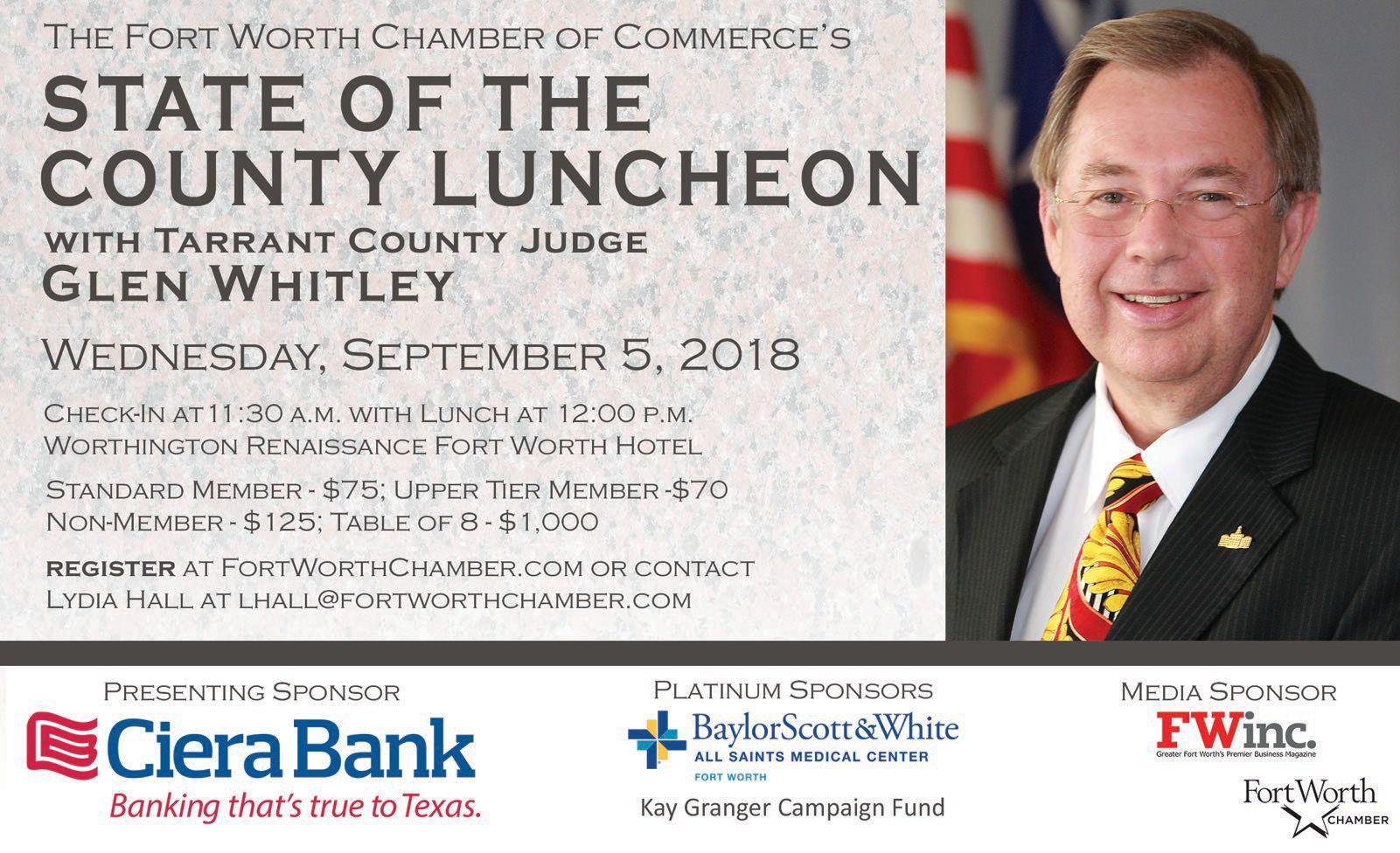
The Summer issue of Fort Worth HOME is on newsstands now.
Want to be one of the first to get the next issue of Fort Worth HOME? Subscribe to Fort Worth Magazine at fwtx.com/subscribe to receive both publications before they hit newsstands. Already a subscriber? Look for Fort Worth HOME in your mailbox.
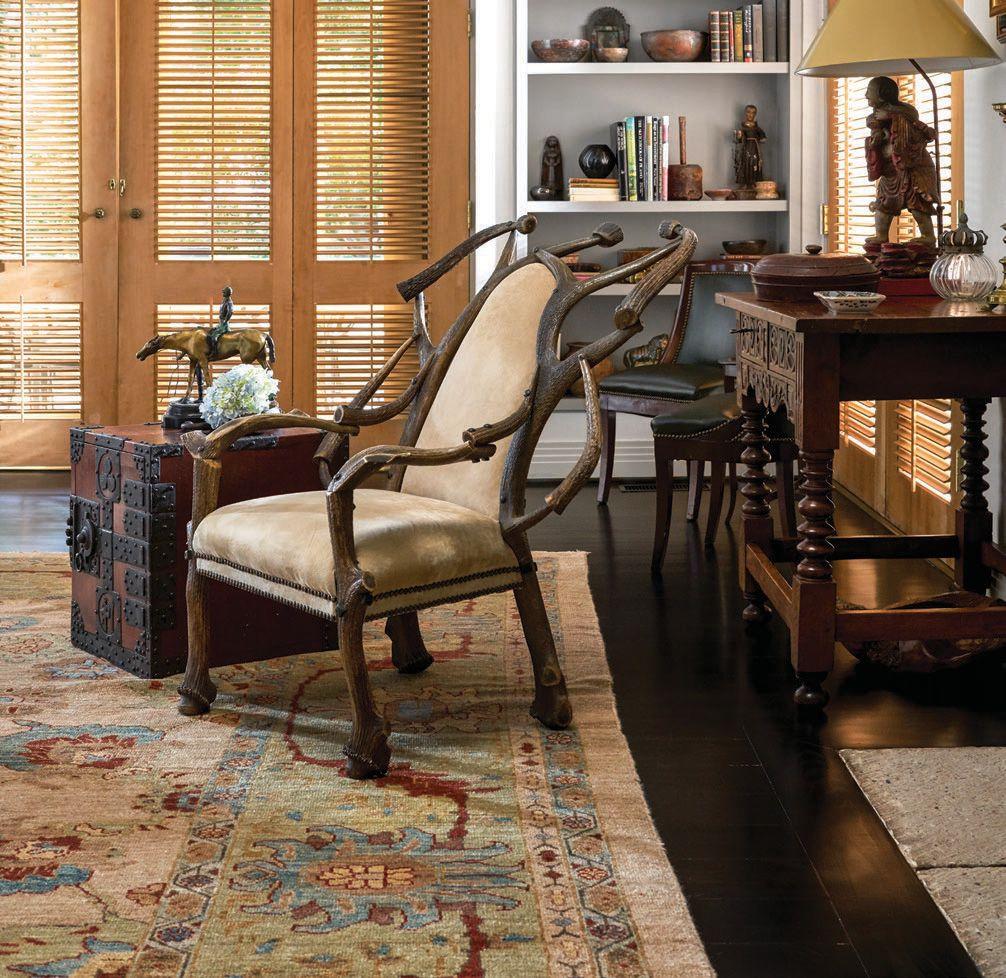






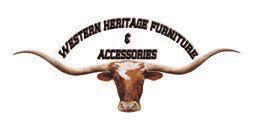
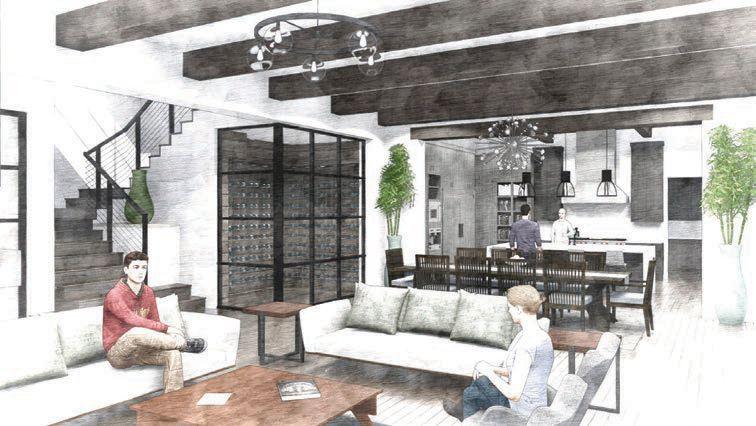
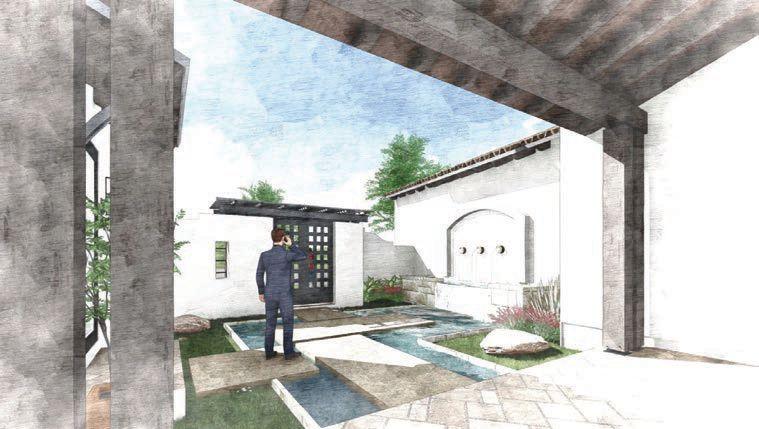
Ellerbe Fine Foods co-founder Richard King and partner Molly McCook brought the farm to your table. Now nearly 10 years in, they’re looking for new profit centers. Enter a Fort Worth sommelier you know.
BY SCOTT NISHIMURA / PHOTOGRAPHY BY OLAF GROWALD
Ellerbe Fine Foods, the creation of chef Molly McCook and longtime business partner and operator Richard King, celebrates its 10th year in business next year. The restaurant, its farm-to-table concept focused on foods purchased directly from local producers, made Bon Appetit’s 10 Best New Restaurants months after it opened on Fort Worth’s Near Southside. The magazine likened it to going home to dinner at your grandmother’s.
Not satisfied, McCook and King are adding new flavor to celebrate Ellerbe’s birthday. They’re going to give the West Magnolia Avenue restaurant a freshening, including new paint. And they’re expanding their wine offerings, hiring Kent & Co. sommelier Chester Cox this summer to augment the restaurant’s offering of wine dinners and expand into businesses like personal wine buying for retail customers and in-home events led by Cox. “We’re going to elevate our wine service in-store and outside,” King, a member of Fort Worth’s Entrepreneurs’ Organization chapter and the restaurant’s sommelier to this point, says.
Bon Appetit: “We got a really random phone call that there was [to be] a photo shoot, and you are going to be recognized in a national magazine. We were getting lots of [local] kudos. They came in for the photo shoot. We still didn’t know what it was.” Bon Appetit’s editor called later for an interview, but McCook and King thought it was for a blurb. “We found out a couple of weeks before it came out that we were Top 10 new restaurants. A lot of tears of joy. We’ve made our parents and our
partners very proud.”
Your parents were investors? “We didn’t want to go to the bank. Molly and I were of the attitude that if we used our own money and our parents’ money, we’d have a lot more passion. We paid our parents back in one year. Molly and I didn’t take hardly any pay until we got our parents paid back.”
High points: “We’ve had very little turnover in our company. We were able to alleviate some issues [in getting established] that way. Your guests notice.”
Challenges: “Our personal lives got involved. I lost my parents and my aunt and my grandmother all within 12 months. Molly lost a child [in pregnancy] as well. It really makes your partner step forward for you. We had to keep it going. And, competition. We definitely saw a drop in sales [from new restaurants on West Seventh Street]. We know that was another step in putting Fort Worth on the culinary map. And that puts us further down the road.”
Why Chester Cox: “We’ve been getting requests from customers” for expanded consumer events. “You’re going to have your own wine somm. Chester and I have been friends for a long time. His pedigree is outstanding.”
How about new restaurants? “Molly has been thinking about it. We both have two girls, so our family has come first the last several years. We were one of the first farmto-table restaurants in 2009. Now you see a lot of localvore movements.
Molly has that passion. I think she’ll be working on that. I’ll be working on the wine.”
Bringing the scalability EO preaches into their business: “We can’t grow the footprint of our restaurant. Catering is another option. Farm-to-table fine dining is a small niche for catering. Our catering business is there, but we can’t grow it considerably because of our philosophy and our evolving menu. So, there’s different profit centers [like wine], and that’s what we’re working on now.”
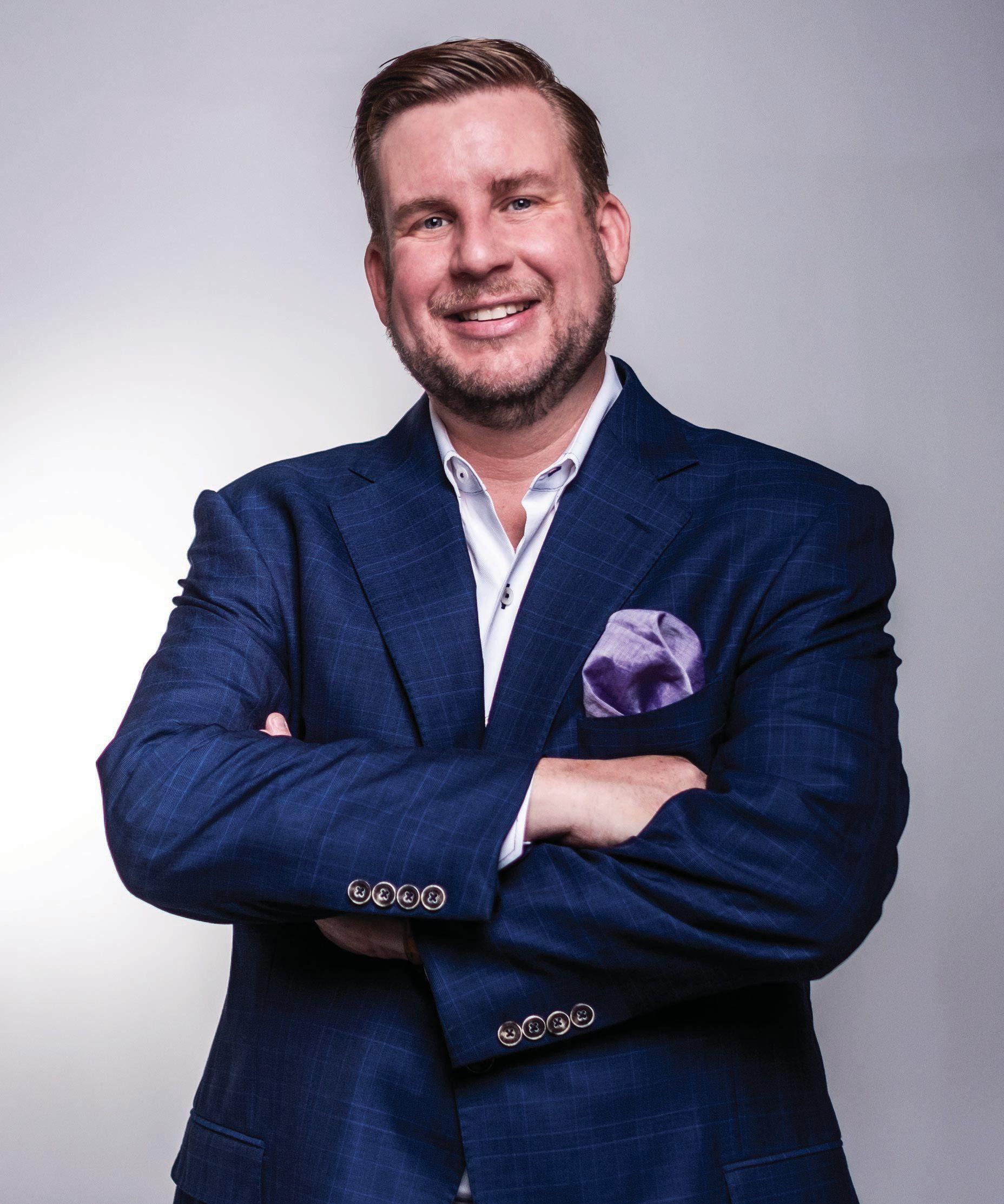
BY JASON FORREST Forrest Performance Group
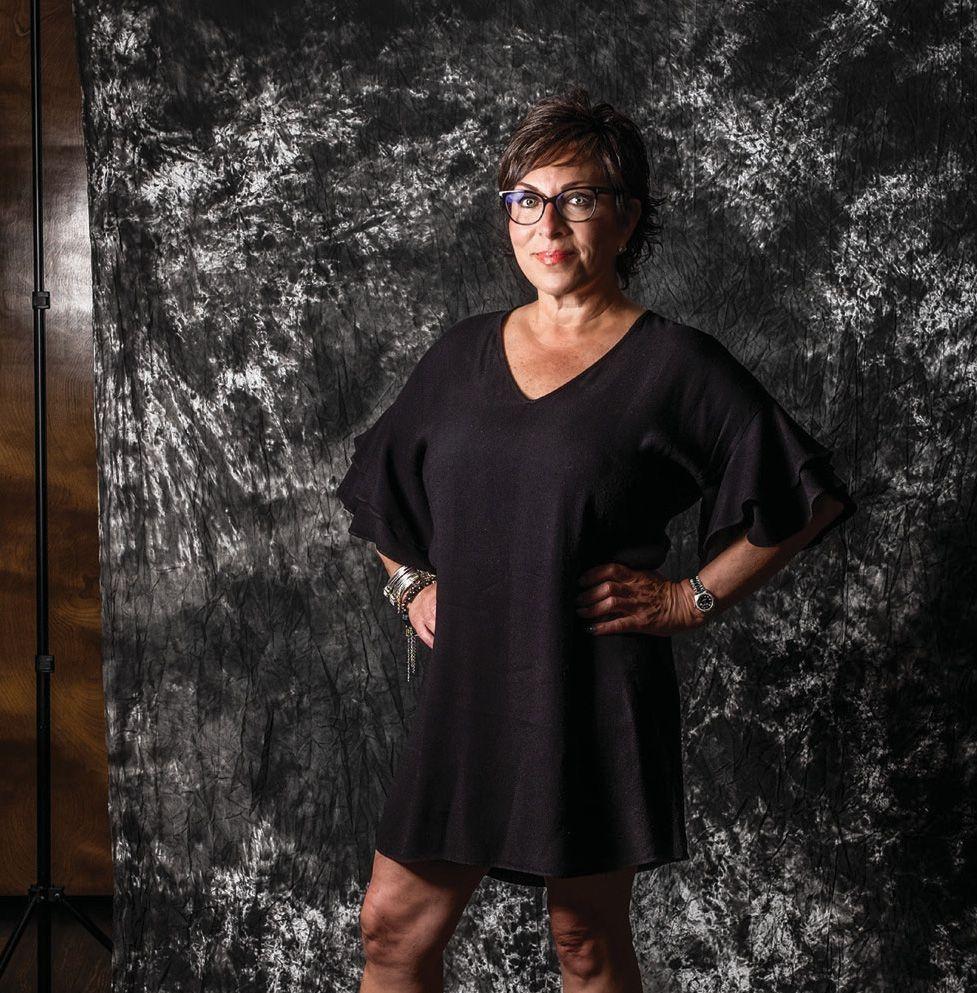

Sept. 30, 2011, presented Sandra Sedillo-McGlothlin with a run-toward-the-roar moment she will never forget.
The co-founder of Empire Roofing had been an integral part in building the Fort Worth-based company into one of the biggest and most profitable of its kind in the country. Since its foundation in 1982, when Sedillo-McGlothlin and her husband, Ronnie McGlothlin, founded the company from their kitchen table (the McGlothlins divorced 10 years ago but still run the company together), Empire Roofing grew to a $160 million company today with 700 employees spread across five states from $150,000.
All that resolve she’d helped build over three decades was tested on that dark day in September when Sedillo-McGlothlin was delivered the worst news of her career. A van carrying 11 Empire Roofing employees from a job site in Memphis slammed into an abandoned sweeper truck. Three died on-site, and a fourth died in the hospital a month later. Everyone in the van was injured.
Suddenly they were planning funerals and comforting bereaved loved ones, a reality they couldn’t have imagined even a day earlier.
“It took years and years for me to not cry about it every single time I thought about it,” Sedillo-McGlothlin says.
Knowing that the entire company was looking toward Empire’s leadership to see how they’d handle the situation, they opted to run toward it as opposed to running away from it. Empire Roofing went so far as to insist that two of the families sue the company to recoup their losses when their insurance companies denied their claims.
By running toward the roar of that moment, Sedillo-McGlothlin and her leadership team were able to rally the company and come out the other side stronger than they’d ever been. They took care of the families and their employees and turned that disaster into a moment of growth.
“They are our family,” Sedillo-Mc-
Glothlin says. “They are such a big part of us. Without them, we wouldn’t have our company. They had given a lot to us, and we just owed it to them to give back.”
Sometimes the safest place to be is the one that feels the scariest. Lions — with their intimidating teeth and deafening roars — are designed to provoke fear. But the real danger lies with the smaller, quieter lionesses. In the animal kingdom, the lion’s job is to roar and send prey scattering away from the startling noise — right into the path of the waiting lionesses, the true hunters. If gazelles knew to run toward the frightening sound, they would have a better chance of survival. The roar doesn’t represent the real danger.
Likewise, humans sometimes have an instinctive desire to shy away from pursuits that look and sound scary. But often, running toward those challenges and conflicts is the best (or only) way to grow and meet our goals. In business, those who run from the deafening noise never reach their full potential, while those who turn and face the fear thrive.
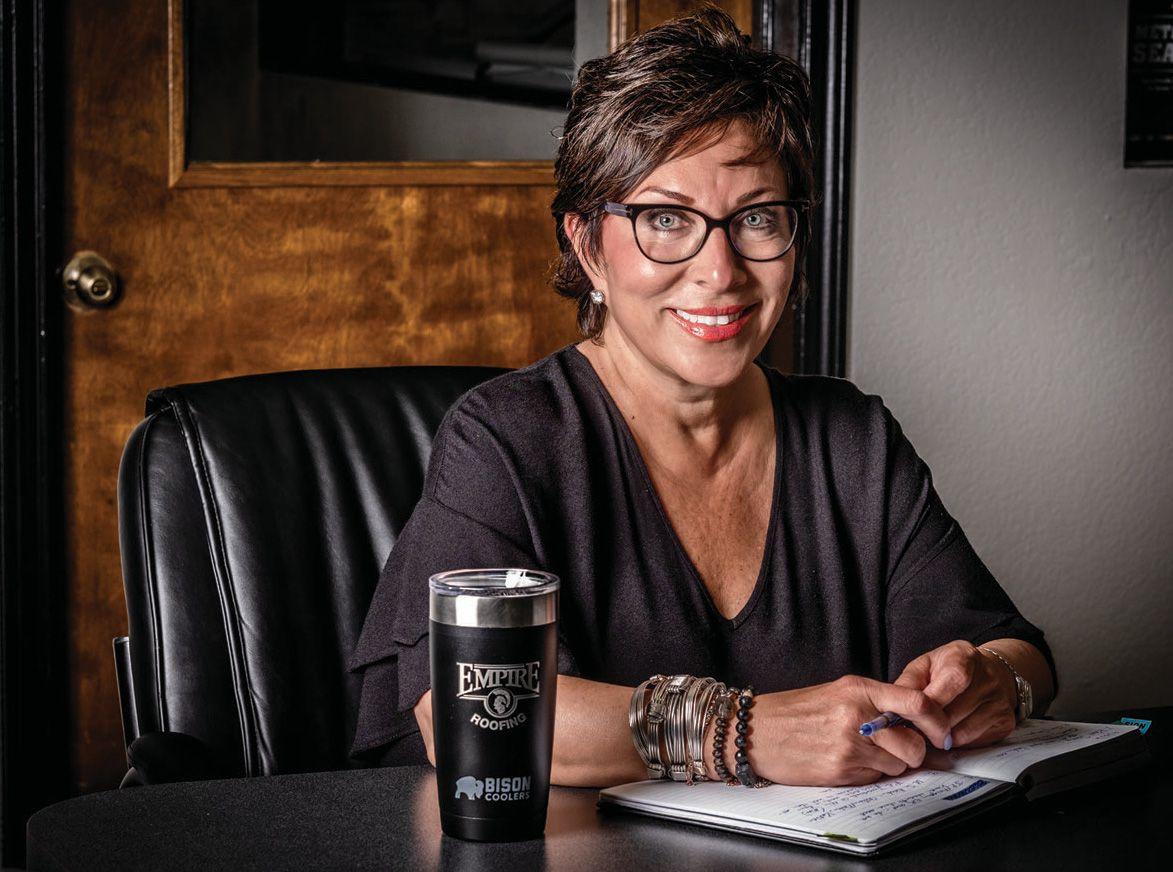
“It took years and years for me to not cry about it every single time I thought about it.”
– Sandra Sedillo-McGlothlin, on the deaths of four employees in an auto accident
That moment in 2011 wasn’t SedilloMcGlothlin’s only run-toward-the-roar moment. Like any entrepreneur, she’s encountered them at nearly every step of her company’s meteoric growth.
For the first 15 years of the company’s lifespan, Sedillo-McGlothlin and her husband lived on about $1,000 per week for their entire household income when they could’ve drawn much more into their paycheck. Living on thinner margins allowed them to inject that money back into their company so they could continue growing it from the bottom up, even if it had its struggles at the time. It also allowed them to navigate the tough, uncertain early years when they’d sometimes go six months at a time without getting paid for a job.
That allowed them to go from eight
employees often making decisions crowded around a single table to the 700 they have now scattered across the country. Such is the speed of the growth that Empire Roofing also plans to open up locations in two additional states by the end of this year.
Another moment was her divorce after 25 years in the business together.
“That was hard for our children and for our whole business, wondering, what’s going to happen? What’s going to happen to me?” Sedillo-McGlothlin said. “Is the business going to stay? Are both of them going to stay here and work and take care of it like they’ve always taken care of it?”
They took the process slowly, made sure their employees and clients were comfortable and then made the decision public. Today, the two are still part of a three-team executive group that also includes director of sales Matthew Kelley, and she says their leadership group is as strong as ever.
“It worked out just fine,” Sedillo-McGlothlin said. “And we’ve been working together for another 10 years.”
As Empire Roofing continues to grow, there will no doubt be more run-towardthe-roar moments in its future. Judging by her past, that’s just fine with SedilloMcGlothlin.
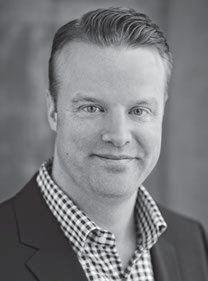
Jason Forrest is CEO of Forrest Performance Group, a global leader and designer of sales, management and corporate training programs. The company has made the Inc. 5000 list of fastest-growing U.S. companies two years in a row. Forrest grew up under the influence of his father, a business owner and professional salesman, and mother, a persuasive speaking professor. He writes this column for each issue of Fort Worth INC.
Behind explosive population growth, higher crude prices, and higher standards of living, several Texas cities, including Fort Worth, make list of most prosperous U.S. cities.

What’s it take to be one of America’s most prosperous cities? The RENTCafe blog applied several measures – changes in population, income levels, home values, residents with higher education degrees, poverty and unemployment – to cities nationally for the 2000-2016 period.
The result: Odessa, its fortunes driven by surging crude oil prices, made the list at No. 1. Three other Texas cities – Pearland, Brownsville and Midland – also made the top 10. Filtered just for cities with 300,000 population or more, Fort Worth made that list, at No. 4, behind Washington, D.C.; Miami, Florida; and
New York, and in front of Seattle, El Paso, Los Angeles, Baltimore, Boston and Denver.
RENTCafe noted the 50 percent increase in crude prices during the study period. “That is a staggering growth, especially considering that production figures had been plummeting in the first half of these 17 years, and after bottoming out in 2008, it only took 7 years for the U.S. oil industry to not only recover, but even come within a hair’s breadth to repeating its all-time high recorded in 1970,” the blog said.
RENTCafe looked 303 cities with populations of at least 100,000, giving a final ranking based on the combined
value of cities’ individual ranks in the six fields.
Odessa’s impressive stat line: 25 percent population increase, 38 percent jump in median household income, 91 percent increase in home values, 26 percent increase in share of population holding a bachelor’s degree or higher, 36 percent drop in poverty and 24 percent drop in unemployment.
Pearland, Brownsville and Midland were generally strong across the board, with little weakness: Pearland’s 14 percent increase in unemployment rate; Brownsville’s zero percent change in income, Midland’s zero percent change in higher education acquisition.
The complete ranking of the 10 most prosperous cities after Odessa: Washington, D.C.; Charleston, S.C.; Fontana, Calif.; North Charleston, S.C.; Jersey City, N.J.; Pearland; Miami, Fla.; Brownsville and Midland.
Fort Worth’s stats: 52 percent increase in population; 5 percent increase in income; 34 percent increase in home values; 24 percent increase in higher education attainment; 13 percent increase in poverty rate; and 7 percent increase in unemployment rate.
Only 11 cities in the entire survey had positive changes in all six categories, RENTCafe pointed out. “If we were to eliminate all cities from the analysis that registered a decline in [any] of the six indicators, it would have left us with only 11 cities – rendering it pointless to set up even a top 10 list,” RENTCafe said.
Those cities: Odessa; Washington, D.C.; Charleston, S.C.; Brownsville; Midland; New York; Los Angeles; Billings, Mont.; Long Beach, Calif.; Atlanta; and Corpus Christi.
Not all cities that fared extremely well in certain individual categories ranked highly, RENTCafe said, citing the example of West Texas’ Abilene and its significant improvement in unemployment.






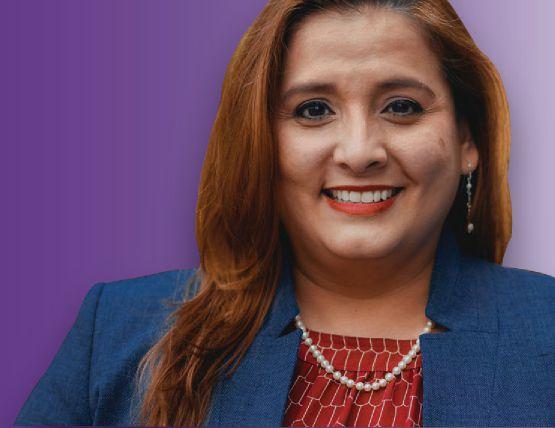

As a Dallas Skyline graduate looking for a university, Monica was impressed by Tarleton’s smaller class sizes and the willingness of faculty members to help her achieve her personal educational goals. The dean’s list student and cum laude graduate credits her instructors with teaching lessons she uses daily. With her business degree, Monica cultivated her organizational skills and professional communications for success, recently winning promotion to CFO. She now oversees all the transit authority’s budgeting, financial planning, investments and general accounting.
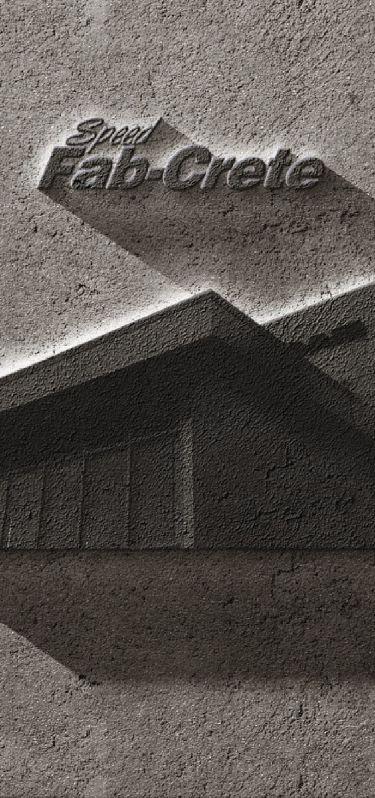
Small businesses and entrepreneurs don’t have 401(k)s. But they have access to various tools they can use to help prepare for retirement.

best for
“Small business owners have to do it on their own, and many aren’t preparing properly,” says Troy Bender, CEO of Asset Retention Insurance Services. “Many feel like they will never make it, but they can. The idea is to simply start.”
Five ways small business owners can prepare, Bender says:
Decide how much to save each month. Try 15 percent of your pay per
month. If that seems too much at first, you might ease into it. “To begin, you may start with 5 percent and then ramp up 2 to 3 [percentage points] each year,” Bender says. An employee who has a 401(k) can contribute up to $18,500 of their salary for 2018 if they’re less than 50 years old. People older than 50 can save $24,500 a year in their 401(k). “A good goal is to try to match these amounts annually,” Bender says.
Consider a SEP IRA. As defined by the Internal Revenue Service, a Simplified
Employee Pension plan provides business owners with a method to contribute toward their employees’ retirement and their own retirement savings. “It doesn’t have the startup and operating costs of a conventional 401(k) or profit-sharing employee plan,” Bender says. “Your business pays no taxes on annual earnings as it grows tax-deferred.”
Be conservative. “Retirement accounts that offer the highest return may seem ideal, but a business owner who goes down this path can be easily overwhelmed and stressed,” Bender says. “As a business owner, you generally already have enough stress, which can manifest in so many ways. A basic rule to follow is known as the Rule of 100.” Subtract your age from 100, and what remains is the percentage of your portfolio you put into investments with some risk. If you’re 50, then 50 percent of your assets would be at risk – say, equities – and 50 percent would be allocated in low-risk investments.
Buy life insurance. A small business owner who has a family should have several times their annual net income in life insurance, financial advisers say. Bender recommends 10 times. “The life insurance can be set up to provide a tax-free income in the future, too, that a small business owner can draw from,” Bender says.
Like having life insurance to provide financial help for your family when you pass away, a small business owner may want to consider “key person insurance.” The death benefit helps ensure continuity of the business for its employees and customers if a key person dies.
“You need to save for the necessity stream as well as the discretionary stream,” Bender says. “You should get the basics down and really look at covering your lifestyle, so you can look back and smile from the thousands of hours you worked owning a business.”
Close your next deal at one of these business-friendly bistros.
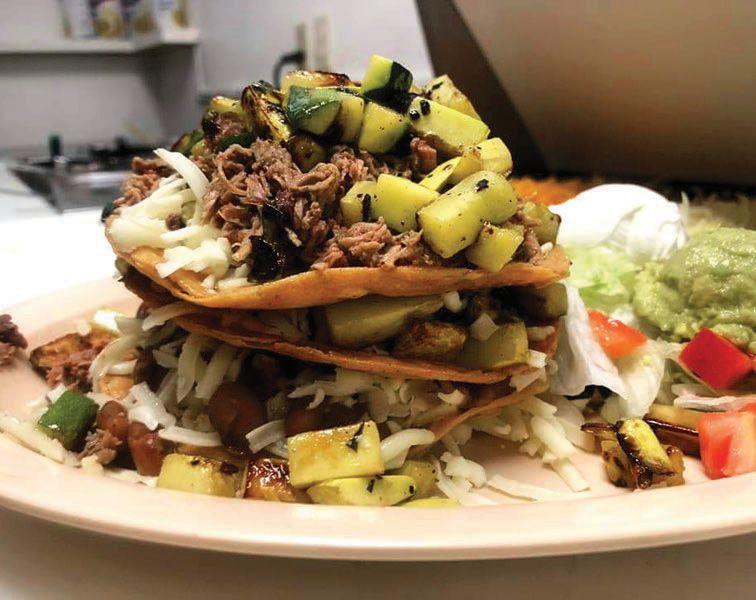



Enchiladas Ole
901 North Sylvania Ave., 817.984.1360, enchiladasole.com
A healthy twist on TEX-MEX, Enchiladas Ole doesn’t serve leftovers, and our lovingly prepared cuisine comes from our familia to yours with no preservatives, no additives, and no lard! We prepare every meal with fresh, authentic ingredients daily, "the way I remember making enchiladas with my mother." We use healthy spices in every dish, including garlic, curry, and turmeric. To make the tortillas flexible, grill our vegetables, and refry our beans, we only use olive oil and water. It's no wonder why our food has been labeled by numerous major food critics as the “cleanest Mexican food around.” We prepare every meal with fresh, authentic ingredients daily. Voted by USA Today as one of the Top 10 Best Tex-Mex restaurants in Texas.
Chamber of Commerce team takes the stage for amped-up economic development initiatives.
BY BRANDOM GENGELBACH
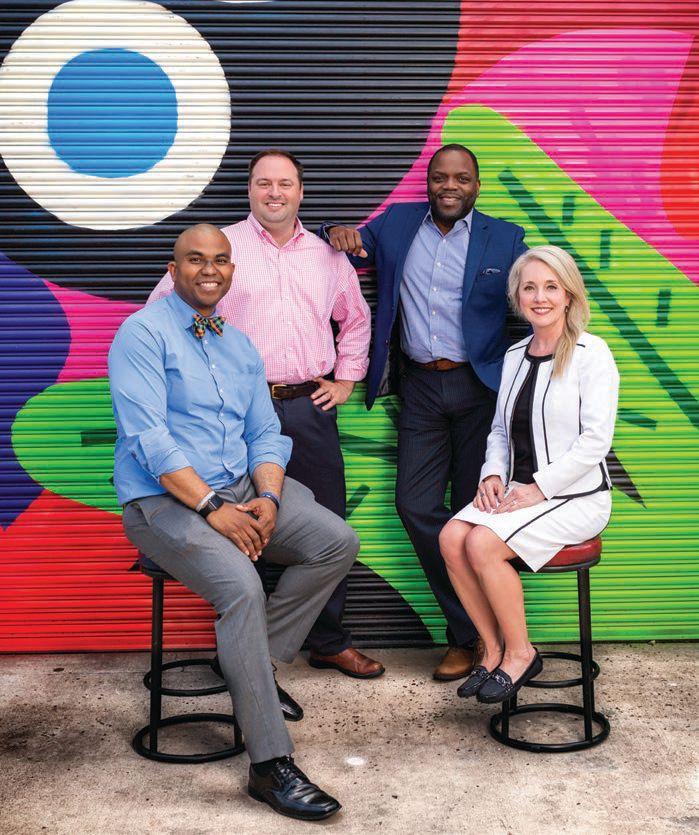
I’d like to introduce you to four rock stars – the Chamber’s new senior management team driving its four-year strategic plan, Fortify.
I call them rock stars because they’re masters of impact via high-energy performance with powerful results. They bring exceptional depth of experience, expertise and commitment to helping the Fort Worth region and
North Texas excel in responding to rapid growth, intense competition and new dynamics in the global business environment.
Here’s a quick look at what attracted them to Fortify and what they see ahead: Chris Strayer, senior vice president of business attraction, retention and expansion: “When I first started looking at this opportunity, I sensed so much excitement in community and knew there is something special happening here. Who doesn’t want to be part of opportunity like that? Three months into the job, as I learn more about the region every day, Fort Worth has so many assets in its portfolio. I think job No. 1 is we need to raise the visibility and awareness of Fort Worth to our nation and the world. Also, we’re going to be much more proactive with messaging to targeted industries about doing business in the Fort Worth region.”
Jarred Howard, senior vice president of small business and entrepreneur support: “As a fifth generation native of Fort Worth, the opportunity to contribute to the continued evolution of the city is more than professional, it’s personal. In this role, I can leverage my skills and talents in an area that I have a particularly strong affinity for. My goal is to position the Chamber as the authority for every small business in the region. If we can’t provide the tools and resources that our stake-
holders need to be successful, we’ll direct them to the people and places that can.”
Rebecca Montgomery, senior vice president of advocacy: “My interest in joining the chamber originates from growing up in a community with a strong chamber presence. It is exciting to be a part of an organization with such a vital role within its community. I envision engaging more of the local business community – both in numbers and including a broader diversity of industry sectors – in shaping public policy that helps support the economic vibrancy and quality of life of the Fort Worth region with sound, progrowth business policy.”
Dr. Anthony Edwards, senior vice president of talent development, retention and attraction: “I became interested in the position after reading Fortify, the Fort Worth Chamber of Commerce Strategic Plan. My vision involves engaging businesses, educational entities, governments, and the community to develop, attract and retain a quality workforce for current and future economic growth. We will support talent development in Fort Worth through an industry demand-driven approach, support regional ISDs with college/career readiness initiatives, identify top talent challenges through a report card, promote the Fort Worth region as a talent destination, and achieve annual quality of place goals around poverty.”
To learn more about Fortify, call 817-3383390 or go to FortWorthChamber.com/ Fortify
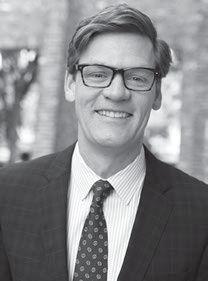
Brandom Gengelbach is the Fort Worth Chamber of Commerce’s executive vice president of economic development. He writes this column for each issue of Fort Worth INC.
Close your next deal at one of these business-friendly bistros.
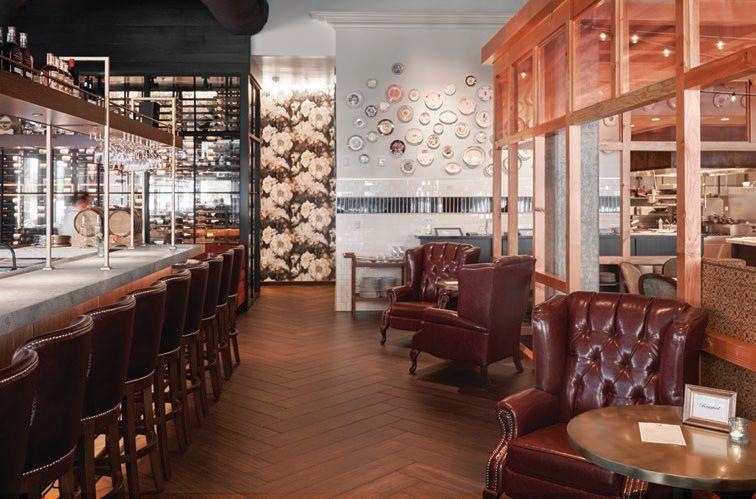
Located in The Shops at Clearfork, 682.707.3965 fixesouthernhouse.com
Join us in celebrating the Soul of the South with Sunday Supper every day of the week! Louisiana native Chef James Robert and his team pay homage to his roots with an eye to tradition, a commitment to quality and passion to deliver our guests an unexpected and memorable culinary experience.
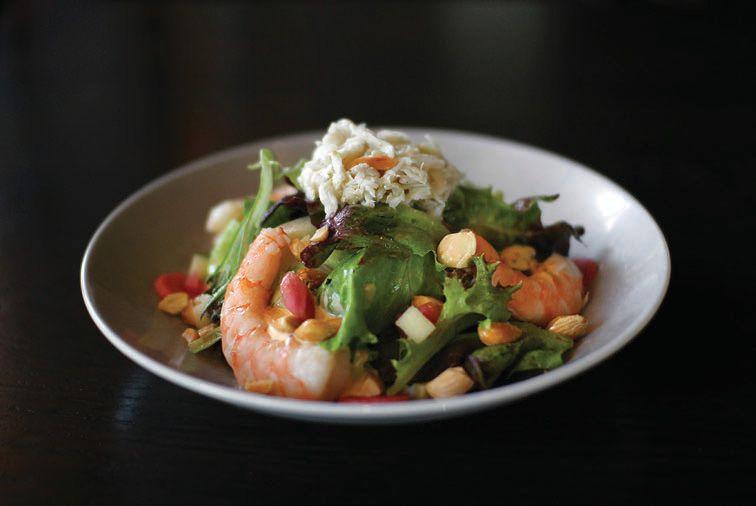
Open for Lunch daily 11 a.m.-2 p.m., we are a short drive from downtown with plenty of complimentary parking. Our award-winning dining room design allows for a comfortable experience with low noise levels, perfect for relaxing or conducting your most important business meetings. Reservations available at fixesouthernhouse.com.
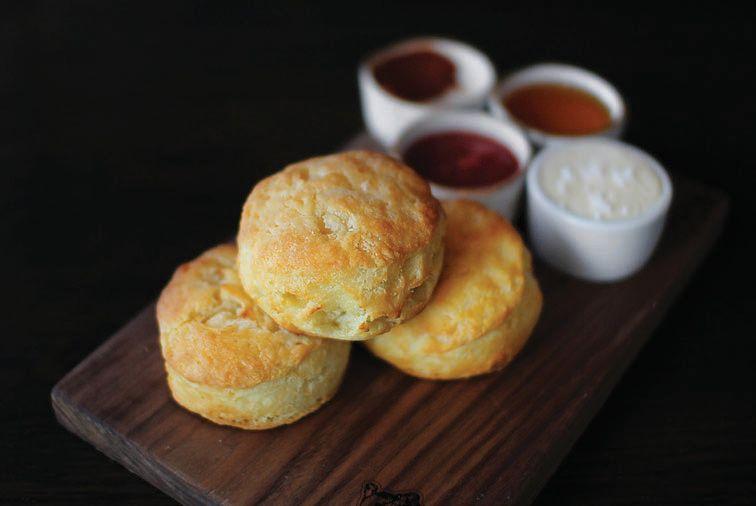
Enjoy our world-famous biscuits baked to order for your table during Dinner or Brunch. Each order is served with Steen’s 100 percent pure-cane syrup butter. Add our homemade seasonal fruit preserves, N’duja sausage spread, or Good Flow Texas Honey for next level enjoyment!

Allow us to plan your most important events from 10 to 200 guests. Fixe offers three private dining rooms fully equipped with 70-inch screens for your presentation needs. We also have several semi-private spaces, or you may reserve the entire restaurant! Mention our ad and receive a $100 gift card for contracting your private dining event before Aug. 31, 2018.
The U.S. is the world’s largest oil and gas consumer and now the world’s largest producer. Old rules no longer apply.
BY ERIC C. CAMP Of Counsel
The U.S. has always been the world’s largest oil and gas consumer, but its role as a producer has changed over time. From 1970 through 2008, U.S. oil production declined by almost half, to five million barrels a day from more than nine million, all while U.S. oil consumption increased. This imbalance made the U.S. more and more dependent on imported oil and gas. Geopolitical events that threatened international oil and gas production led to price spikes, out of fear that the import demand would not be met. OPEC, through supply increases and decreases, largely dictated international oil prices.
In the early 2000s, the talk was about how the world’s daily oil production of oil had peaked. Fearing domestic natural gas demands would not be met, companies invested billions to build LNG import facilities.
The U.S. “shale revolution” then changed the game. From 2005 through 2017, our annual gas production increased almost 50 percent from 18 TCF to 26.8 TCF. Then, 2008 through 2017, U.S. annual oil production increased almost 90 percent — to 3.4 billion barrels from 1.8.
No longer were oil and gas imports as necessary to meet our demand. To alleviate the sudden oversupply issues, companies here converted LNG import facilities to export facilities, with the government making it easier to export oil and gas.

Make no mistake, however. Oil and gas prices are fundamentally driven by supply and demand. While the U.S. drastically increased production earlier this decade, OPEC and Russia refused to decrease their production and cede market share to U.S. producers. Beginning in summer 2014, oil prices plummeted to $30 per barrel from over $100. Something needed to happen on the supply or demand side, or both, to raise the price of oil. Would demand increase? Yes, but not substantially or fast enough to lead to a quick recovery.
Would U.S. producers slow their production? Yes, to an extent. The U.S. is unique in that, with the exception of state and federal lands, private individuals own their minerals and contract directly with exploration companies to produce them. Unlike most countries, our government does not own most of the minerals, nor does it have the power to order an immediate production curtailment. That decision rests with the operators. Whether to pay creditors or show its investors constantly increasing production, they face significant pressures to keep producing more and drill wells to hold leases.
Would OPEC and Russia curtail production? Yes, eventually, once the price got very low. Some believe OPEC waited so long in order to hurt U.S. shale producers, because we require higher oil and gas prices to be profitable. Perhaps that is true. Many producers did go bankrupt, but those that survived also learned how to efficiently lower their production costs.
Ultimately, this price recovery resulted in increased demand, OPEC and Russia production cuts, and U.S. drilling cutbacks. But with the price recovery, we’re again seeing a lot of drilling in shale fields, especially the Permian Basin.
We are now the world’s swing producer — quickly increasing production when prices are high and decreasing production when prices are low. While the future is difficult to predict, it’s important to recognize that because of the shale revolution, U.S. producers collectively now have a major impact on global oil and gas supplies and, therefore, prices.
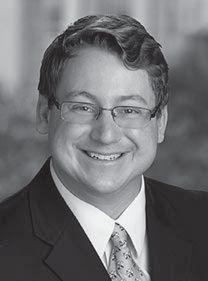
Close your next deal at one of these business-friendly bistros.
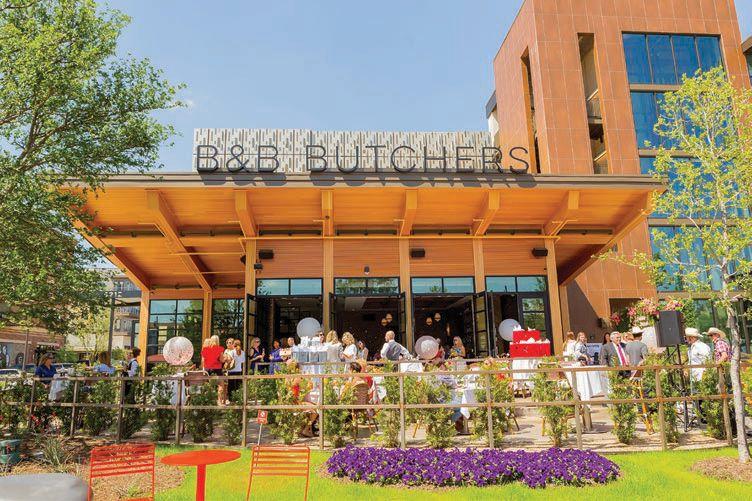
The Shops at Clearfork, 5212 Marathon Ave., 817.737.5212
Butcher Shop: 817.731.5360, bbbutchers.com/fortworth
B&B is Fort Worth’s only upscale steakhouse and traditional butcher shop specializing in high-quality meats and elevated customer service. Our menu includes 100 percent authentic, A5 certified Kobe beef, the finest Texas and Japanese Wagyu beef, as well as in-house 28-day and 55-day dry-aged USDA Prime beef – all hand cut in the Butcher Shop.
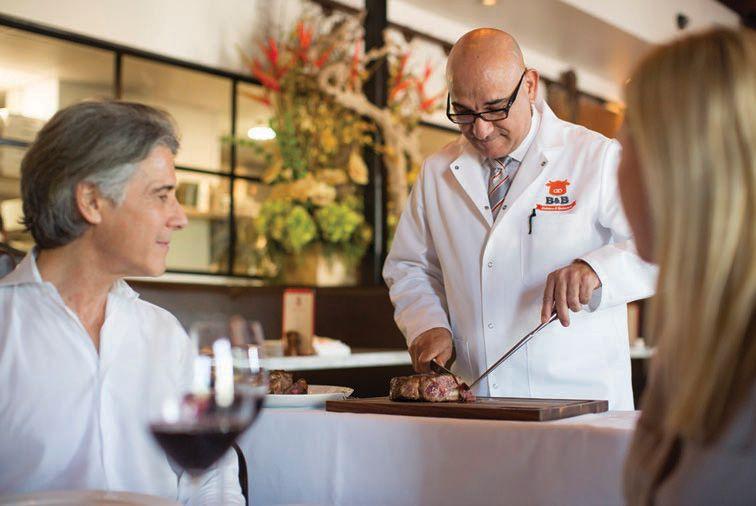
An exclusive, 12-course meat tasting and wine pairing in the Butcher Shop, guests have the rare opportunity to taste and compare the flavor components of our exclusive cellar cuts while learning about the meat and the dry-aging process. Plus, wine enthusiasts will enjoy a handpicked variety masterfully paired with each cut by the sommelier.
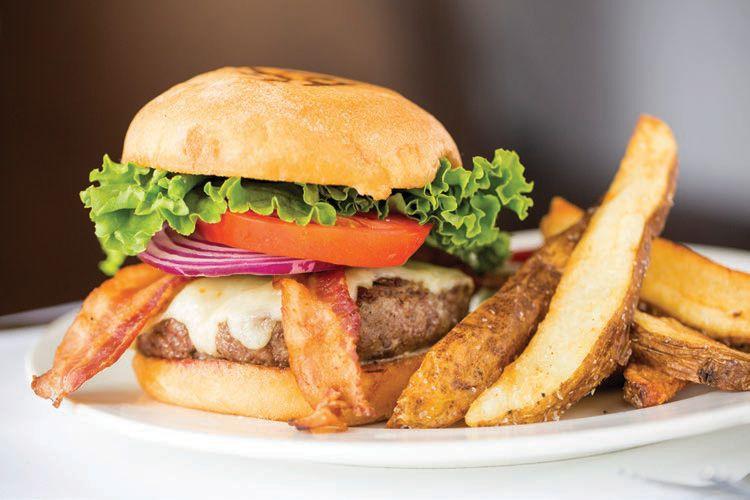
The lunch menu, which is a delightful recess from the dinner menu, includes hamburgers, meat-driven pastas, pizzas, salads and sandwiches along with noteworthy dishes like a Bone-In Chopped Steak and Wagyu Skirt Steak Frites. Not in the mood for meat? Our lunch and dinner menus offer fresh and noteworthy seafood dishes along with vegetarian options.

We have five unique and premier private dining spaces that are ideal for your next celebration or office gathering. Our private events coordinator will take personal care of your custom-printed menus, specially tailored wine pairings, floral decoration, musical entertainment and more.
BY KELLY HEIN Tax Partner
and Advisors, Fort Worth Office
Here’s how the Tax Cuts and Jobs Act, one of the most significant revisions to the federal tax code in more than 30 years, affects you.
Business tax reduction was the centerpiece of the new tax law. The first four provisions listed below are designed to generate substantial tax savings and encourage capital expenditures. Other provisions limit or repeal certain deductions.
Corporate Tax Rate: The law provides a 21 percent flat rate effective for tax years beginning after Dec. 31, 2017. For C corporations with substantial taxable income, this compares to the old 35 percent rate.
Pass-Through Business Deduction: The law provides a deduction of 20 percent of domestic qualified business income from a partnership, S corporation or sole proprietorship. QBI doesn’t include reasonable compensation to an S corporation shareholder or guaranteed payments to partners. Two limitations apply, starting when the owner’s taxable income exceeds $157,500 for single filers ($315,000 married filing jointly). The deduction is limited to the greater of 50 percent of W-2 wages paid with respect to the business or 25 percent of W-2 wages paid plus 2.5 percent of the unadjusted basis, immediately after acquisition, of all qualified property. The deduction also isn’t allowed for speci-
fied service trade or businesses once the owner’s income exceeds certain threshold amounts, indexed for inflation.
Full and Immediate Capital Asset Expensing: The law expands bonus depreciation and expensing limitations. The eligible bonus percentage increases to 100 percent for qualified property placed in service after Sept. 27, 2017, and before Dec. 31, 2022. For bonus depreciation purposes, the law expands the definition of “qualified property” to include used. The law also provides for $1 million of assets to be expensed beginning in 2018, with a phaseout amount of $2.5 million.
Corporate AMT: Repealed; remaining carryforwards recognized over four years.
Excess Loss Limitation: The law limits nonpassive losses from a pass-through entity that an individual may deduct to $250,000 for single filers ($500,000 married, filing jointly). Any excess loss is treated as part of the taxpayer’s net operating loss carryforward to subsequent years.
Net Business Interest Expense: For certain businesses, interest expense deductions are now limited to 30 percent of the entity’s adjusted taxable income. Any excess is eligible for carryover indefinitely.
Other Notable Provisions:
• Deduction for entertainment, amusement or recreation activities is repealed; the deduction for qualified meal expenses will remain, subject to the same 50 percent limitation.
• Net operating loss carryovers are limited to 80 percent of the taxpayer’s taxable income for losses arising in tax years beginning after Dec. 31, 2017.
• Domestic production activities deduction was repealed after Dec. 31, 2017.
Individual Rates on Ordinary Income: The current seven bracket structure was retained, with new rates of 10, 12, 22, 24, 32, 35 and 37 percent (from 10, 15, 25, 28, 33, 35 and 39.6 percent). The tax brackets will be adjusted for inflation.
Individual Alternative Minimum Tax: Retained, with increased exemption amounts of $70,300 for single filers ($109,400 married, filing jointly). The law increases phase-out amounts of this increased exemption to $500,000 for single filers ($1 million married, filing jointly).
Standard Deduction: The law nearly doubles the standard deduction for single and married filers to $12,000 and $24,000.
Personal Exemption: The personal exemption is consolidated into the larger standard deduction.
Child Tax Credit: Increased to $2,000. The law increases the credit’s phase-out limit to begin at $200,000 for single filers ($400,000 married, filing jointly).
Individual Mandate: The law removes the individual shared responsibility payment under the Affordable Care Act, decreasing this to zero after Dec. 31, 2018. State and Local Income, Real Estate and Personal Property Tax Expense: Deductions for SALT not paid or accrued in a trade or business and combined and capped at $10,000.
Home Mortgage Interest Expense:
Deduction for home mortgage interest expense for mortgages after Dec. 15, 2017, is limited to interest paid on the first $750,000 of indebtedness. No deduction allowed for interest paid on home equity loans effective Jan. 1, 2018.
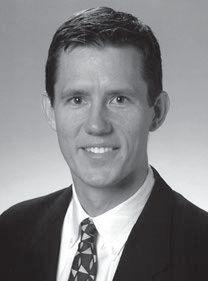
Kelly Hein is a tax partner in the Fort Worth office of BKD CPAs and Advisors. He’s writing this column for the Fort Worth CPAs, a regular contributor to Fort Worth INC.

1509 S. University Drive, 817.336.0311 olsouthpancakehouse.com
Ol’ South Pancake House is where the entire family can enjoy Southern homestyle cooking at any time of the day or night. Signature dishes have kept our guests coming back for more, with our most popular World Famous German Pancakes being served over 40,000 times each year to our loyal customers.

829 Lamar Blvd. East, Arlington, 817.265.9174 piccolomondo.com
Piccolo Mondo Italian Restaurant was established over 34 years ago and is known as one of the most popular and famous Italian restaurants in the metroplex. Appealing and satisfying Italian continental fare features shellfish, salmon, veal, gnocchi & pasta. The restaurant also has a piano bar and a banquet room.

813 Main St., 817.348.0080 ruthschris.com
Trust that your summer event will be the hit of the season. Summer booking incentive: receive a $50 bonus for every $500 spent on your private dining or catered event. Date restrictions apply. See ruthschris.com/promotions/summer-booking-incentive for details.
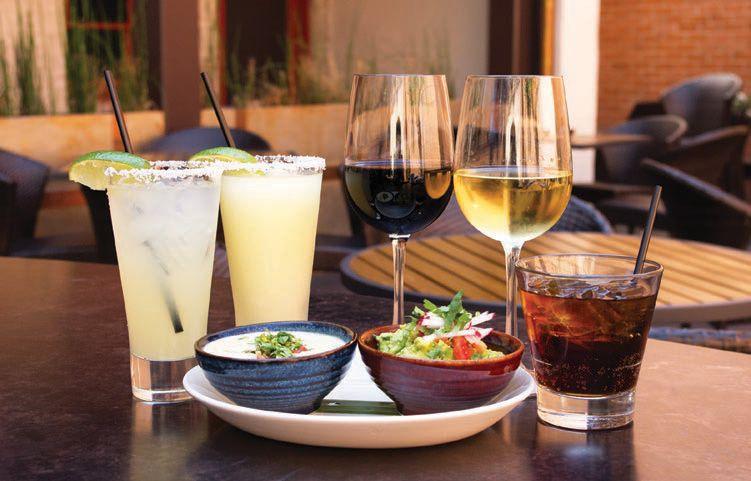
Both locations are open for weekday Lunch and
Break down your blocks to learning to become unhindered in your life.
BY CHRISTIE M. ECKLER Development Director UT-Arlington College of Science

The U.S. Navy SEALs have a saying: “Get comfortable being uncomfortable.” When are we uncomfortable? Often, it’s when we’re in a growth mindset. We have all heard of the need for a personal growth mindset, but we first need to spend some time considering why we’re resistant to it and what it means in our journey.
I am a firm believer in Dr. Carol Dweck’s research on “growth mindset” and the power of believing you can improve. I also understand the “fixed mindset.” Not because I have one, but because I have interacted with a lot of people who do. Some people need the fixed mindset to survive in the same way someone like me has needed a growth mindset to survive my circumstances and evolve.
Even the most poorly delivered feedback has something you can learn from. To gain what Dr. Dweck calls “the power of yet,” we
must first understand how someone came to have a fixed mindset. This understanding can help you motivate someone, so they can start embracing challenges and unlocking their personal purpose.
A fixed mindset might come from fear. You might be risk-averse because your world was not safe at one time. Or it could be you were rewarded for the status quo mindset. If you are going to help someone move forward, you must validate this fear. I have found highly successful people can have a fixed mindset and not realize their potential. Success or perceived success can cause complacency.
“In a fixed mindset, people believe their qualities are fixed traits and therefore cannot change,” Dr. Dweck says. “These people document their intelligence and talents rather than working to develop and improve them. They also believe that
talent alone leads to success, and effort is not required.”
How many of us have had a boss or known a leader who knew their abilities and weaknesses and accepted those weaknesses as unmoving traits?
We can go beyond this process and allow our weaknesses to become our strengths if we adopt a growth mindset and act as a sponge for feedback. I teach my social work graduate students to be sponges to feedback even if that feedback is not given in the most constructive way.
I appreciate how hard it is to receive feedback from others. I can also tell you it is one of the most important things you can [do] if you want to improve and be a sought-out thought leader in your industry and community.
My antidote for challenging yourself to adopt a growth mindset is to recognize feedback in all forms. Figure out how you best review and absorb feedback. This might be a specific task you set for yourself related to the feedback or a plan for reflection.
You must also recognize the roadblocks you put up in receiving feedback. Do you tell yourself things like, “they don’t know me or my work” or “they are mad and taking it out on me”? Additionally, thank people for taking the time to give you the feedback.
To become unhindered in your life, you must check your biases and fixed mindsets. And what about those grad students who begrudgingly took feedback from professionals helping to mold them? They now sign their correspondence to me “Forever the sponge.”
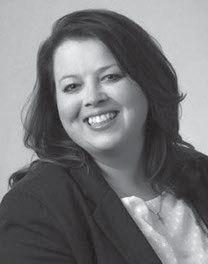


We all receive a “backpack”
when we’re born. We and others stuff it full of ideas as we grow. But, when to sort out what’s still useful in our overloaded packs?
BY TONY FORD CEO Success Fort Worth
Quick, how much do you really know about yourself? Sounds like a stupid question, right? But did you know that we often choose ignorance over understanding when it comes to our own motivations and actions?
It’s true, and it robs us of opportunities on a daily basis. So much so that some have chosen death over living an uninformed, ignorant life — take the Greek philosopher Socrates when he said, “The unexamined life is not worth living.”
So why then, as leaders and professionals, are we sometimes so complacent when it comes to gaining a full understanding of every situation that impacts us and our people? One possible answer is that we are unaware of exactly what’s happening in our own personal and professional space.
The issue is not whether or not we are ignorant, but rather how and when we choose to remain ignorant about things that really matter. Here’s how we can turn this into positive actions:
The “Backpack Principle”
1. On a personal level, it is critical to understand how our past has shaped our awareness and understanding of the present. I call it the Backpack Principle. Simply put, when we are born, we receive a small “backpack,” a place where our life experiences start to accumulate.
As we grow, the backpack grows with us. Our parents, teachers,
coaches, friends, enemies, and even strangers place their ideas and opinions of us into our packs. We also stuff the pack with our own experiences, opinions and beliefs. A lot of this is of limited-time use or simply negative. Either way, it all goes in there, and the pack gets bigger and heavier. Eventually, we stop growing. But our backpack doesn’t, mainly because other people are still stuffing it full. In time, the ever-increasing size and weight of the pack overwhelms our ability to carry it around, as we remain ignorant of the fact that:
• We have a pack filled with other people’s expectations and our own “self-limiting” beliefs.
• We are not built to carry that weight from our past.
• As adults, we get to choose what goes into our pack.
• That effective, enjoyable living is a function of pursuing life with purpose, not useless baggage.
• We need room in our packs for the people and things important to us now and in the future.
• We are wasting time and opportunity by not stopping and sorting out our packs.
2. On a professional level, the Backpack Principle not only applies, but also becomes even more impactful as it holds tremendous power over our leadership abilities. As we move through our leadership careers, we receive ever-increasing training, experience and responsibility. Ultimately, it
all ends up in our backpack. So, what can happen when our professional “gear” starts competing for space in our pack with our personal “gear”?
• Professional priorities crowd out personal desires and make us resentful and unbalanced.
• Over time, family, friends and other personal relationships become weak and ultimately collapse.
• Our enjoyment of life diminishes to the point where we don’t understand what we are really trying to accomplish.
• The promise that professional achievement held in the past is no longer a motivator.
• The allure of money, social status and success displaces the importance of serving others.
• We become someone we never intended to be.
In short, our professional gear crowds out our personal gear and leaves us with a pack full of content not useful for a successful journey into the future. It’s time to look for a guide to help us empty it, examine each piece and retain what serves us.
Fortunately, Fort Worth has a variety of well-trained coaches who specialize in working with folks who want to become subject experts on their own lives. If this sounds like you, I invite you to contact me (tford@successfortworth.com), and I will put you in touch with one or more of these professional coaches.
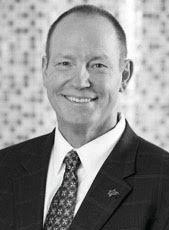
Ford is an award-winning entrepreneur with a history of starting and growing industryleading companies. As CEO of Success Fort Worth, he now helps other businesses grow and sell their companies. He writes this

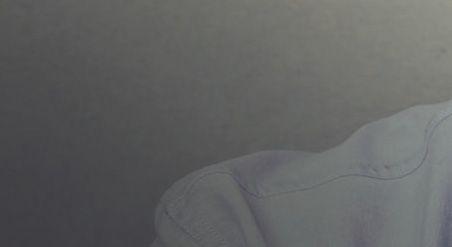







From 6:07 a.m. wake-up alarm – yes, 6:07 – to meeting with event promoters, Matt Homan, GM of Dickies Arena under construction in Fort Worth and set to open next year, is on the run.
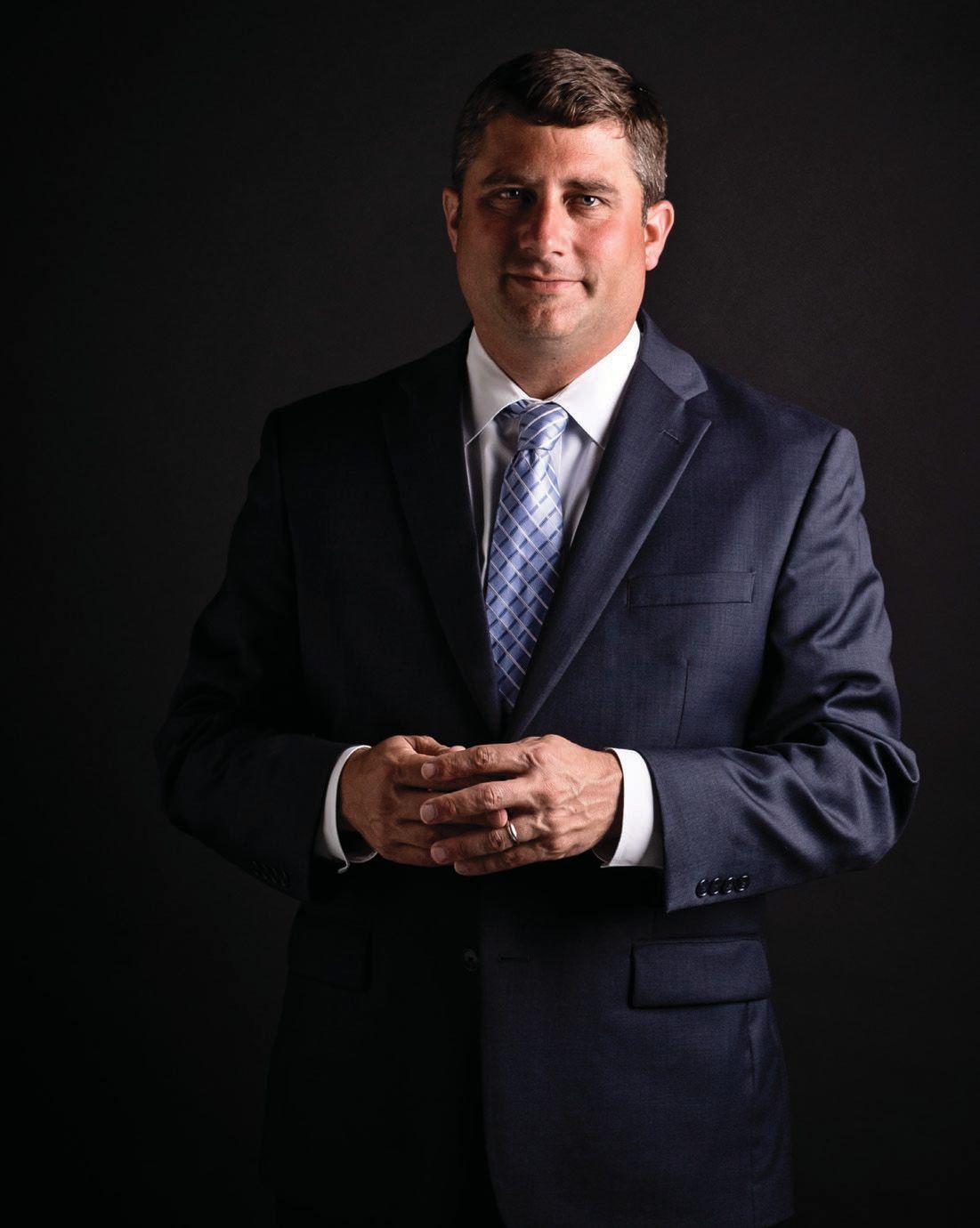
6:07 a.m. Alarm goes off – 6 is way too early, so 6:07 is my start time! The sixth member of the family, Poppy, eagerly knows it is time for our run. This is when I clear my head and prioritize my day.
7:05 a.m. Back from my run. Greet my wife, Paige, and three children, Caroline, Jack and Harrison, at breakfast and discuss their school day and after-school activities.
7:45 a.m. Out the
door to drop the kids off at school. This is the most important and best part of my day. The kids and I talk, listen or sing music and joke with each other. My next stop is at Starbucks for a venti cold brew.
8:05 a.m. First call of the day almost always goes to my first key hire, Bill Shaw, director of operations. He and I may have already texted about hot items. I catch up with him on what’s upcoming, what
rodeo performances at Dickies Arena, sponsorship packages, premium seating or concerts and family shows, we see the same vision.
8:30 a.m. I start at the Sundance Square office, trying to get caught up on what happened overnight in the industry. Sports Business Journal, Pollstar, Billboard, Venues Today and Amplify are important reads to make sure we’re staying on top.
potential venue partners and future premium seat holders at the Preview Center, which offers a full mock-up of our suite, rodeo box and loge box products. What a fantastic sales tool to have, especially with the beautiful view of downtown Fort Worth.
needs attention and how construction is progressing.
8:20 a.m. A call with Brad Barnes, president of the FWSSR. When I moved here three years ago and told people what I would be doing, the response was, “Oh, you are going to run the Stock Show’s new arena.” I would think to myself, just wait and see what we bring to Fort Worth! Brad has been an incredible partner –whether we discuss the
10 a.m. Spend at least an hour a day connecting with promoters –relationships are so important in our industry, and I want them to understand the opportunities available in Fort Worth. I want them to understand this great city. We know Fort Worth and Dallas are completely different markets, and that continues to be part of the education process with agents, artists and promoters.
12:15 p.m.
Generally, I have a work lunch before going out to the Dickies Arena Preview Center or construction trailer. I try to eat healthy; but I am a foodie at heart, and I love the restaurants. This is where I get ideas for my F&B Director, Julie Margolin.
1 p.m. Meet with
3:30 p.m. Marketing hour. Meet with my creative team, led by Alissa Cunningham, my director of marketing. These are the people who make our concepts happen as we continue to progress; it’s important to look at the venue from our future guests’ perspectives. We want them to have a firstclass experience.
5:30 p.m. Depending on the day, I’ll leave work and go straight to one of my kids’ hockey, soccer or field hockey games or practices. Being able to see them participate in all of their events is a great way to unwind for me.
7:30 p.m. While the kids continue homework, I start reviewing financials.
Nicole Epps, my director of finance, is always online and answering questions I may have. I have an amazing team of directors, and each one of us feels Dickies Arena is an opportunity to create something special for Fort Worth.
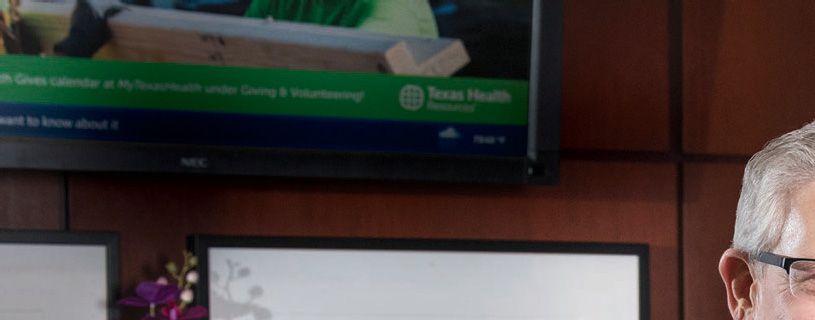
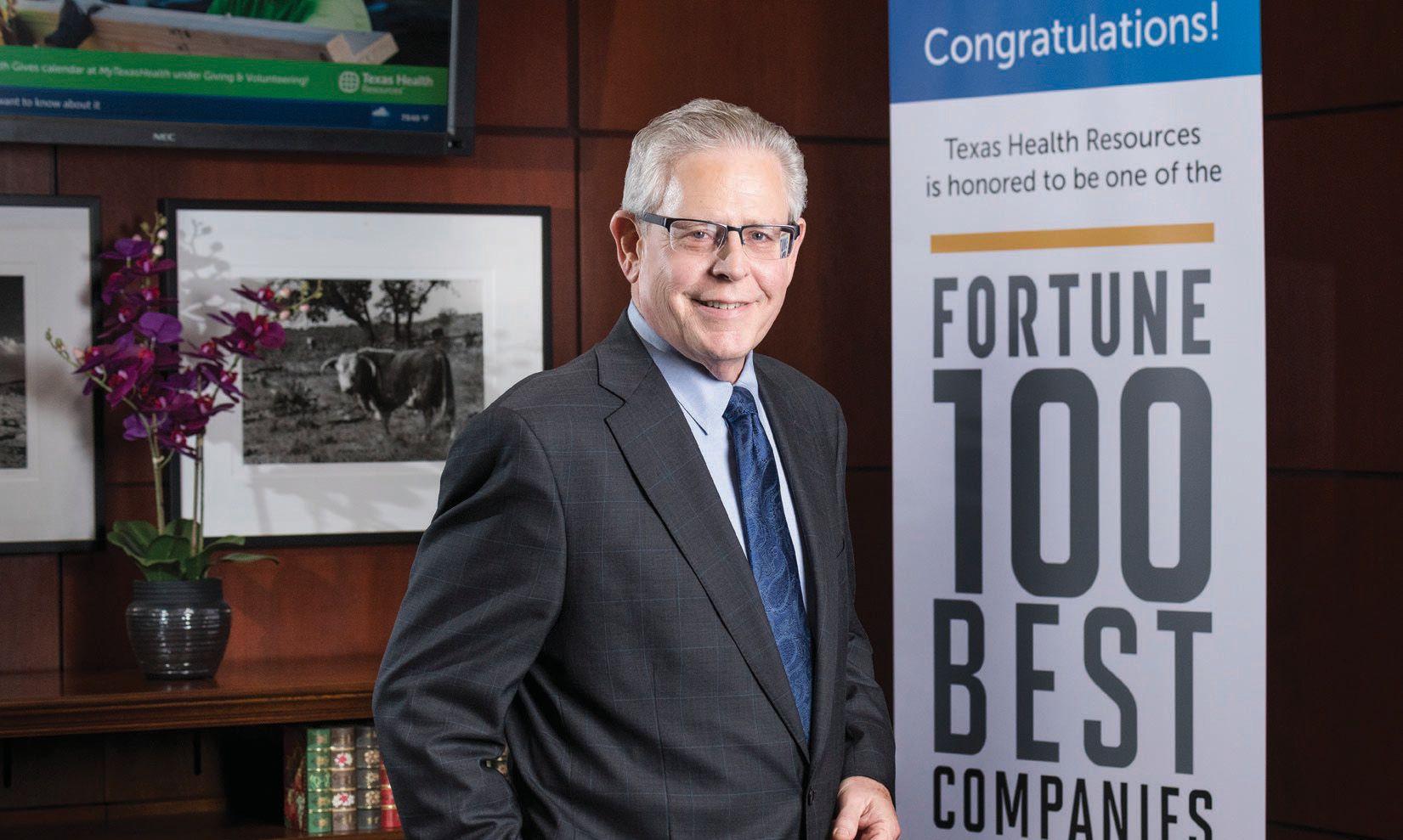
Barclay Berdan CEO, Texas Health Resources

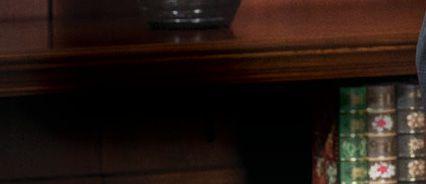








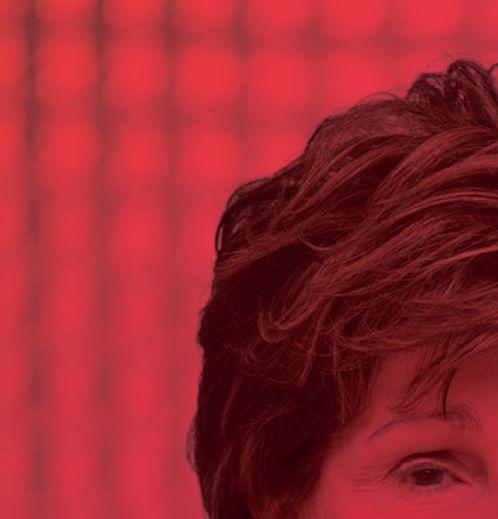



CEO on KERA invites you to the table as renowned journalist Lee Cullum interviews prominent chief executives from North Texas and beyond. Go to explore leadership styles and ethics. Go for insight into what makes companies successful. Go for the engaging conversation. Go Public.
HOSTED BY LEE
CULLUM
FULL SCHEDULE AT KERA.ORG/CEO


